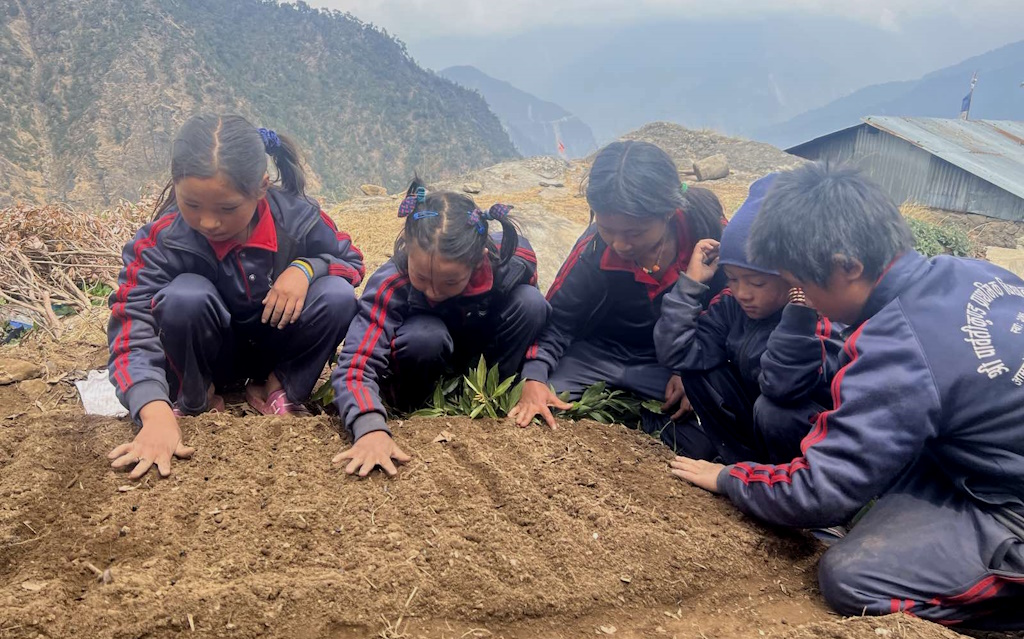Project Haku
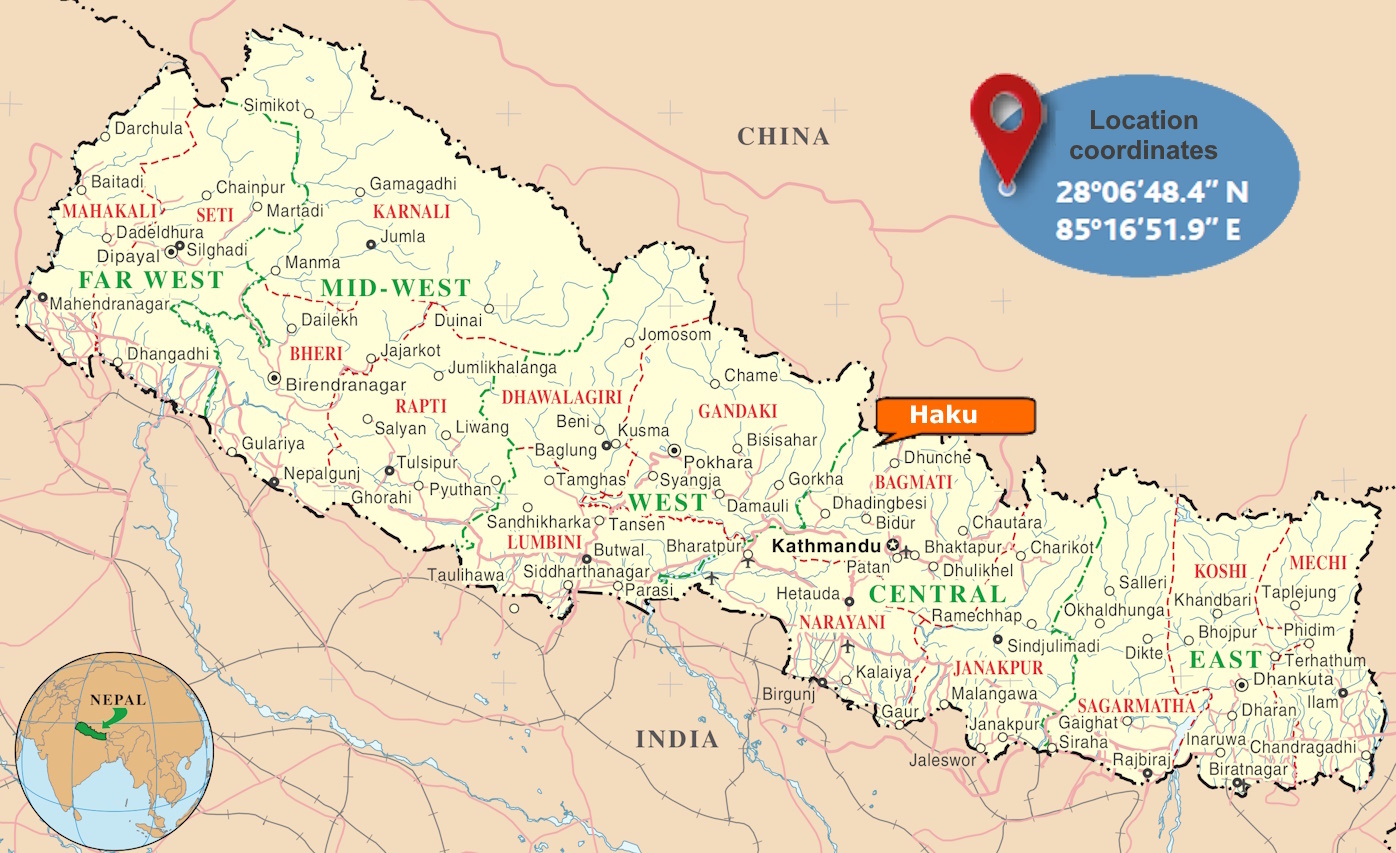

The six schools of Haku
May 2025
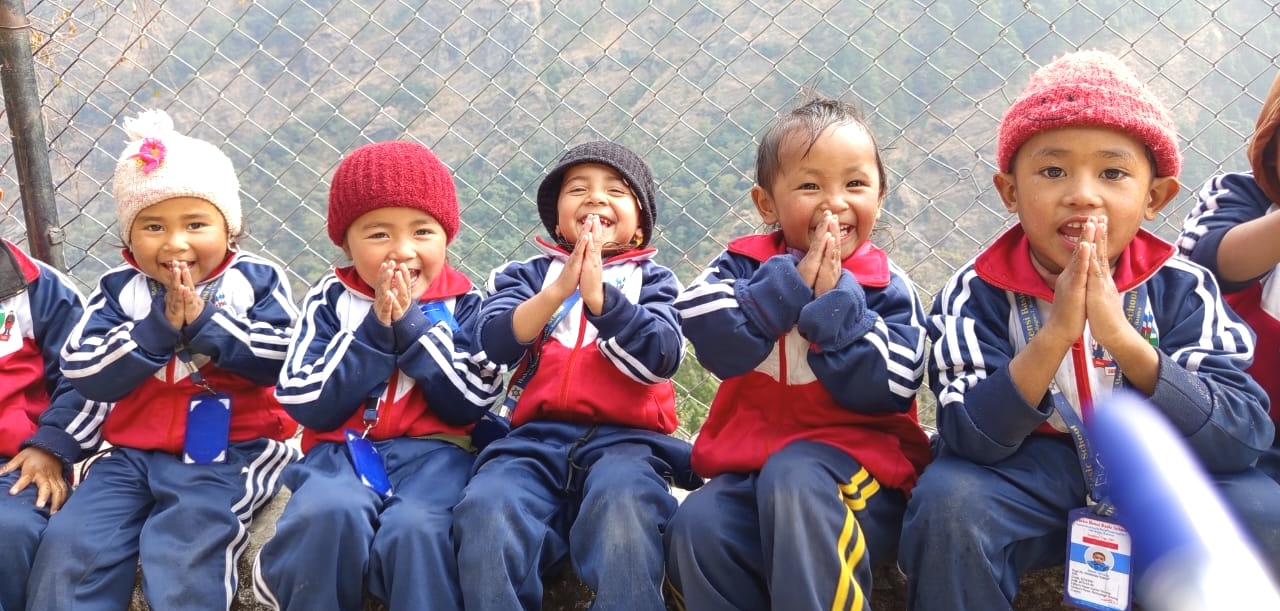
This year, there will no longer be five but six schools in as many villages that BIKAS will support together with our local partner CEPP – the Centre for Educational Policies and Practices. In addition to Haku Besi, Pangling (= Sanu Haku), Thulo Haku, Nesing and Grey, Gatlang is now also involved in the project.
This expansion is a logical consequence of the request of the Gatlang school community.
This beautiful Tamang village is still a bit further away from Grey.
CEPP employees will also visit this community from now on.
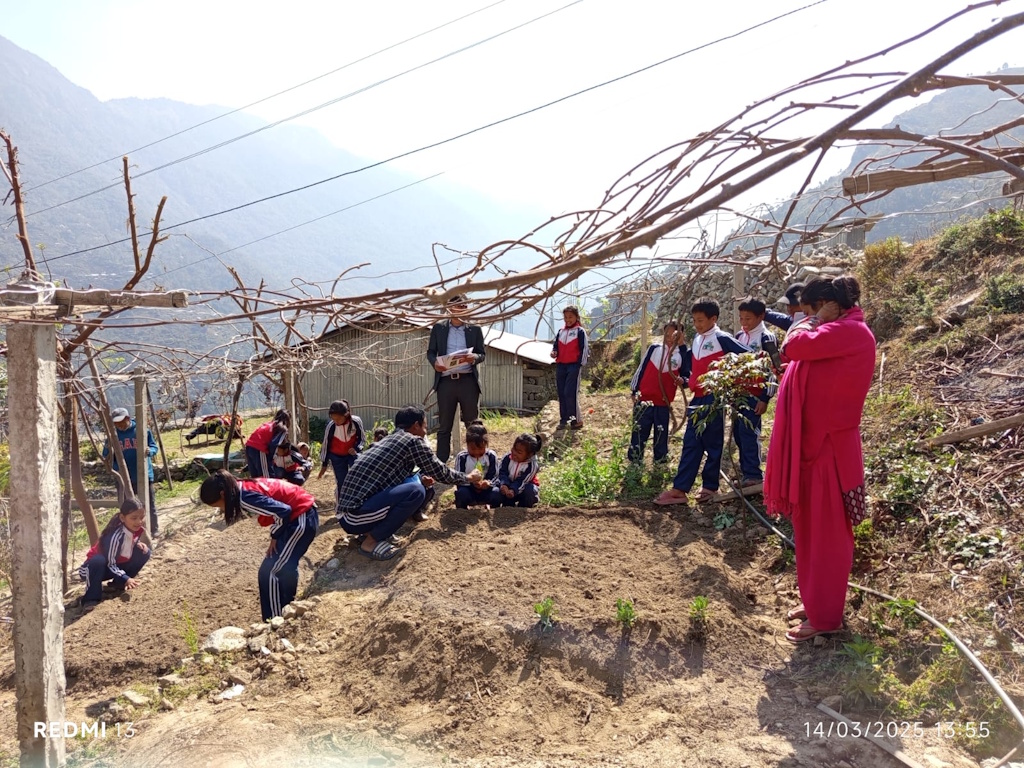
A few years ago, I passed Gatlang during a trek and saw quite a few houses with beautiful slate roofs that were later replaced by unattractive corrugated iron.
The head of the community school had gone to the neighbouring villages to investigate and was extremely interested in joining the Haku school project as soon as possible.
Here too, a vegetable garden will be set up at the school and a couple of volunteers will be sought who will focus on teaching the cultivation of new crops. They will in turn pass on their knowledge to the villagers.
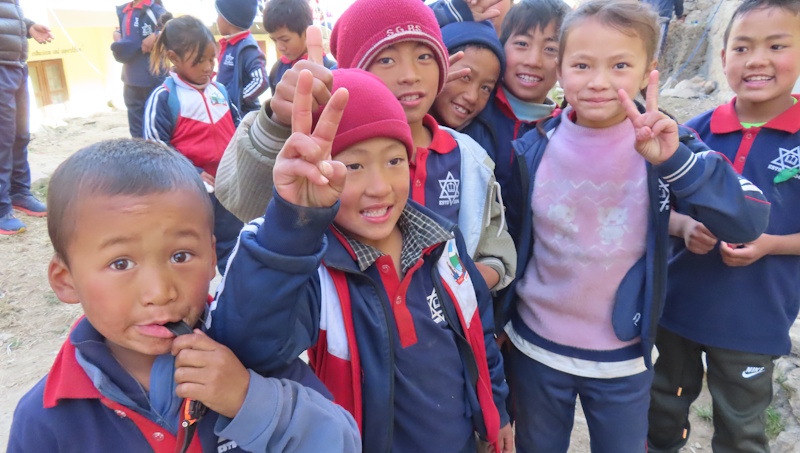
Rishi and Arjun, the two CEPP managers for the agricultural part, will also teach here which crops grow best and how to proceed.
In the long term, Gatlang will also grow fruit trees, kiwis and papayas as well as all kinds of vegetables and herbs that thrive here.
In their school vegetable garden, the pupils will learn the processes of sowing, planting, weeding and maintaining until they can harvest the new types of vegetables and fruits themselves.
The villagers want to get their hands dirty and start growing as soon as possible.
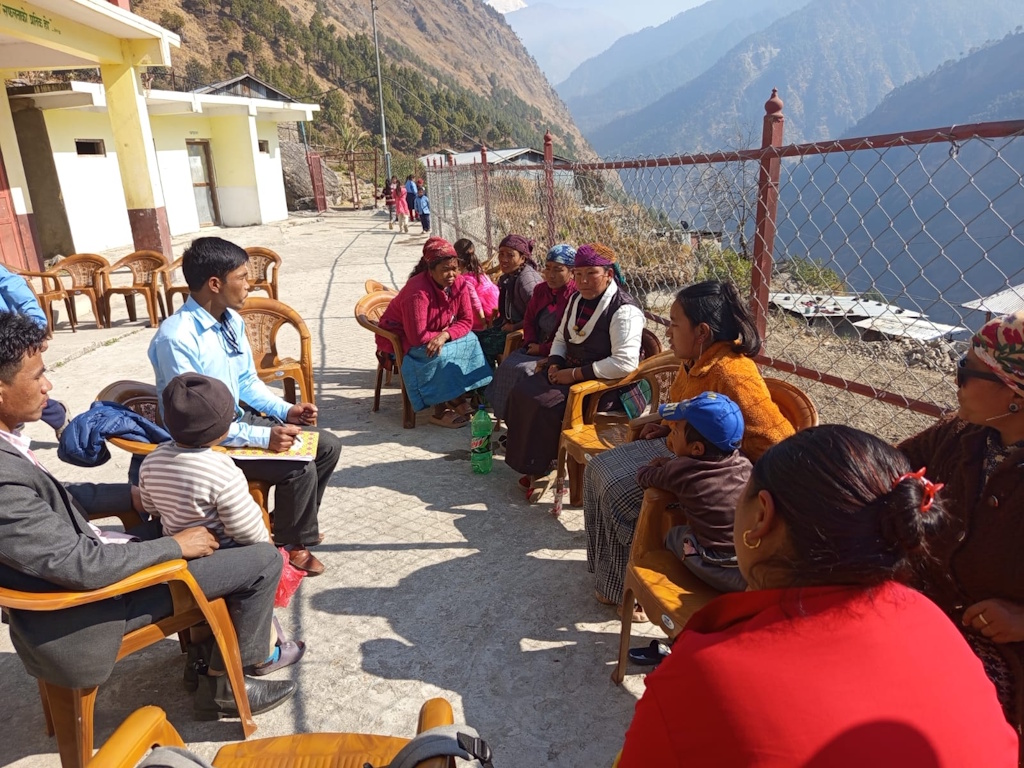
Shortly after I visited the schools in Haku in December, Biraj was offered a high position in the provincial government and gave up his job as coordinator. It was a great pity to see him leave, as he had settled in well and had done a lot of work in a short time. There was clearly good cooperation with the teachers, parents and pupils of the various villages. CEPP had gone through a difficult road to find a suitable coordinator, who now left after only a few months.
But fortunately, this time the succession went much faster. Dev Rana, who had worked for CEPP for years, mainly in the lower and warm regions of the Terai, wanted nothing more than to move to the cooler mountains.
His motivation to work in remote areas with mainly Tamang communities was very high. He turned out to be a suitable successor who happily moved to Haku just a week after his predecessor had left the project.
A great advantage is his knowledge of the local Tamang language. He can also fall back on his years of experience and it was therefore clear that he knew how to work here from the start. Dev Rana happily committed himself for the next few years to work in this mountainous landscape in the Langtang region.
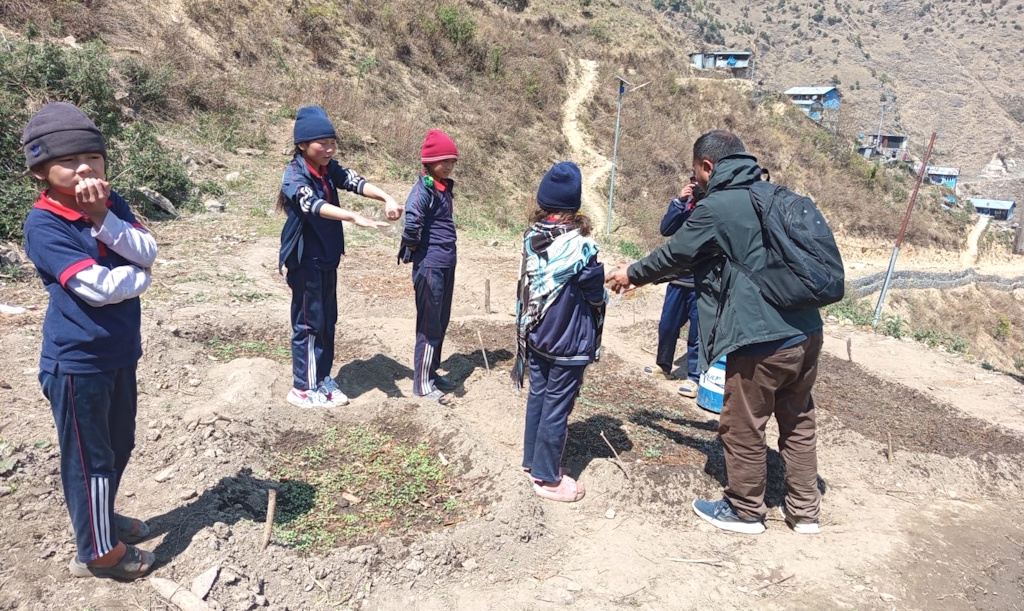
Within the same month of his arrival, he was the one who started sending me weekly messages. It was clear that he had quickly found his feet and had thrown himself into his new work with great enthusiasm.
Every week I receive an overview of what has been done, with the necessary photos.
In this way, the mother groups were brought together and the subject of private schools and local community schools was broached.
Many parents are inclined to send their children to remote private schools, because these are considered more prestigious. The children are then taken away from their familiar environment for many months, sometimes years. Often they do not return to their village of origin. In addition, it costs the parents a lot of money.
During the conversations with the mothers, the importance of the village school was emphasized: close by, accessible and involved in the local culture. It was an opportunity to emphasize the advantages of the village school as a bridge to local development, where children are not only supported educationally, but also learn about their own community and their natural environment.

Let me list the activities that Dev Rana, sometimes with the help of Dhan, Rishi and Arjun, has done in the past months. It has become an impressive list:
Grains were sown in seed trays in the office of Pangling.
The couples were shown how to do this and were advised to collect local seeds to build their own nursery.
New couples were selected for the vegetable gardens.
The pupils were taught in the vegetable gardens of the schools.
They visited the families at home and offered help with the children's homework.
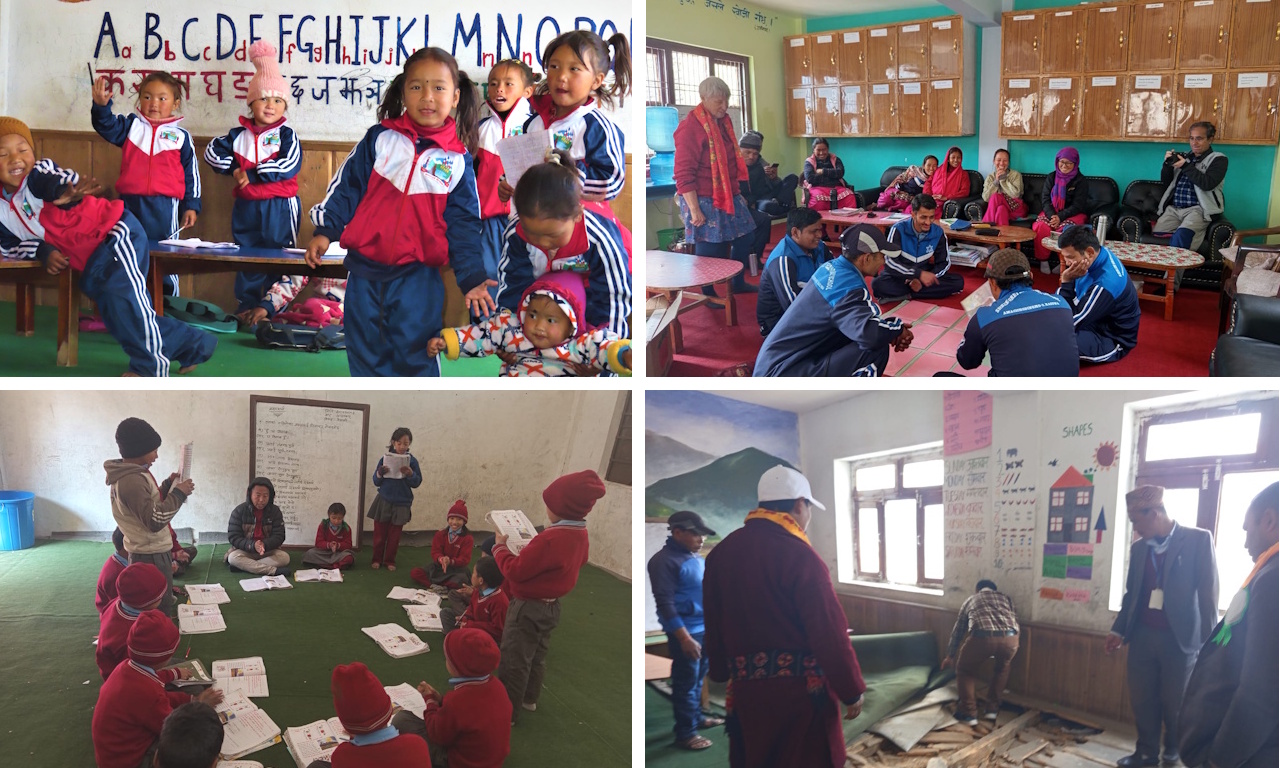
In the school of Thulo Haku, the repairs to the classroom and the delivery of a new classroom were discussed. Later, discussions were held with the School Management Community to agree on when to start the renovation works of the classrooms.
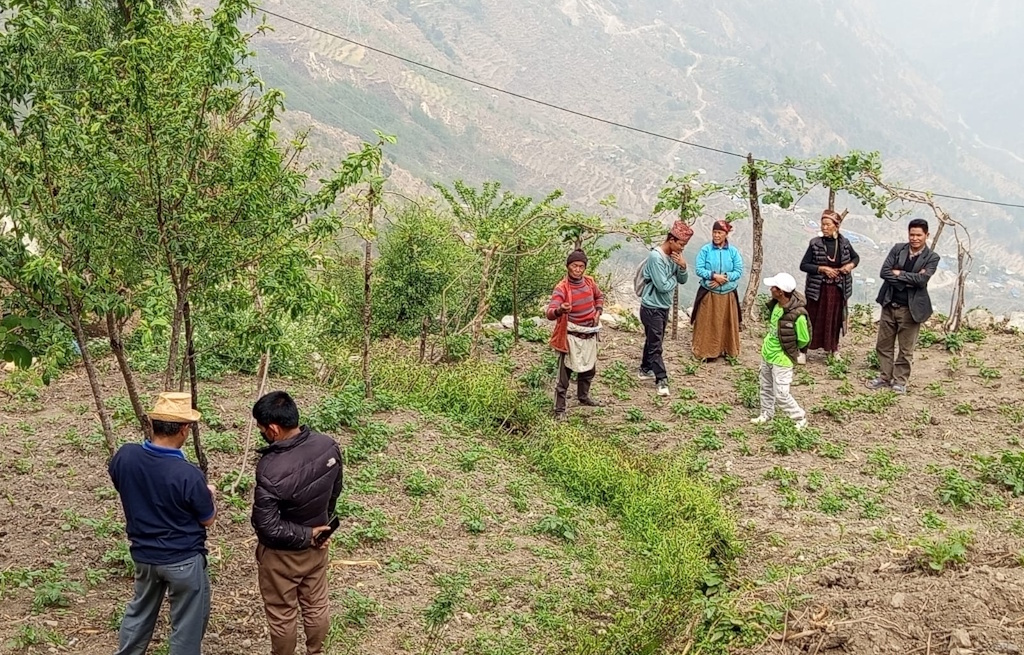
In the meantime, the final exams have been completed and the new school year has begun.
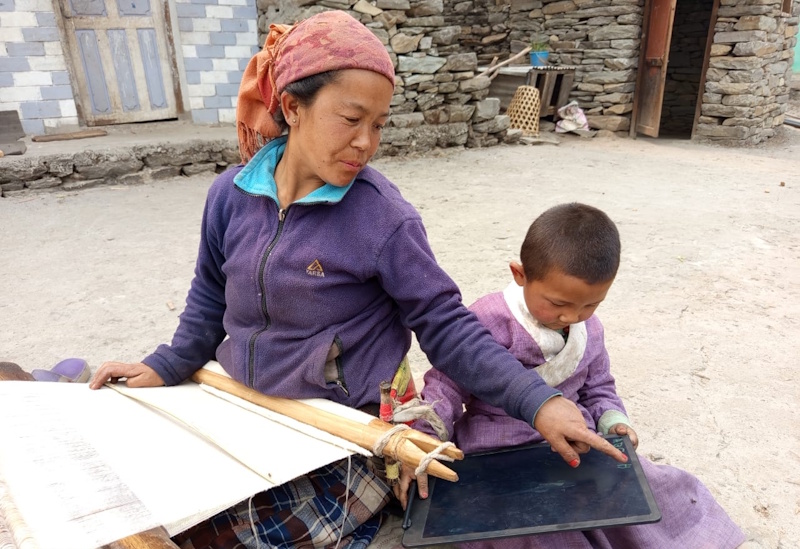
The doors of the schools were supposed to open again the week after the Nepalese New Year – it is now 2082. However, due to a general strike by teachers throughout Nepal, the first day of school of this new school year is still pending.

In Haku Besi, the hostel is also reopening.
The headmaster had been asking BIKAS for some time to help furnish the boarding school. In January, the funds were transferred to the school community and new beds with matching mattresses, pillows and blankets were purchased and installed.
Finally, the young children no longer have to sleep on thin mattresses on the cold floor, but can now spend the night in decent beds.
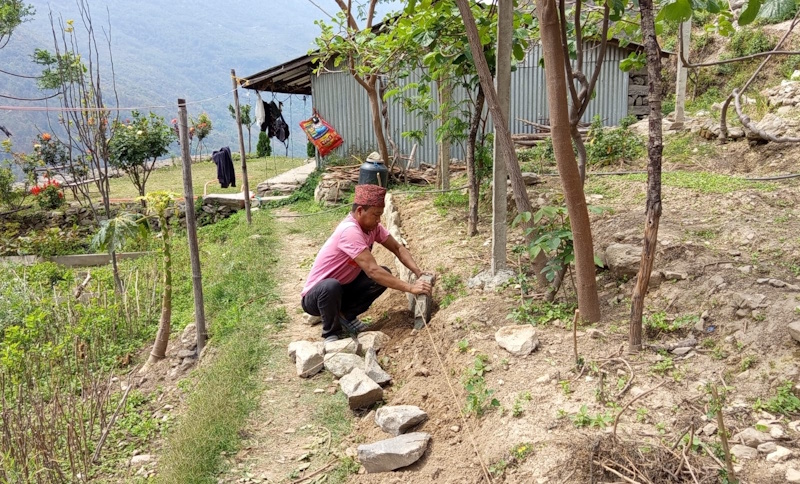
Changes are gradually coming to the Haku villages of Rasuwa. Some innovations can be seen immediately, others are a long-term process but have a more profound effect and will remain etched in the memories of the children, teachers and parents forever.
Dev Rana, the new coordinator and his colleagues continue to work diligently and thank us for so much support from here.
If you have a warm heart for this project and would like to support it, you can do so on the BIKAS account number BE32 2200 7878 0002 with the message ‘HAKU’
Betty Moureaux, chairwoman of npo BIKAS

Keep smiling!

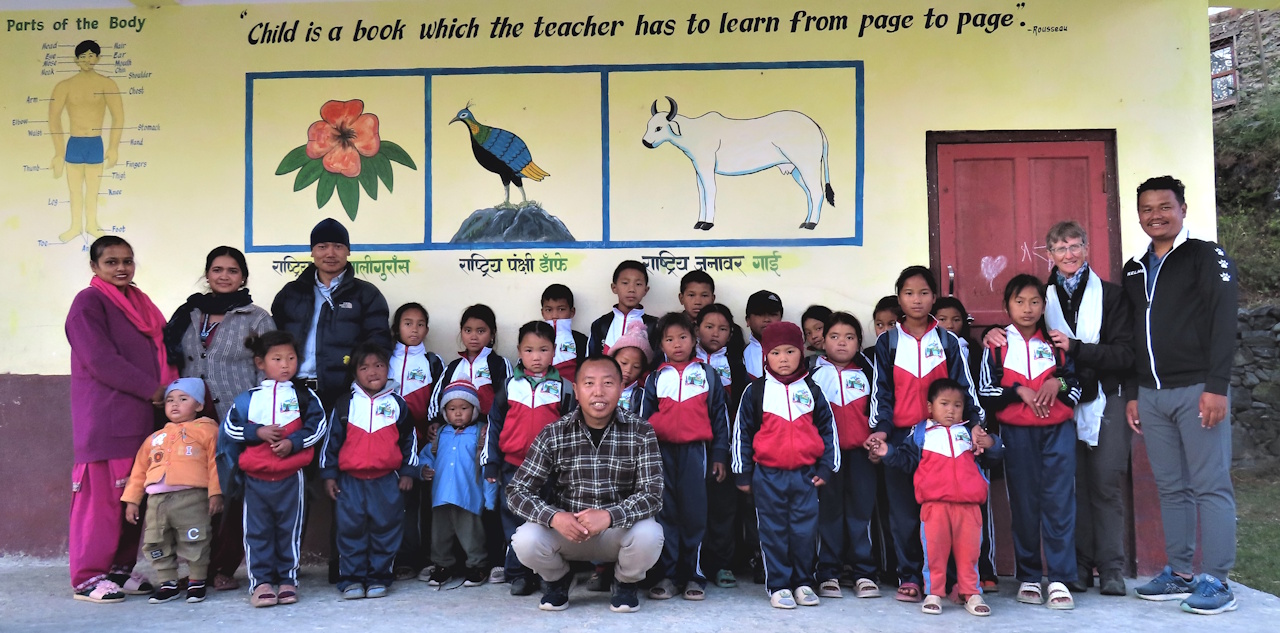
March 2025
I returned to the Haku villages in early December.
As I only had three days, I decided to take a moped taxi. This meant that I hired a motorbike and sat on the back as a passenger.
Together with Binod, who comes from Thulo Haku and now lives in Kathmandu, I started the long drive to Rasuwa early in the morning.
I had already met Binod a few years earlier when he had been on a trek with me. I had also known his father, Maila, for many years from the many adventurous treks that we had undertaken together. This gave me a somewhat more reassuring feeling at the prospect of a hopefully safe ride.
As is mandatory in Nepal, Binod, the driver, wore a helmet. The passenger, me in this case, is not required to wear one. After a fruitless search to find a small helmet for me, there was nothing else to do but to start the ride with just a hat on my head. The thick hat would certainly not protect me from a fall, but it would protect me from the cold. By public transport I would be on the road all day, but now I reached Haku Besi after only five hours. How relieved I was when I saw the village.
The road, which ran along the Trisuli river, was in very bad condition. For Binod it was a huge challenge to keep his moped straight. For me it was a balancing act not to fall off. Binod was able to avoid most of the holes and stones well, but sometimes we were unlucky and then I felt the impact down to the smallest muscles of my body.
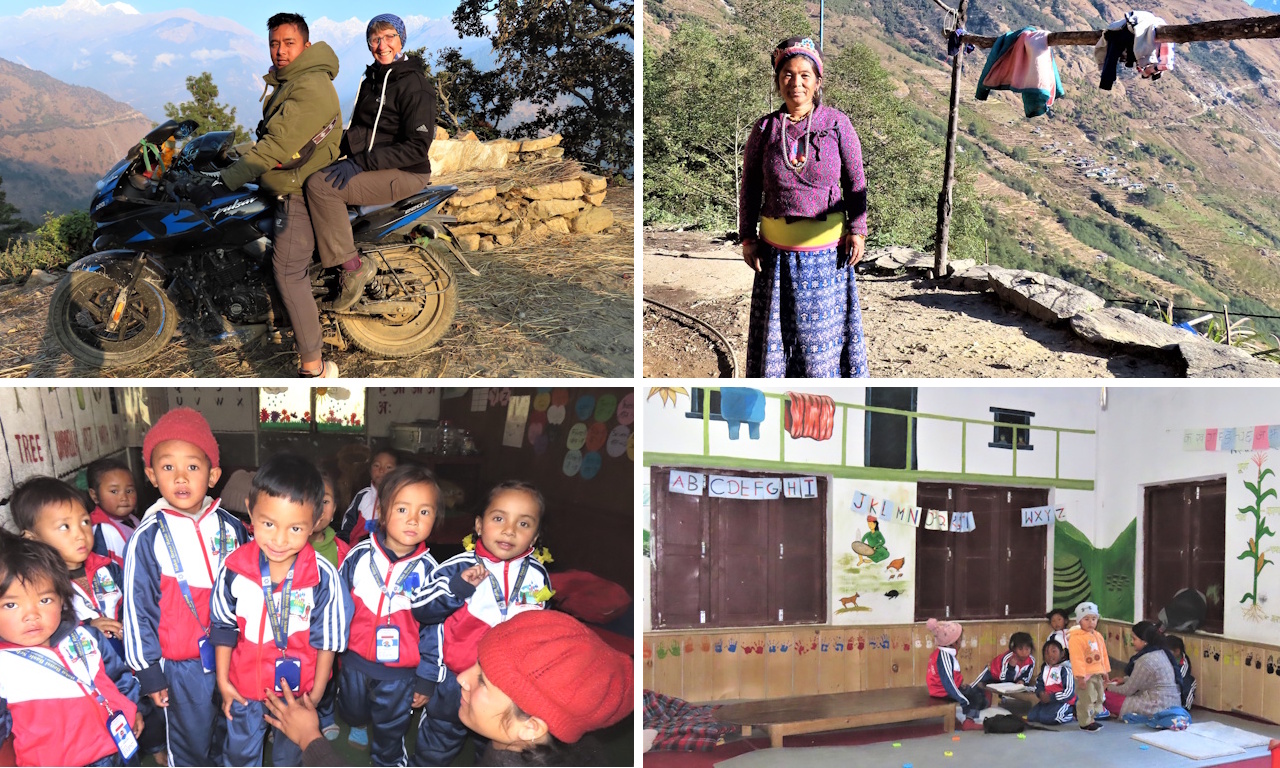
In Haku Besi I was welcomed by Karbo Tamang, the headmaster. We first visited the hostel. It is a sturdy building but the furnishings still leave much to be desired.
Soon, with the support of BIKAS, beds, mattresses and blankets will be purchased. This will allow the students, who regularly stay there at the boarding school, to spend the night in a more pleasant way. Afterwards we drove on to the school of Haku Besi. Here Binaj and Dhan, two employees of the local NGO CEPP - Centrum for Educational Policy and Practices - were waiting for me. We had a meeting with the teachers and with some women of the school board.
They were all happy to see me again after a year and they proudly showed their classes. The students, who were having lessons at that moment, spontaneously jumped up to welcome me.
One of the classes had been given a new ceiling with the help of CEPP. This classroom had become much warmer and more pleasant.
The headmaster and the CEPP employees happily showed me the vegetable garden of the school. We picked the few kiwis that were still hanging there and ate them with great relish.
The headmaster said that he had never seen kiwis before, let alone eaten them. Now that these fruits were growing in his own village, he had become crazy about this delicious fruit.
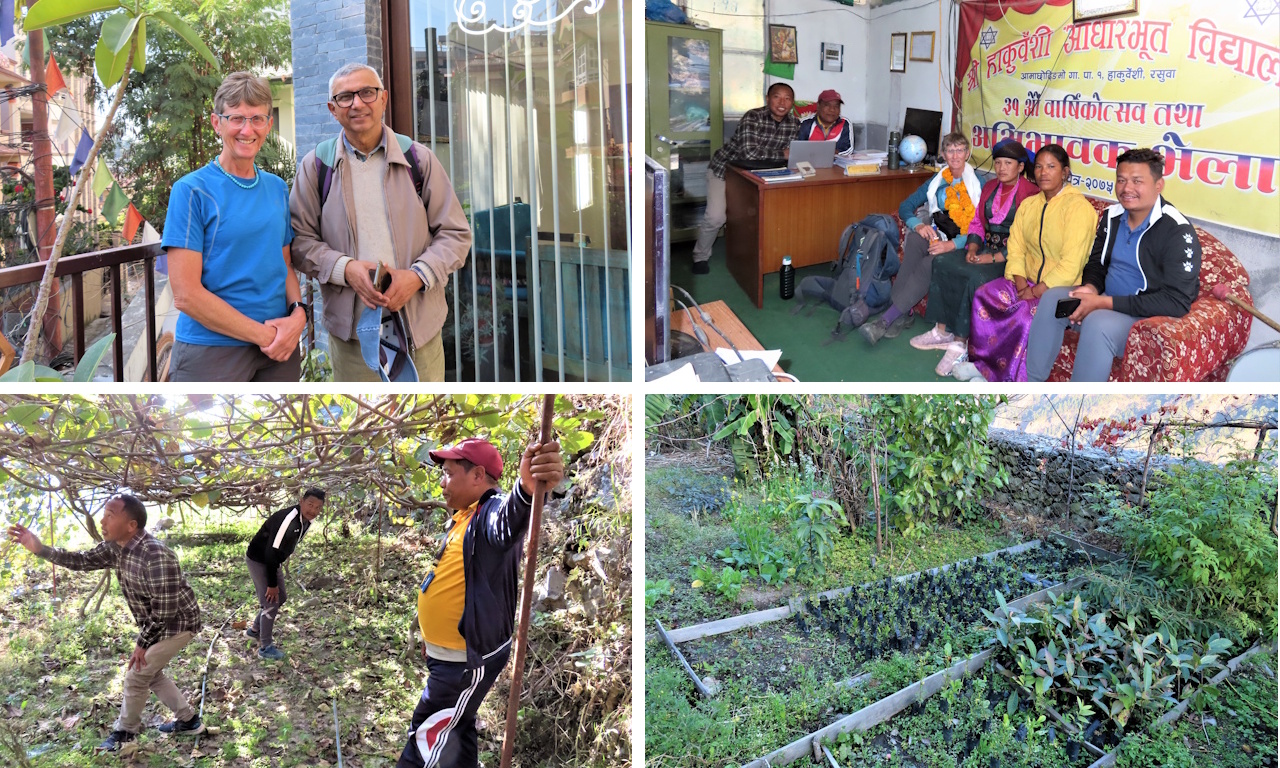
Just before the end of the school day we reached the school of Pangling. This small school has very dedicated teachers and therefore functions well. Here too I saw that the students were working diligently. As soon as the school bell rang, the children ran home down the mountain as quickly as possible.
I was given a tour of the large vegetable garden, which was also used as a test field.
In a few years’ time a garden of Eden had developed here, although it was now in winter mode.
Together with Binaj, the local CEPP coordinator for the Haku schools and with Dhan, the person responsible for the educational part, I moved into the office house of CEPP.
A few people came to have a nice cup of tea with us, while Dhan prepared dinner. He refused all help and so he single-handedly provided a delicious meal with all fresh vegetables from their own vegetable garden.
Once the sun had set, the temperature dropped considerably. We chatted for a while but I soon went to bed. With a lot of clothes on and under a few thin blankets I went into a chilly night.
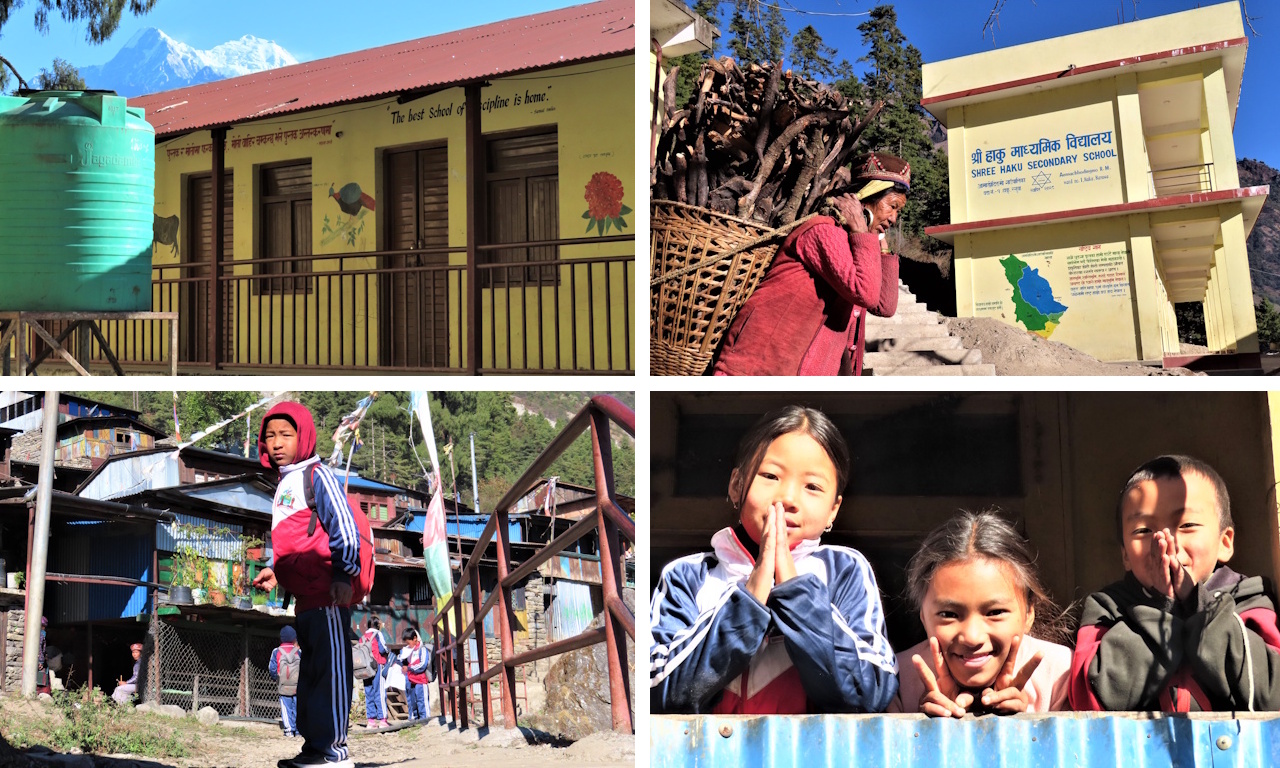
After drinking a hot cup of tea we packed our things and drove to Thulo Haku on our mopeds. For the first time in the more than twenty years that I have been coming here, I did not walk up but used a means of transport. It was certainly not comfortable. You can't call this a road, it is more of a footpath with many holes and stones. The only advantage was that it went faster.
Binod, my driver, was happy to be in his native village. He visited his family and we had our early lunch with one of them. The local vegetables tasted delicious again.
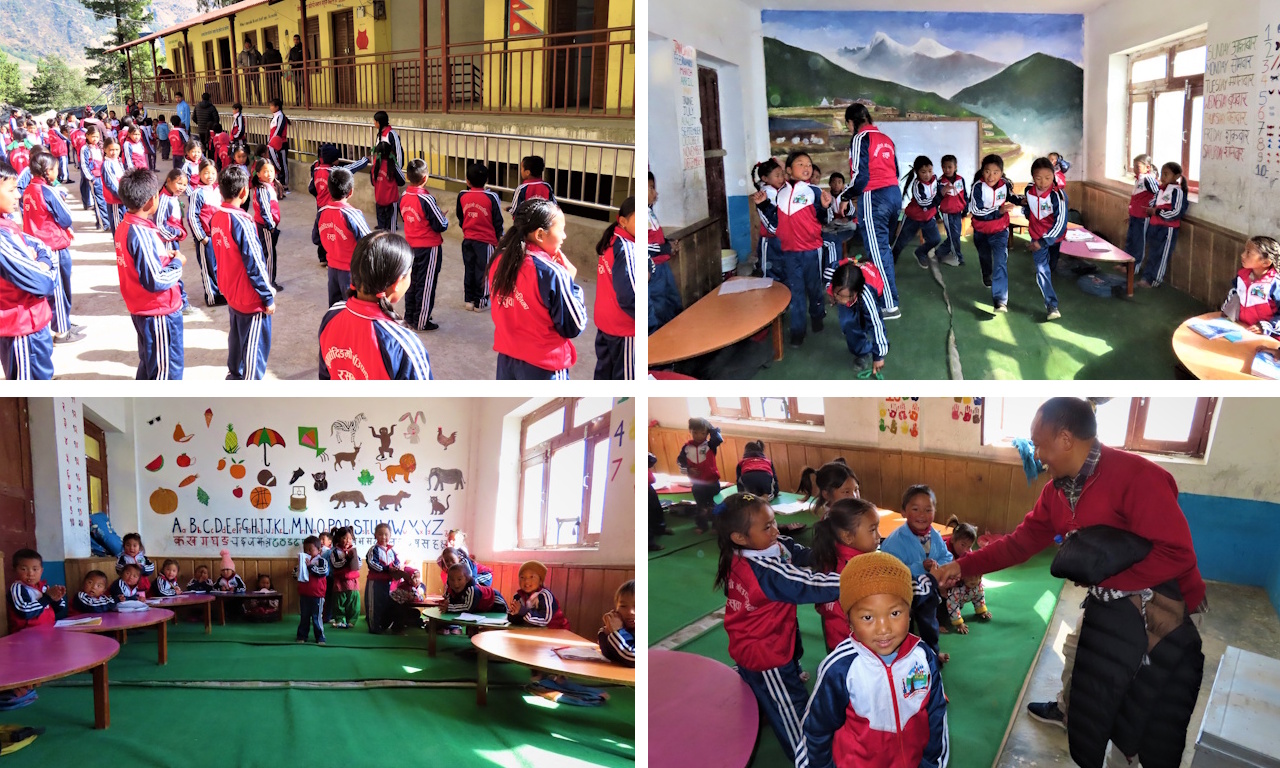
We reached the school just in time to hear and see the children sing the Nepalese national anthem. Suddenly more than 130 pairs of eyes looked in my direction. Some students and teachers recognized me, for others I was new.
After the gymnastics exercises and the calling of the attendees, the students were allowed to go to their classes. Row by row, starting with the smallest ones and continuing to the oldest students, they went to their classroom in the same, almost militaristic rhythm.
I visited every class and especially the little ones thought it was very special to see me. They jumped in front of my lens every time I wanted to take a picture and afterwards they all wanted to see if they were in the picture. Hilarity guaranteed when they recognized themselves.
In the meantime, Dhan tried to teach the children something in a playful way. He seized every moment as an educational moment. It was a pleasure to see this great friend of children in action.
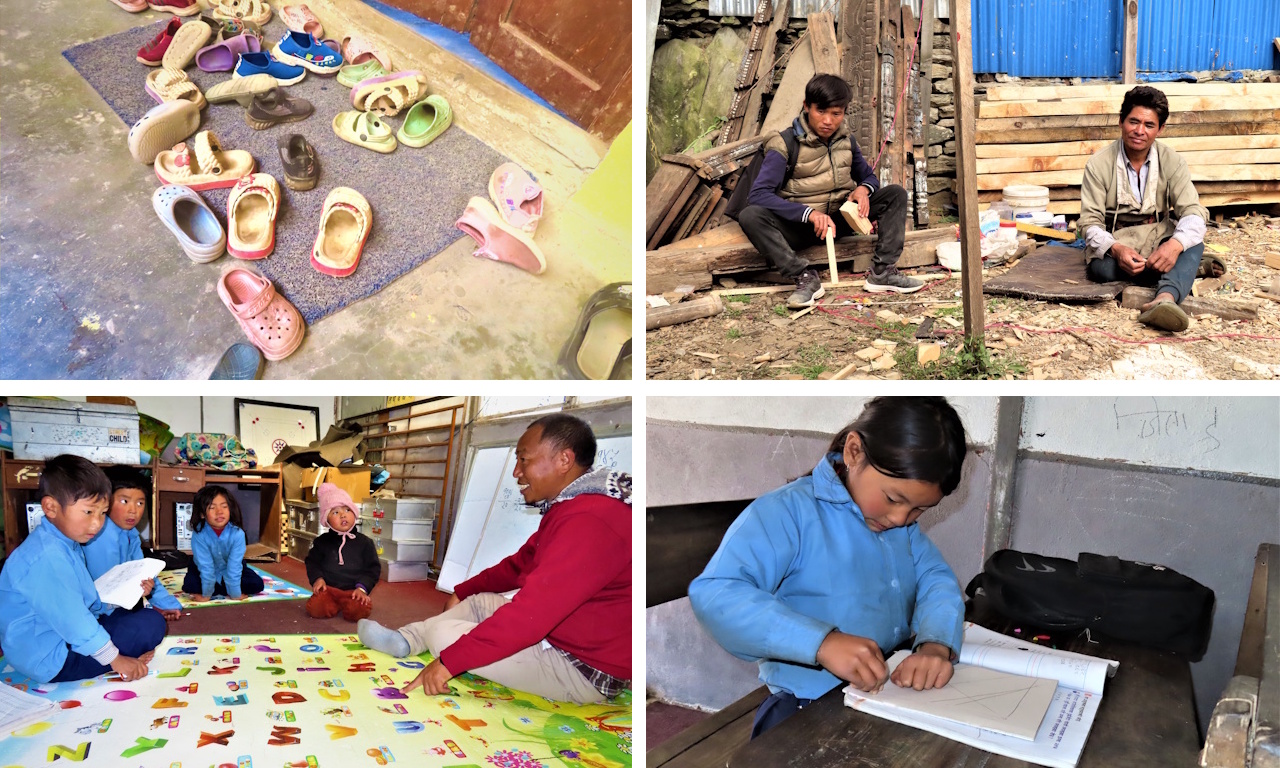
Since the headmaster was not present, his replacement scheduled a meeting. Everyone was allowed to introduce themselves very officially, starting with myself.
To my surprise, I saw that there were several new teachers, even some young people from the region. There is clearly a new wind blowing in this school and it comes from a good direction. The renewal in the teaching staff resulted in more drive and an interest in the collaboration with CEPP. Where it used to be difficult to work with the headmaster, we now see that there are many teachers who are eager to learn and want to innovate. By not involving the headmaster, who is often absent, too much in the collaboration, much more can now be achieved.
Because the road to the next village is still closed for traffic, motorized traffic is forced to take hours of detours to Grey. That is why I walked on to Nesing and Grey together with Dhan and Arjun, the local agricultural worker.
In Nesing I visited Dawa Singi's house as always. After the major earthquake of 2015 I stayed at his house for a while. It is always a pleasant reunion. Unfortunately it was only a short visit. Dawa proudly showed his vegetable garden and apple trees that are doing very well. He is a man with many talents with which he can create so many beautiful things. For example, he showed the beautiful wood carvings he was working on. We agreed to see each other again next year and then I would definitely stay overnight...
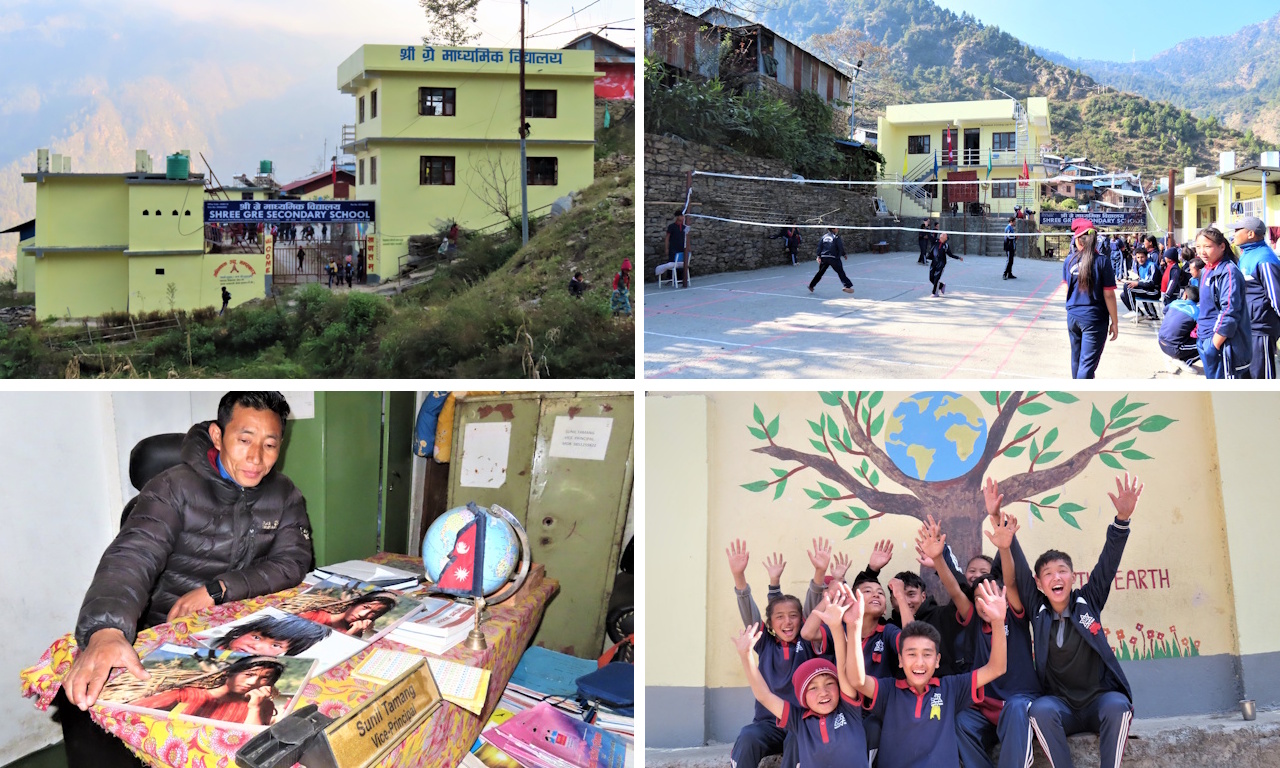
In Grey we visited the large school where a volleyball competition between the different classes was taking place. Despite the free afternoon, all students were present. I saw that several children were playing in their slippers, which did not hinder them in their play at all. It was incredible how they jumped and walked with these loose shoes. In our country, a sprain would have happened quickly, but apparently not here. There are some very good players there who would certainly be welcome in one club or another.
After the competition, there was a very long speech to thank each team. I was also allowed to participate in the award ceremony. In the meantime, the sun had disappeared behind the mountains and the playground was in the shade. While I stood shivering from the cold, the students continued to listen patiently to what the headmaster had to say.
I thought that we could quickly continue afterwards, but that was without taking into account the obligatory consultation with the teachers. One by one, they introduced themselves and we were busy for a while before we could also leave this school.
While the evening sun coloured the mountains beautifully red, we drove to Syabru Besi where we arrived in the dark and moved in with the in-laws of Binod, my driver.
Pork was prepared as a farewell meal. I had agreed to it, but when I got a piece of fat on my plate I regretted it for a long time. Not eating it was not an option and complimenting the delicious meal was also part of it.
Early in the morning I said goodbye to the three CEPP employees. I thanked them warmly for the good work they did in the Haku villages and encouraged them to continue in this way. It is not always easy to work in such remote areas and to get the local population involved in a novel operation. I have a lot of respect for what they achieve in these villages. In turn, they thanked me for the visit, the interest and the support for their work.
I jumped on the back of Binod's moped and started the way back to Kathmandu.
The thin layer of ice on the puddles confirmed my feeling of cold. I was shivering until we finally stopped after two long hours to warm up in the sun. Our hands and legs in particular were stiff with cold.
This time we took the road via Dhunche along the Trisuli river, a route that was considerably better than the outward journey. It was a bit of a shock when we heard that a few days earlier two young people had died on their mopeds along the river. That made me realise how dangerous such a journey can be. But I was still glad that I had been to the Haku villages to show the villagers that we have not forgotten them. But certainly also to show these employees my appreciation for their work. A hellish ride on a moped is only a small effort compared to the great work that the CEPP employees do in these villages.
Keep up the good work people of CEPP! Even if it sometimes doesn't go as smoothly and as quickly as you want, every bit of innovation is progress. Every child will later remember what they learned from you and they will carry this with them for the rest of their lives.
Thank you - dhanyabad.
If you want to contribute to this project, you can do so by supporting the BIKAS account number BE32 2200 7878 0002 with the message 'HAKU'
Betty Moureaux, chairwoman npo BIKAS
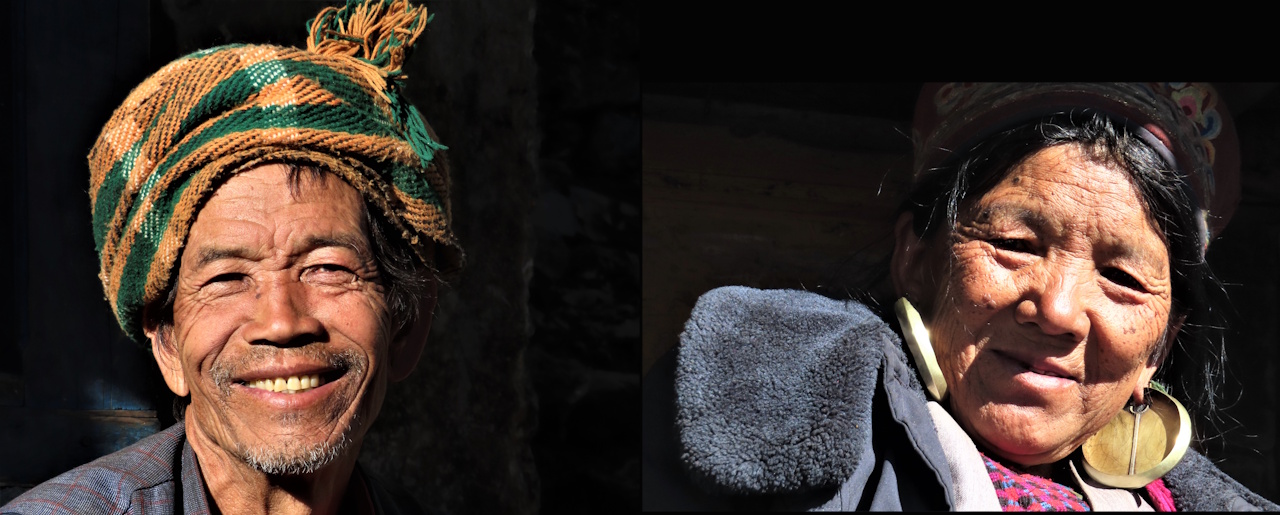

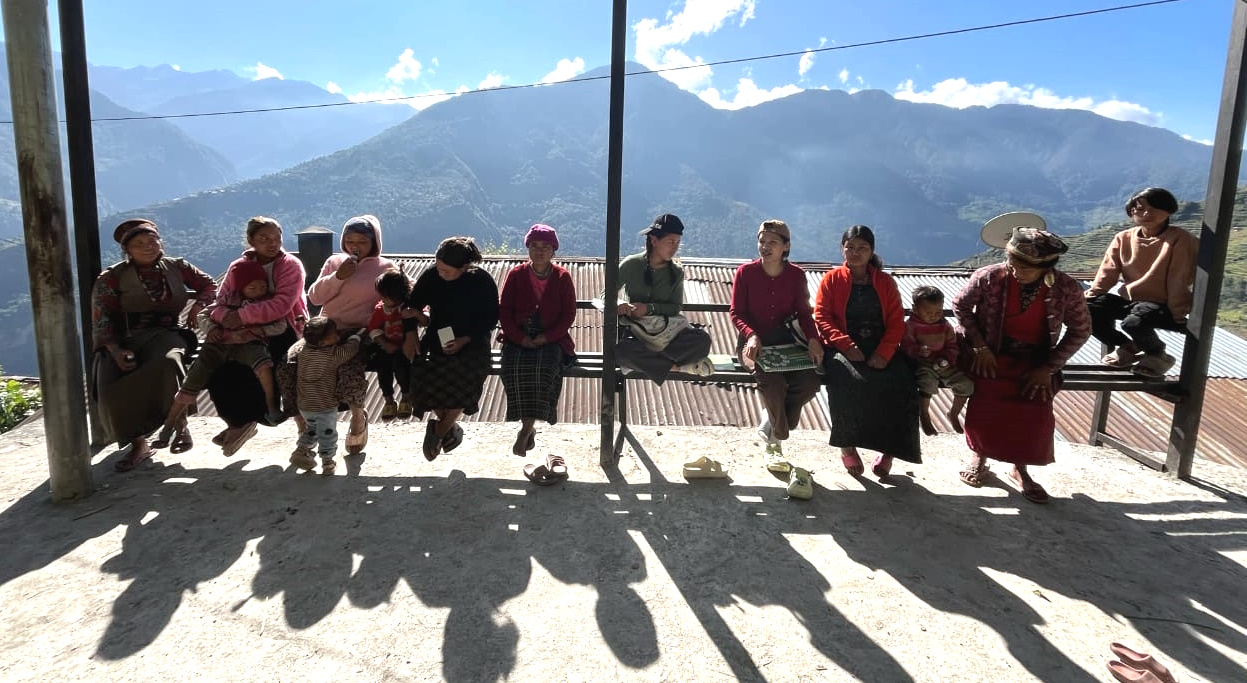
December 2024
Whenever we reported on the Haku schools in our previous magazines, it was clear that in addition to the classical curriculum, strong emphasis was placed on the ‘greening’ of the school environment, more so, this fact was also worked out educationally. The collaboration with CEPP is certainly no stranger to this.
The Haku schools and villages are close to the heart of Betty Moureaux, our BIKAS chairwoman. As she wrote in the previous magazine, she will also be visiting her beloved Haku this autumn. We will surely be able to read an account of her stay there in the next magazine.
The Langtang region was largely spared the calamity brought by the monsoon rains, not counting the annual landslides.
In compiling this magazine, we only had photographs sent to us by Haku communities. They testify to the enthusiasm of the principals, teachers and pupils of the schools, the mutual cooperation with parents, the driving force of the CEPP staff. They also show the results of agriculture and horticulture and the fruits they we can now also literally harvesst after years of intensive care.
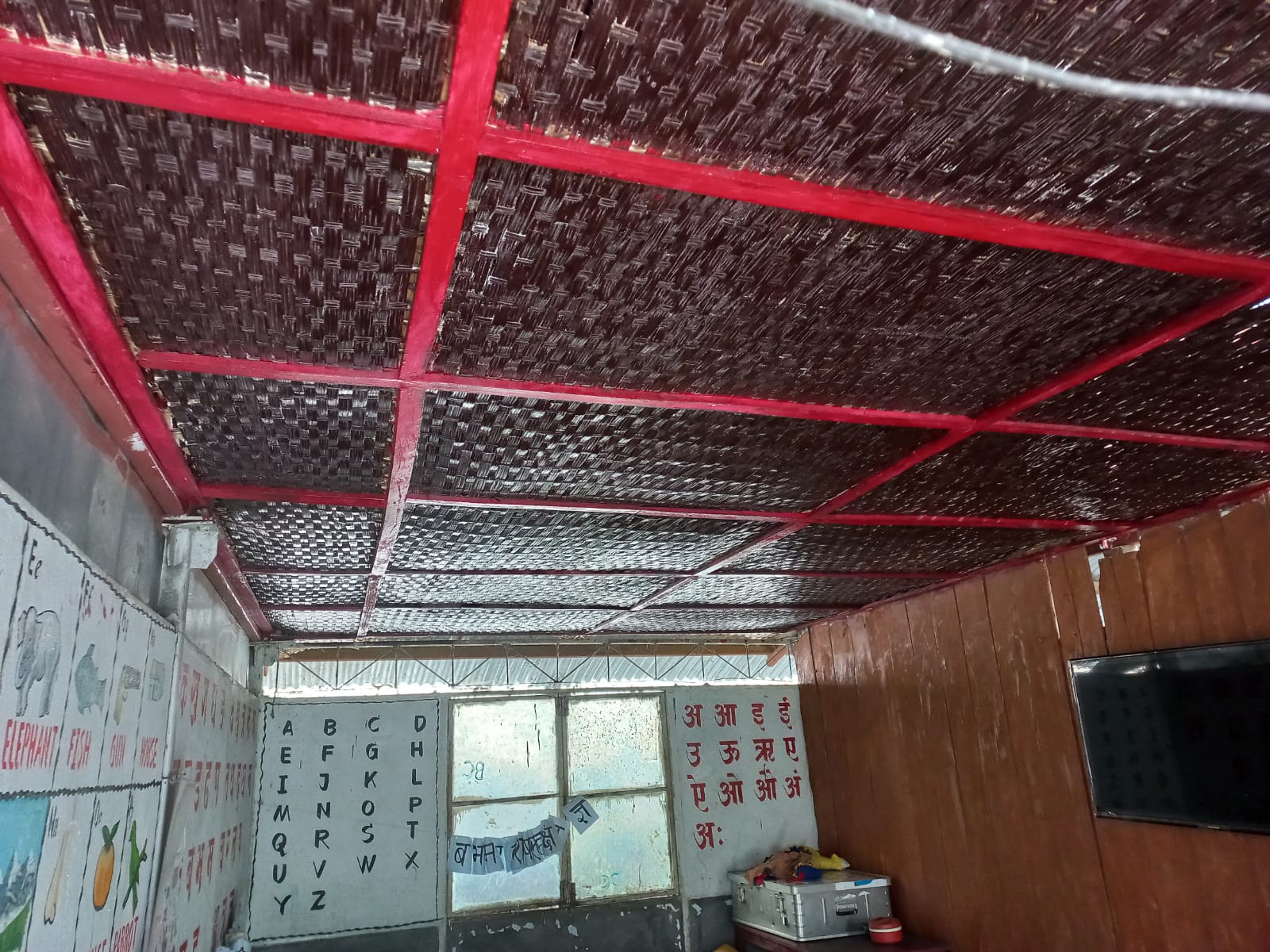

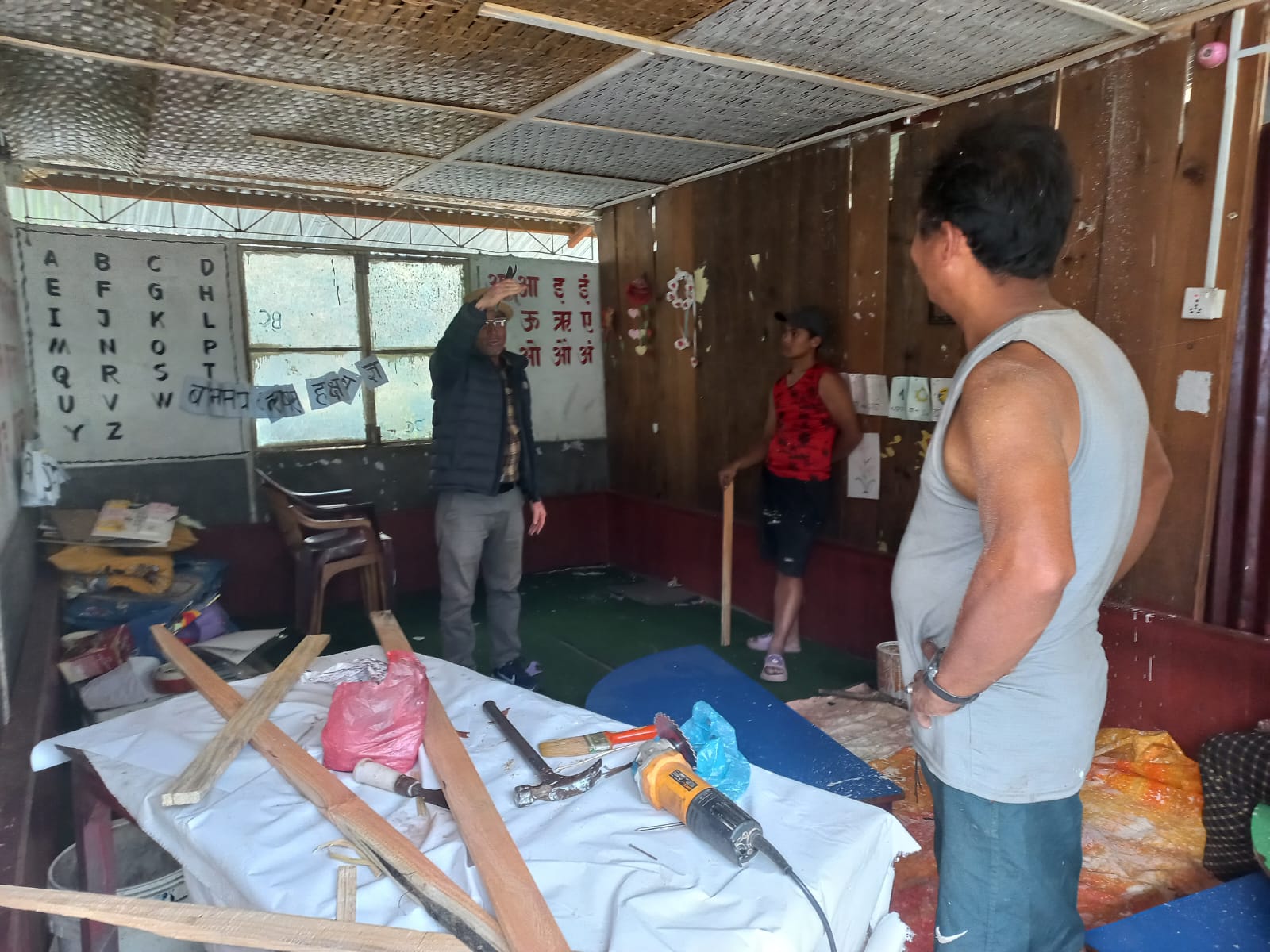

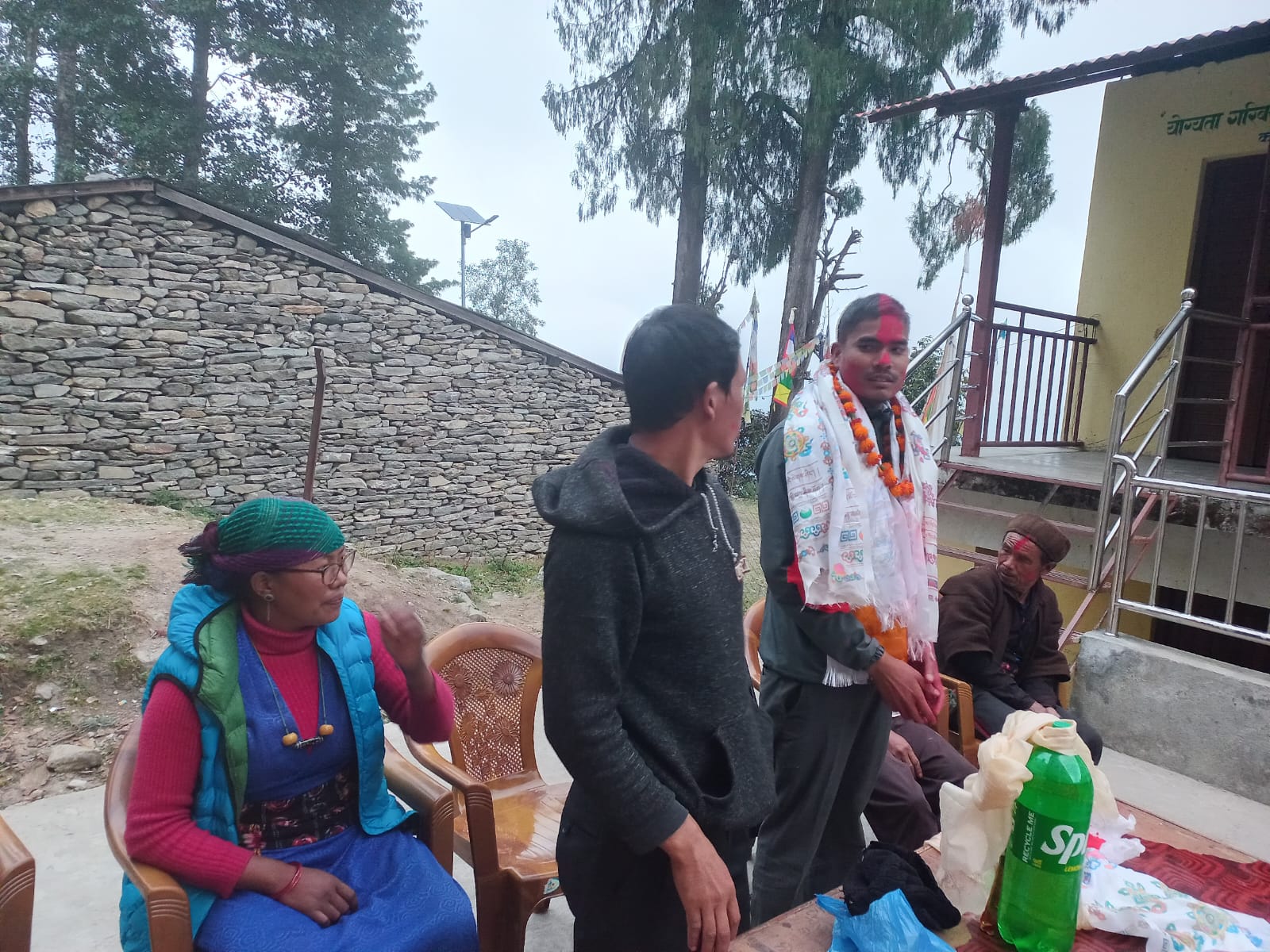

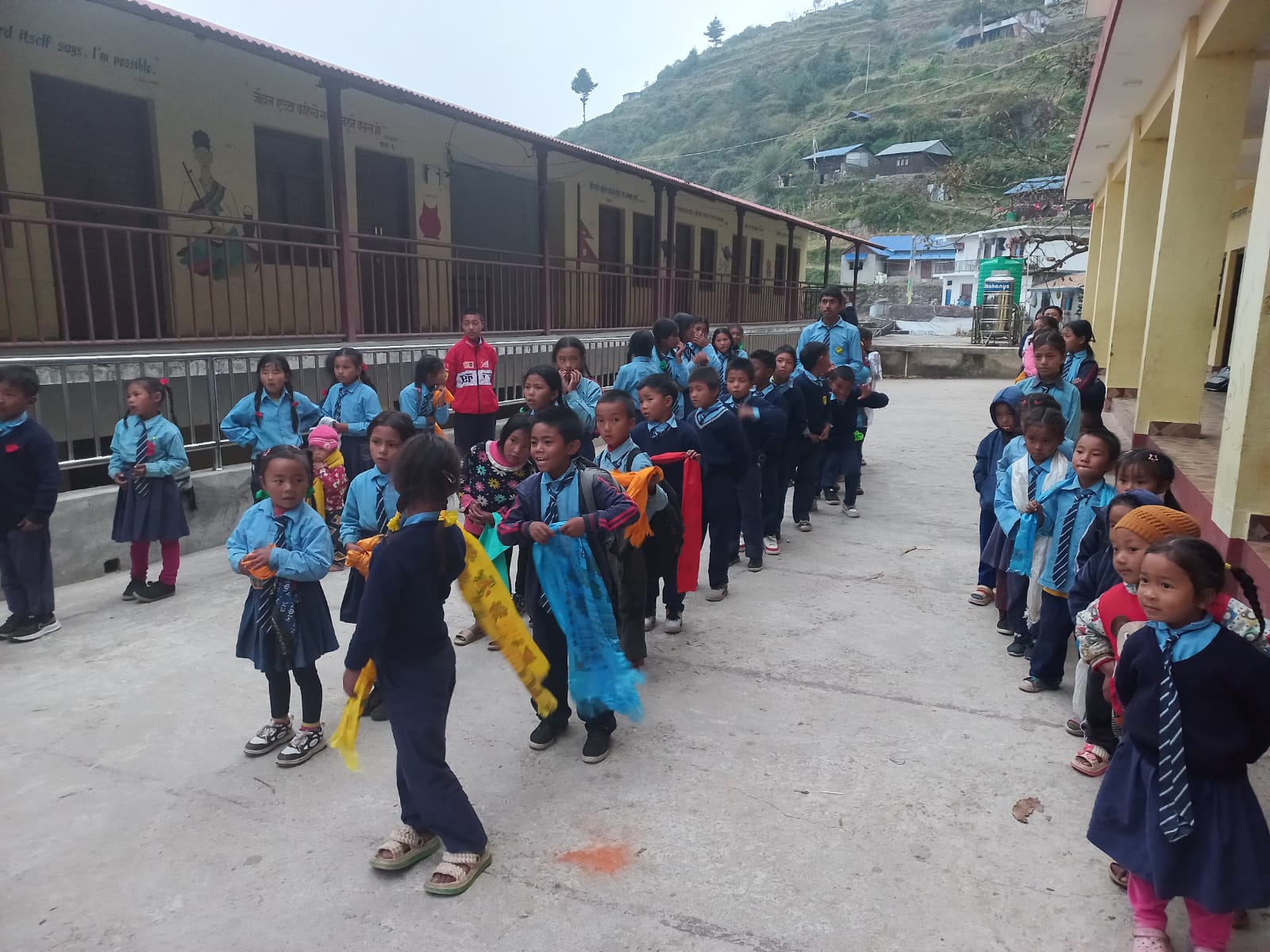

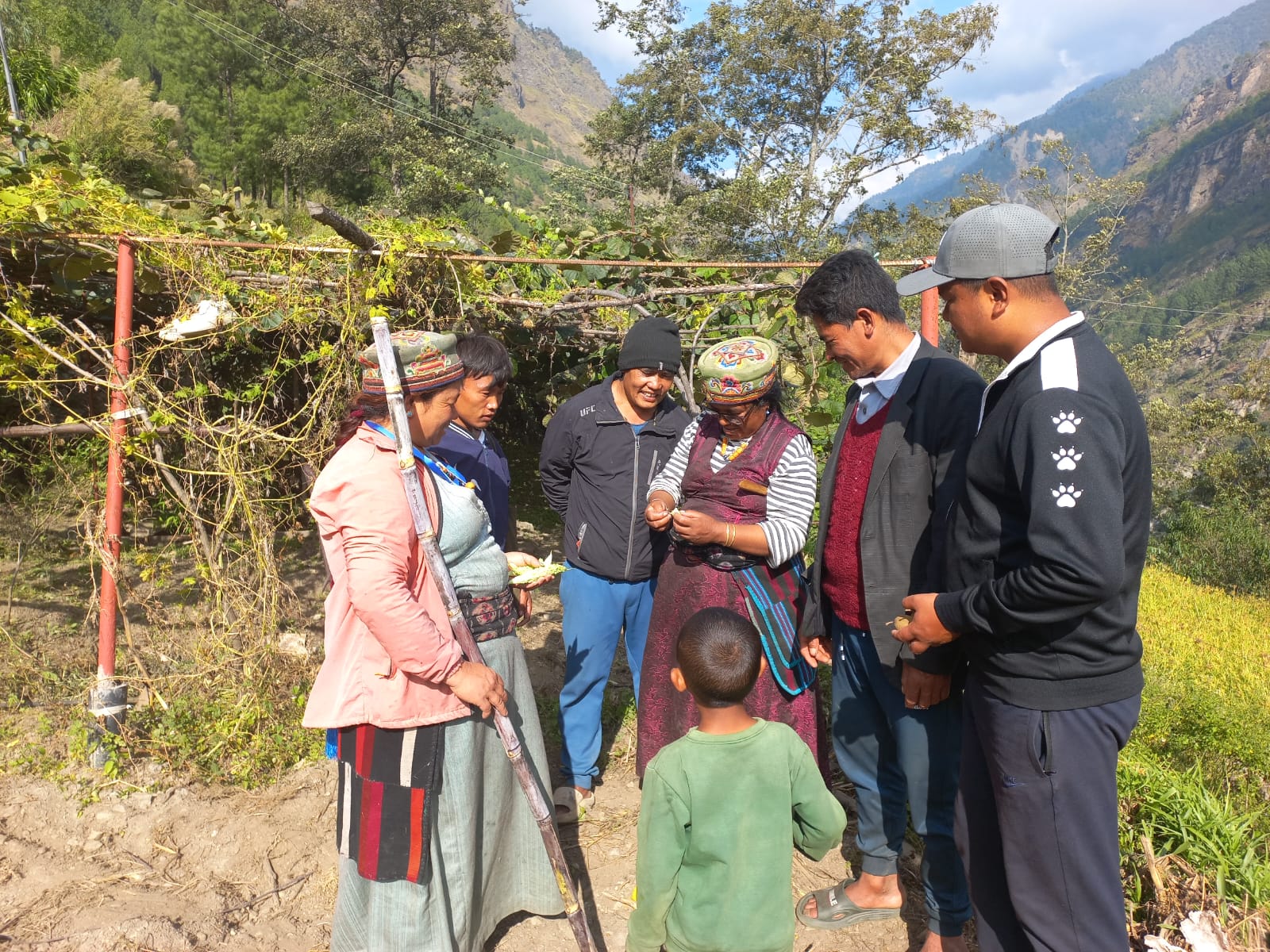

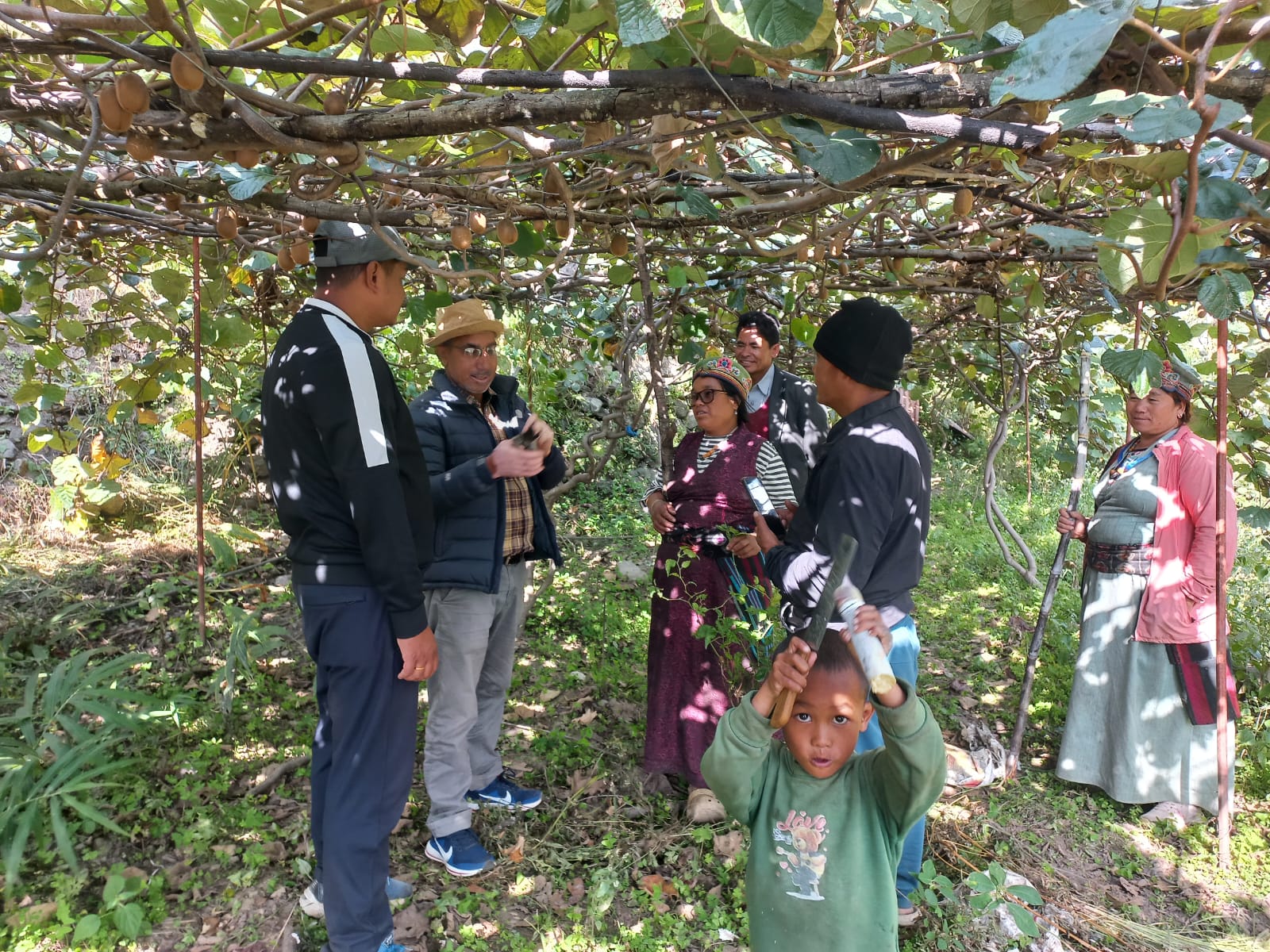

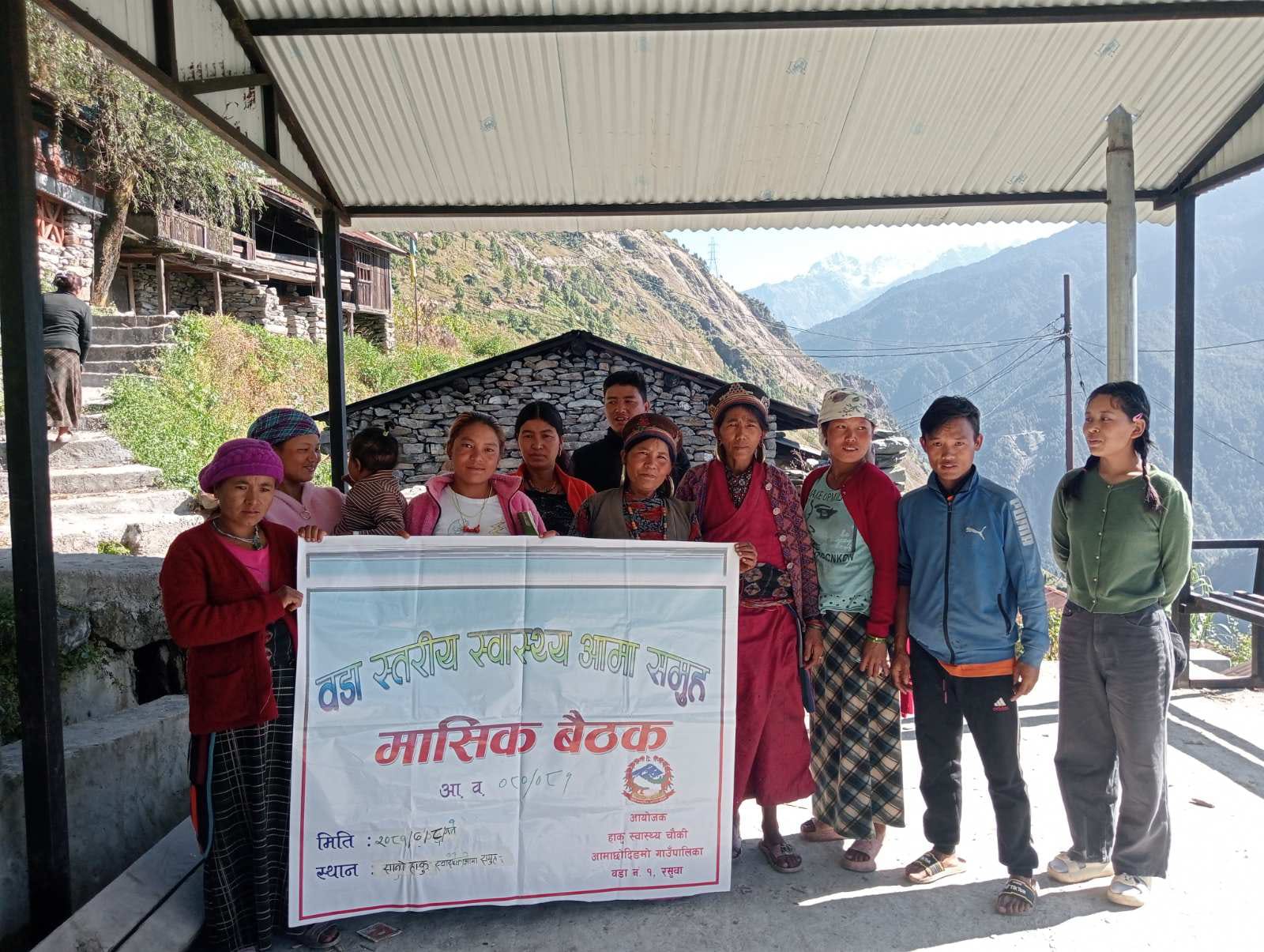

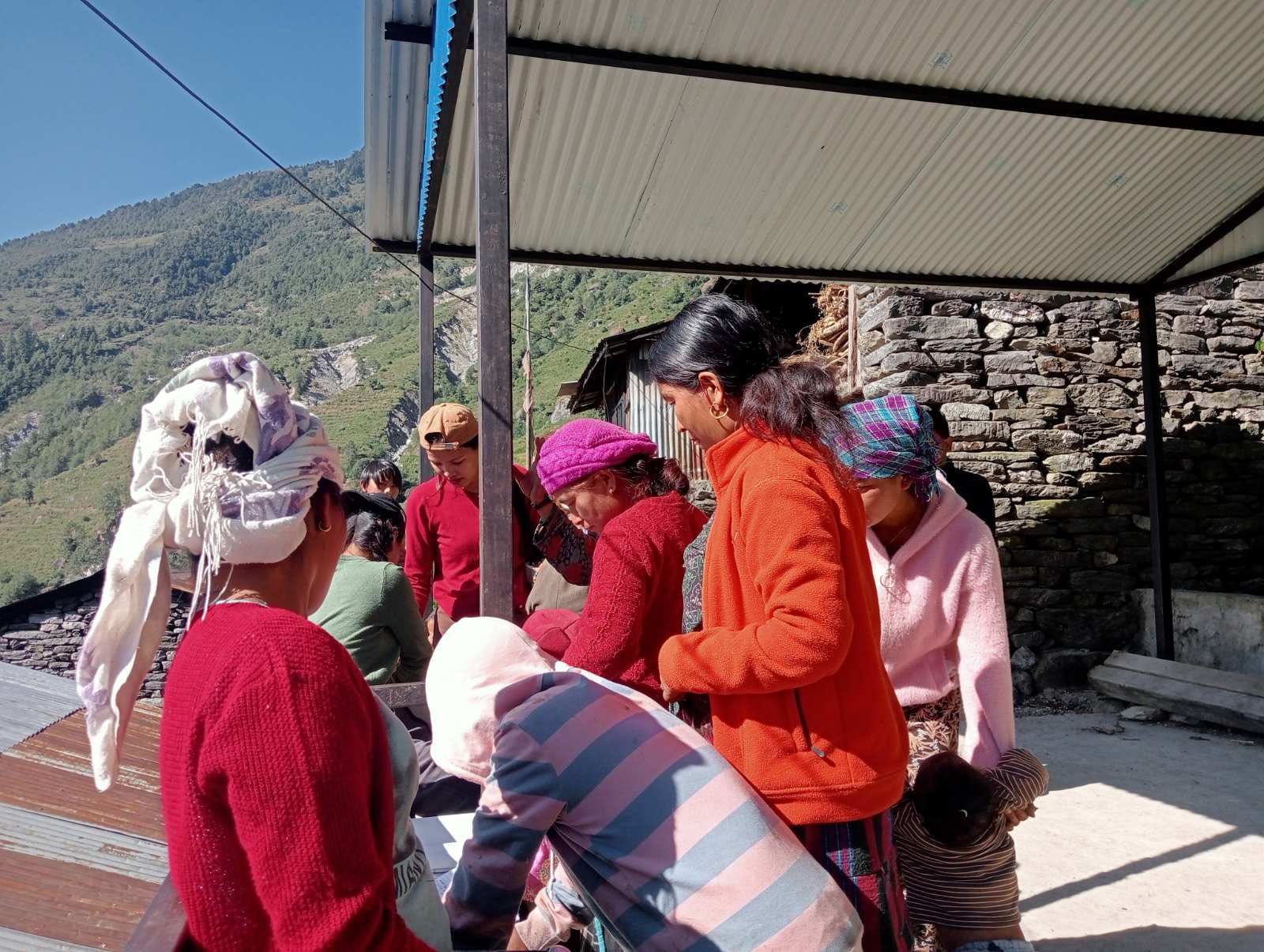

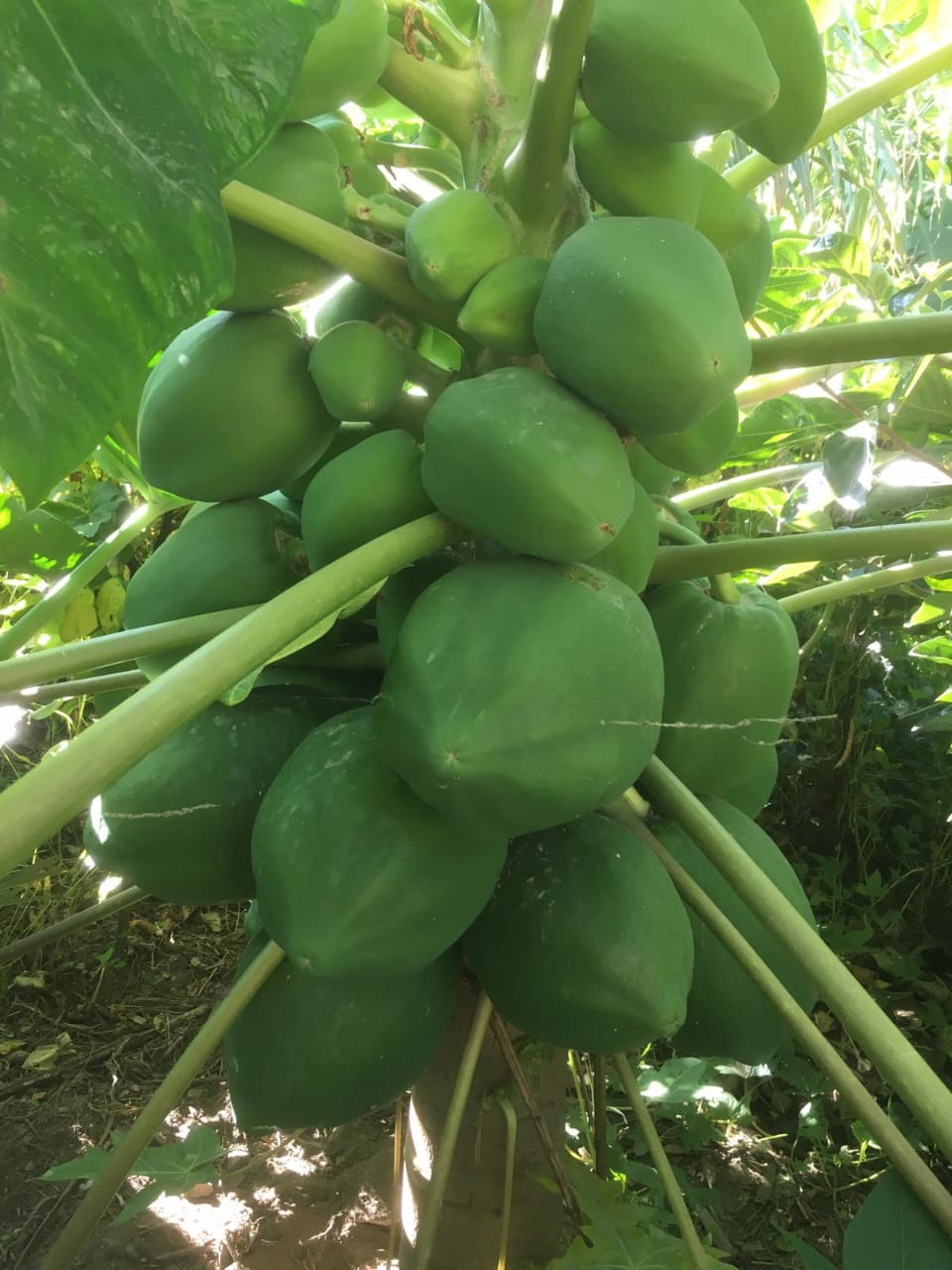

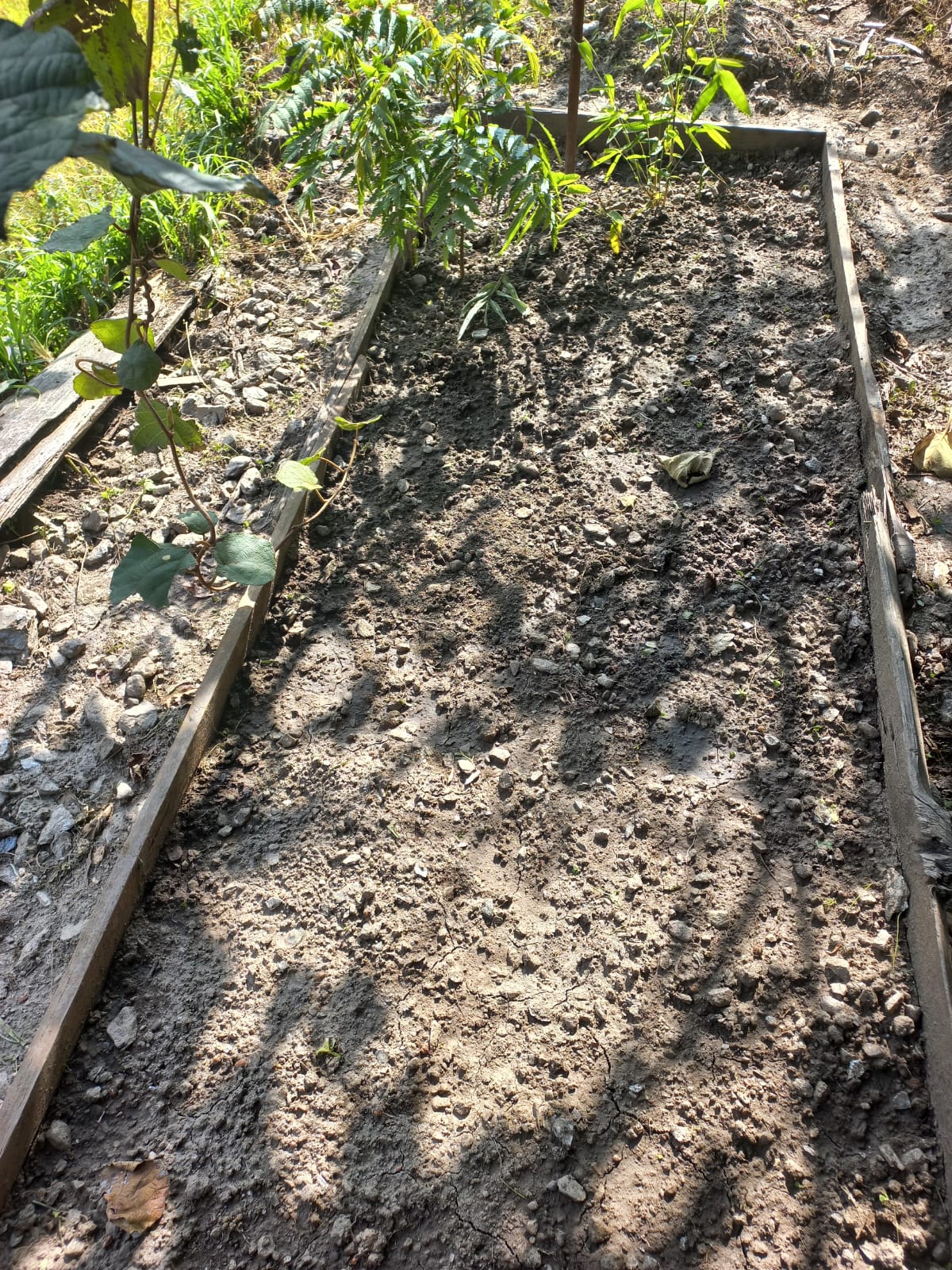
Those wishing to give the Haku schools a helping hand can deposit their contribution in the account number of BIKAS BE32 2200 7878 0002 marked ‘Haku’
Dhanyabad, thank you...

August 2024
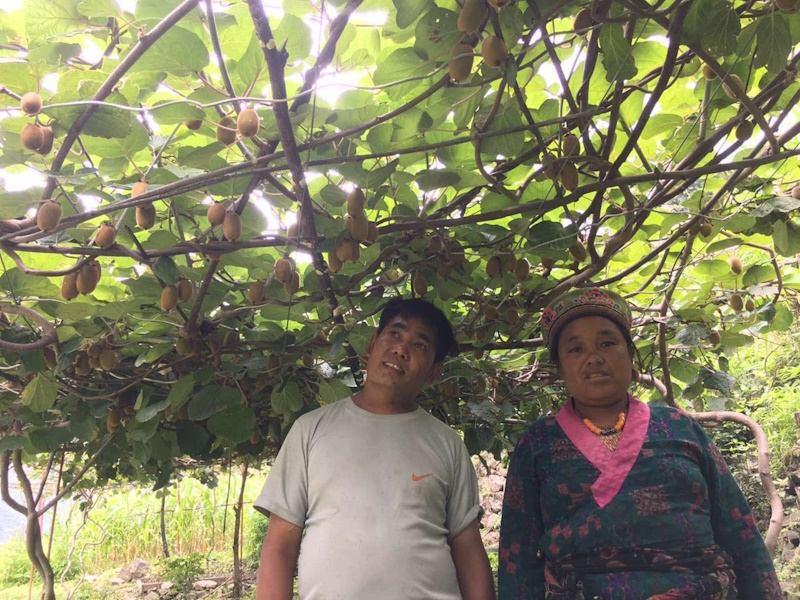
In the photos we receive each week, we see that people in the Haku villages are now harvesting their own apples and kiwis. Not only does the fruit look beautiful, people say the fruits are also very tasty!
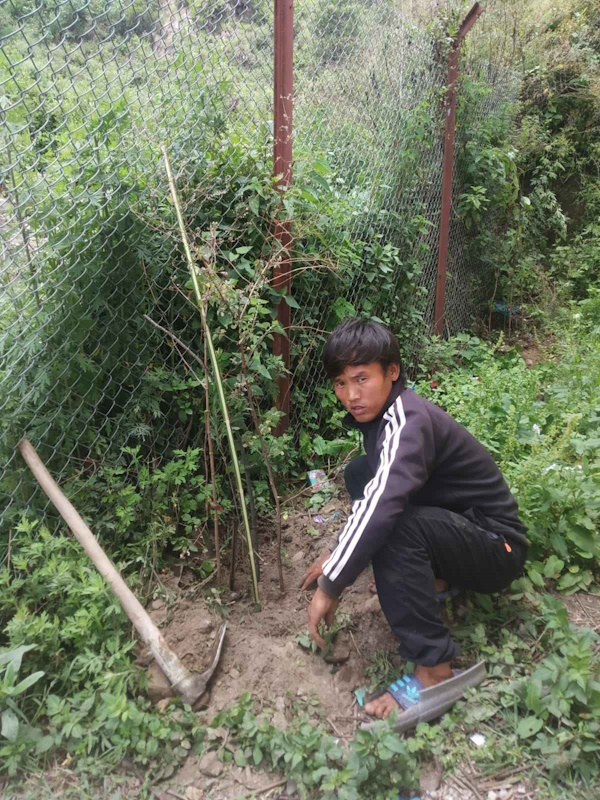
Before, people went elsewhere to buy fruit. People rarely bought fruit because it was expensive and because they had to go to Dhunche, which meant they were on the road for half a day or even a full day. People had to carry those kilos of fruit home, over the mountains. Now they pick the fruit from the trees, in their own garden. They can enjoy a homegrown piece of fruit every day, delicious and healthy!
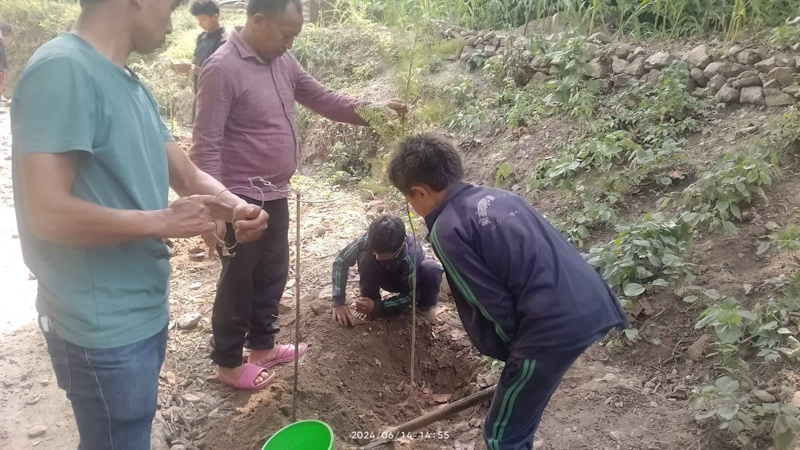
They also learned to grow all kinds of vegetables and herbs. And they do it very well! Not only the green volunteers and the villagers who have their own little garden are very enthusiastic. The students who regularly work in the school vegetable garden have also learned a lot. These practical lessons are always very popular with the students.
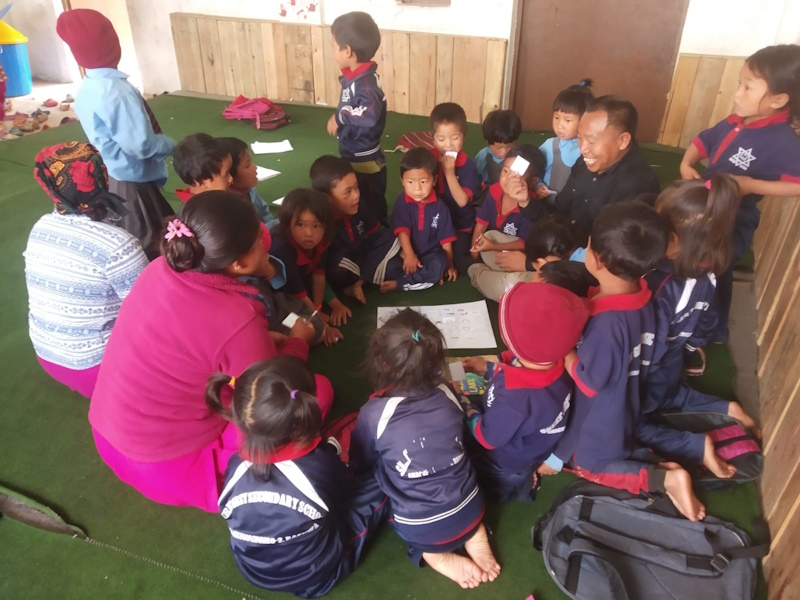
The photos show students from Goshaikunda Basic School in Pangling and Thulo Haku Secondary School planting trees on their school grounds. After a few years, these trees will also bear fruit and provide much-needed shade on hot days. They will then also provide natural cooling.
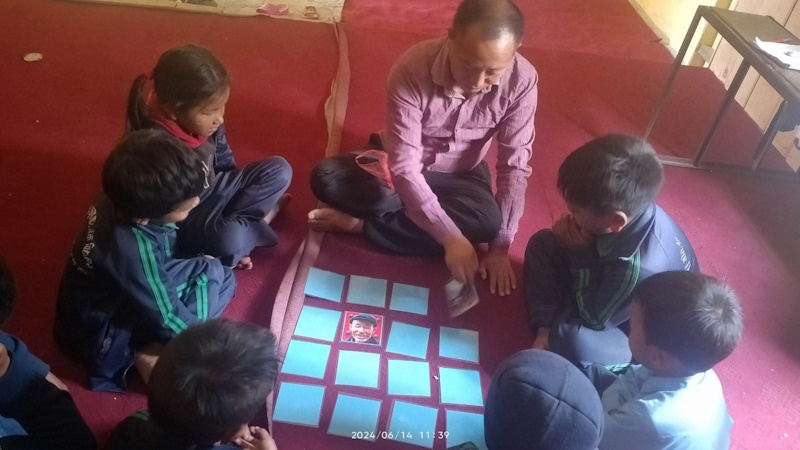
While many are working with their hands in the soil, principals from the five schools went on study visits to other schools.
Together with the female primary school teachers, the president and a female member of the school management committee, they visited four different schools. They went to two schools in Kathmandu, a school in Nuwakot and to a school in Dhading. It became an instructive exchange of knowledge and ideas.
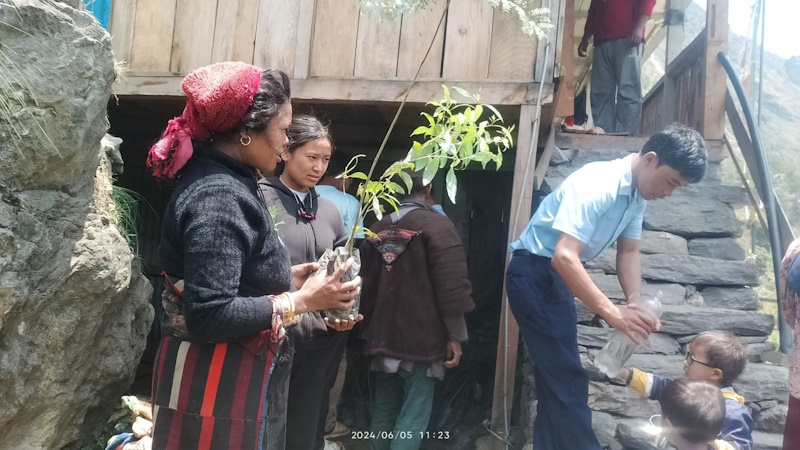
The educational expert, Dhan Rai, an employee of CEPP (Centre for Educational Policies and Practices) stayed in the Haku villages for several days.He went from school to school and taught the students. The students enjoyed this different way of being taught. Dhan Rai also taught the teachers how to make their own teaching materials and how to integrate these into the classroom.
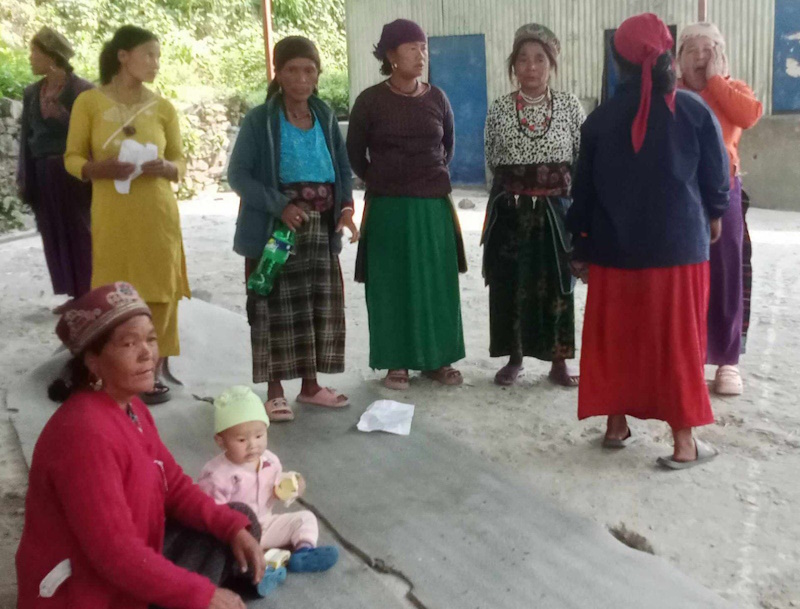
The greening and education motivator, Arjun Tamang, himself from and living in Sano Haku, is deeply committed to his Haku villages. He handed out guava and flower plants. Some plants for cattle feed were also distributed. We are curious to see how these little plants will do at this altitude.
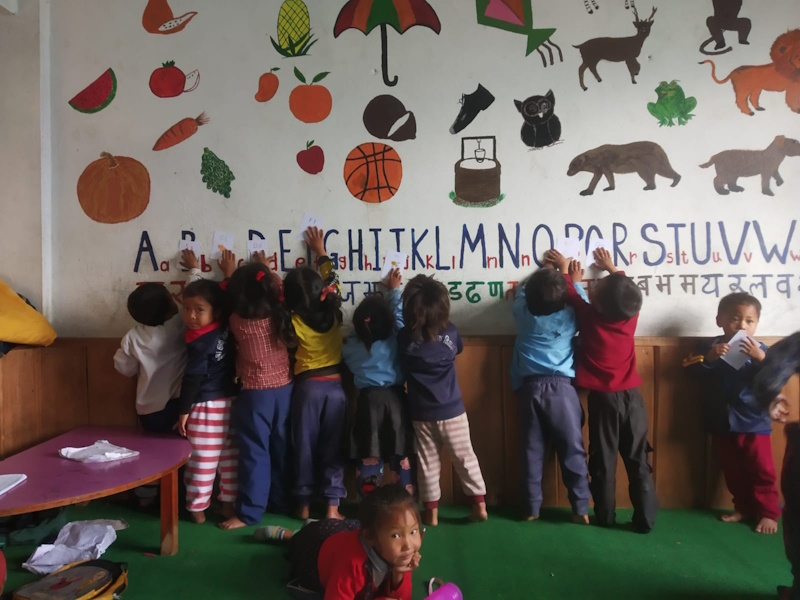
Arjun, who provides regular greening instruction, is also committed to the school education and the upbringing of the students.
He had a consultation with the mother group. These are mothers whose child - or grandchild - attends one of the village schools. The mothers are the driving force in the household and occupy an important place in the children's education. Much can be accomplished through the mothers.
Arjun interacted with the mothers and encouraged them to send their children to school as much as possible. He also taught personal hygiene and general hygiene at home. He also cited the importance of ensuring that young people attend school with clean uniforms.
Meanwhile, CEPP is busy selecting a suitable coordinator. Now that Bishnu has left, they are looking for a replacement. Finding a suitable person is a difficult process. Of the 20 applicants, five were retained. Finally, there remained one candidate who received a short training over the course of a week. Everything is evaluated and during the following days they will decide if this person has the right skills to work in the remote region of the Haku villages. The new coordinator will be on site for two years and should be able to work independently. It will be a big challenge for this person anyway.
I will be visiting Hakus schools in the fall and I am curious to see the evolution. Every time I go to Haku, I think back to how it all started there for me. 25 years ago I came here for the first time, together with Nepalese friends. Meanwhile, I have returned many times and Haku has changed completely.
After the devastating 2015 earthquake, we started BIKAS projects in this area. In all these years, I have witnessed many changes in these villages and we have been able to realise much. The first years, we dedicated ourselves to reconstruction, now we focus mainly on content. It is a completely different way of working, a different growing process that comes from within and that lasts longer. What will I see and hear in the Haku villages this time?
Betty Moureaux, Bikas president

Fieldwork in the Haku villages
February 2024
In good spirits, we set off for the final area of work, Haku schools in the high mountains of Rasuwa District. We drive there from Kathmandu with project officer Teeka, driver Ram, ecological officer Rishi and educational officer Dhan and laugh and talk non-stop along the way.

From left to right Ram, Dhan, Teeka, Rishi and Paul

The erosion in the area is striking, as is the hydroelectric plant on the river and the new road under construction.

In Haku Besi, we talk to the headmaster mainly about the Hostel where the children who live further from the school stay. We discuss how Bikas can support the school to make the children's night shelter better.
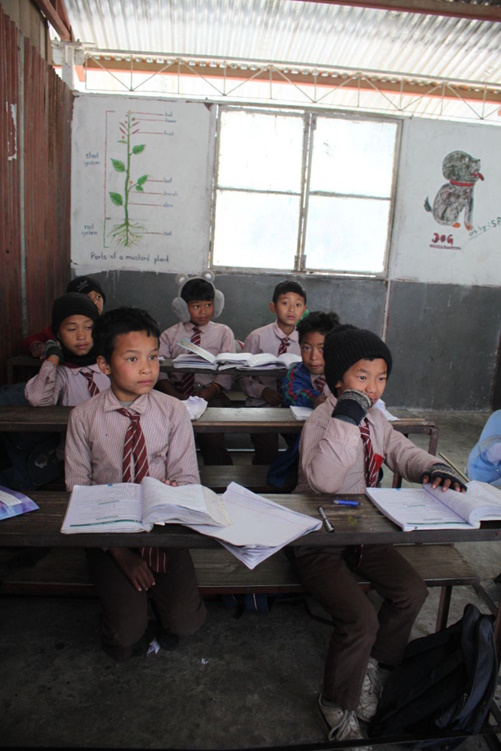
We sing an English song together, play a language game or have a motivational talk with the children of all classes.


In the upper village of Pangling, we have a very good impression of the accommodation, the atmosphere and the quality of education and the motivation of the teachers. There, we teach two English songs at the morning ritual and give a motivational speech to the attentive students and teachers, and we visit all classes together with an interested English colleague from Nepal.

Pangling is also the site of CEPP's local office and the plant nursery next door. We stay there all week and visit a different village and school every day, for observation, discussion and education.
Our contact with the green volunteers from the various Haku villages is very cordial…
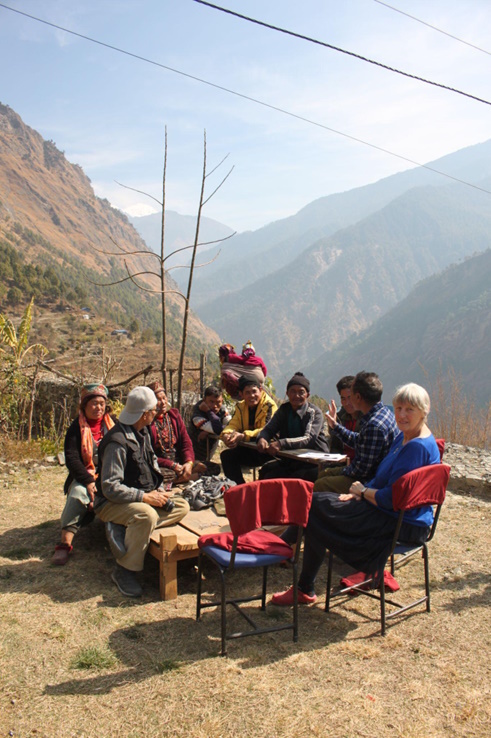
... and their discussions with Rishi and Teeka are animated. Rishi shares all his botanical knowledge with the volunteers and we ask them about their experiences with CEPP. They are enthusiastic and commit to continuing to maintain the kitchen gardens and educate the schools on the importance of motivated teachers and solid education.
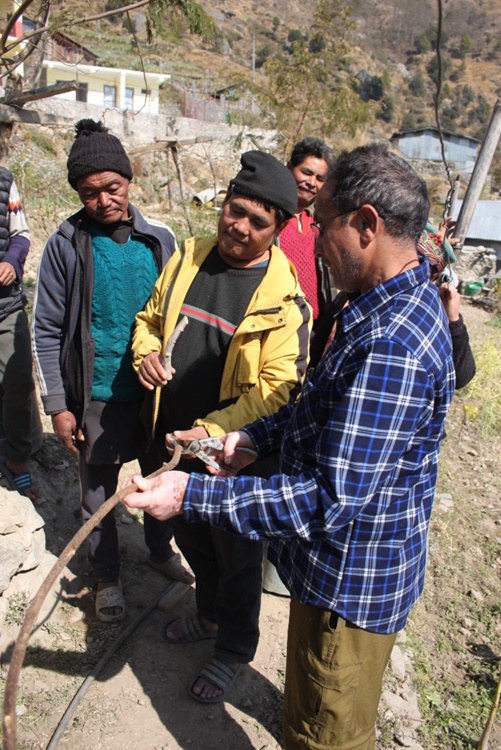
Rishi explains how the kiwi plant can be propagated and all participants take cuttings of the plant for their village vegetable gardens and school vegetable gardens, as well as other planting material. The plant nursery is now taking off after two years but needs constant maintenance and monitoring, realised on a daily basis by Arjun Tamang, from Sano Haku…

...who invites all of us to his home.He got married recently. Congratulations Arjun!

Rishi is very motivated around Rasuwa, he finds it a real revelation and is very happy here. He trains people to take up the old techniques of terracing again as they are more erosion-resistant than the currently popular technique with concrete. So together we visit a freshly constructed kiwi farm with a kitchen garden by a motivated teacher from Pangling and his friends. The wilderness terrain must first be pruned and levelled, then terraces are laid out with natural stones, then kiwi cuttings are planted in 30 x 30 cm pits and protected from wandering cattle with a kind of bamboo teepee, then the kitchen garden is laid out at the same time as an irrigation system from a nearby spring. The process of construction takes 3 months but brings young people together and the teacher also brings the school children there. The teacher records all the advice Rishi gives him with his mobile phone.
The ecological component of the project is definitely successful here, due to higher awareness and the high number of kitchen gardens and the example of the green volunteers in each village.

In Thulo Haku, we give activities in the kindergarten and first years but no motivational speeches in the higher classes, there is no time for that as we join CEPP for long talks with the teachers. They are honest and critical of the organisation's operations and especially want to know in advance what formations are planned.
Thulo Haku is evolving positively - the teachers there are responding more and more to parents' demands. Parents are emancipated and empowered and stand up for the right to a good education.


The streets in Thulo Haku are much cleaner since the collaboration with CEPP…

... and the number of vegetable gardens is growing by the day.
We walk to Nesing with the greening volunteers to Nesing because the road-in-construction is still too unsteady for CEPP's light jeep.


In Nesing, a few students are having cosy outdoor lessons and are enthralled by Dhan's introduction of new activities for English and Nepali.

The greening volunteers in Nesing invite us for tea with potatoes and proudly show off their vegetable garden.
Our final formation takes place in Grey where we step out the same evening and stay overnight at the headmaster's lodge. We don't have time to visit and document the school as we are already conducting a formation the next day, this time for all Grey's teachers, 16 in total, and with the headmaster. We tell the headmaster that the formation is aimed at the youngest children but he assures us that all participants are motivated and can gain useful insights, which turns out to be entirely true.


It is a very interested group and Arjun Tamang takes film footage all the time and driver Ram is also there and Dhan and Rishi and Teeka each do their input as per their speciality. We also organise nature tables = show tables, with creative processing and organise veritable maths activities for the benefit of upper class maths teachers.
A cordial and animated feedback session follows and the headmaster asks about follow-up sessions and pedagogical materials, for which we refer them to the CEPP team. We are already thinking about a follow-up session but also about a basic training day in Pangling for the other Haku schools because the jealousy in these schools is quite high anyway - all the schools are watching each other and are somewhat suspicious of each other... Even with our small pedagogical gifts such as laminated pictures about the region and magnifying glasses for nature observation, we have to be careful - we have to give as much to the other schools! Teeka has the excellent idea of adding some competition to it - teachers can only get something if they can justify why they need it and how they want to use it.

The Haku schools are not an easy area of operation, but support to improve the quality of education is really needed - and Why choose the easy when the hard can be done? We did find working with local people easy and heartwarming.
All in all, the Grey formation is a happy apotheosis to the inspiring and supportive collaboration with CEPP and teachers and village communities of a whole month!
Paul Beké and Carine Verleye

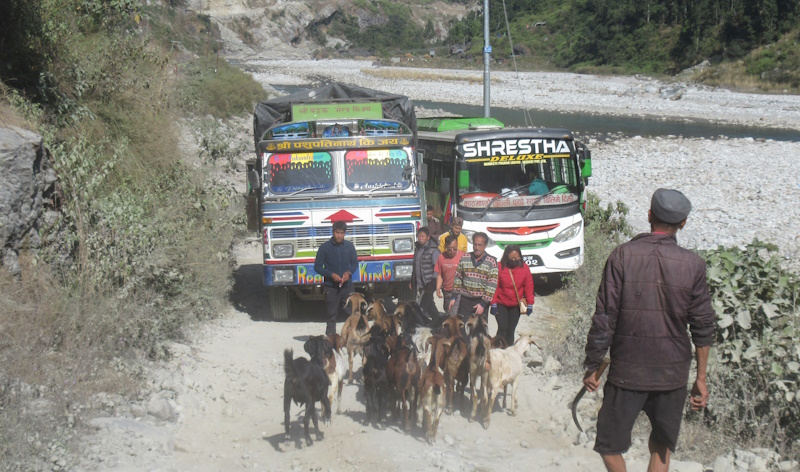
December 2023
In early December, I went with Ngawa Tamang to his native village of Haku.
By public bus, we covered the 120 km to Haku Besi in an eight-hour drive of which an hour and a half was spent on lunch. The stretch there is mostly in poor condition. Only a third of the road is paved. While bumping and colliding, we drove towards Rasuwa district while loud music reverberated from the loudspeakers. Despite all the shaking and deafening noise, I regularly dozed off, occasionally banging my head against the window. As a result, I got off the bus with a whopper of a bump on my head.
Just before nightfall, we reached our final destination and began the climb to the village of Haku Besi. Out of the darkness, "namaste didi" suddenly sounded. It was headmaster Karbo Tamang who was waiting for us. We took up residence in his house and moments later people from his school came in, including Bishnu and Rishi, both employees of CEPP, Centre for Educational Policies and Practices.
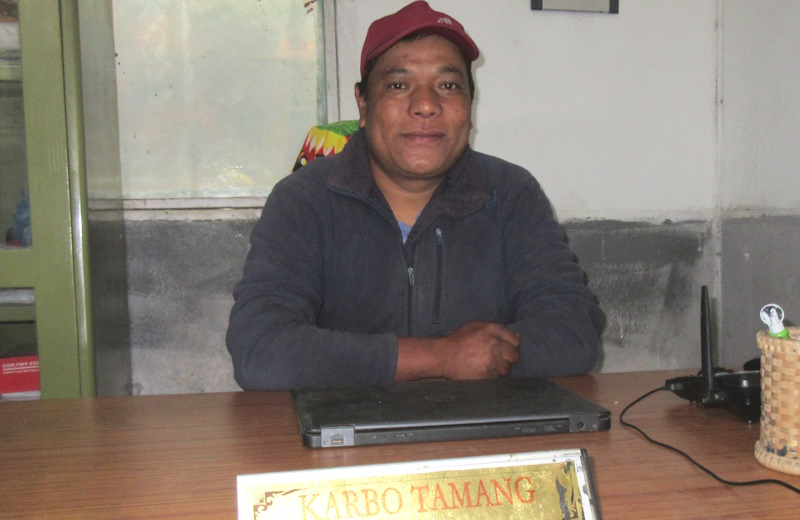
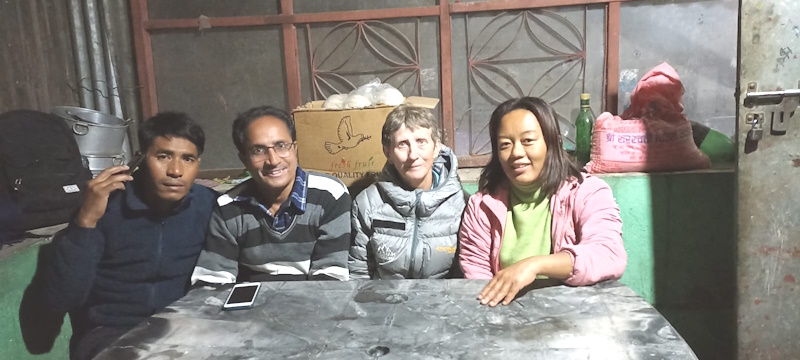
Bishnu has been staying and working in Haku for almost two years. It was and is quite a challenge for her. A little later, a live chicken was shown and judged and still a little later it was simmering in the pot for a tasty curry with dal bhat tarkari. This is the national dish of rice, lentils and vegetables. Rakshi, the locally brewed alcohol, was brought out and tongues were loosened. Stories of the past but also of school and village functioning today came up. It was a good start to visiting the projects of the five Haku villages over the next few days.
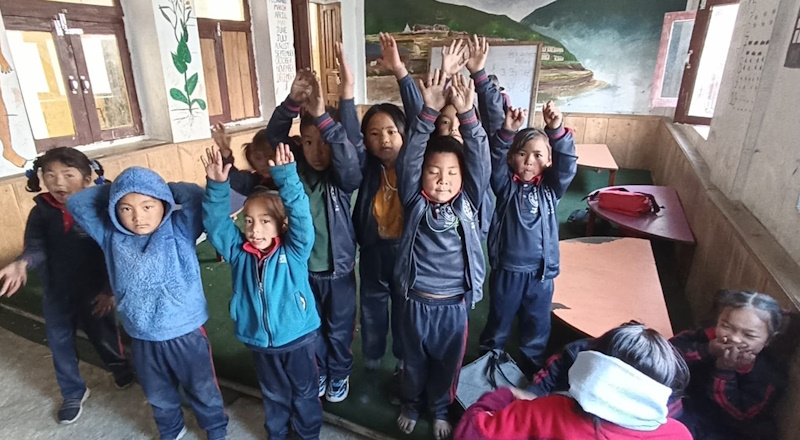
After a cup of morning tea, a Nepali ritual not to be skipped, we visited Haku Besi school. This has a kindergarten class and primary school classes from 1 to 8. With pride, headmaster Karbo showed off his simple classrooms, which are furnished as well as possible. The two students, Ellen and Fleur from Luca School of Arts in Lucas Gent, who did a two-week internship here last summer, have made a world of difference.
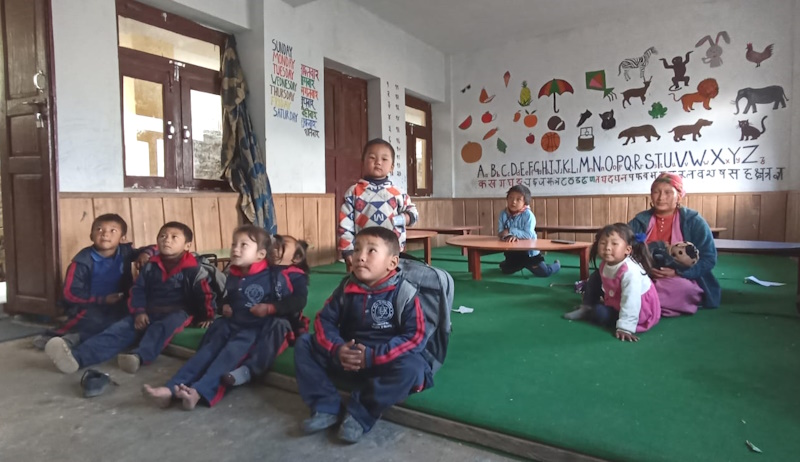
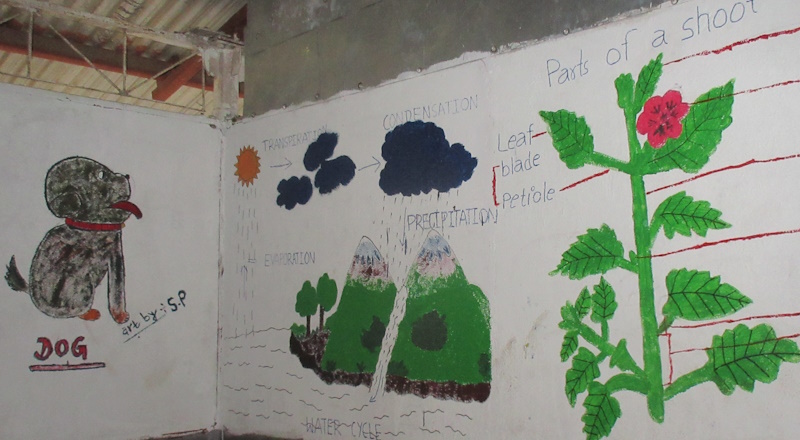
Beautiful murals were painted so that the whole place looks much more colourful and child-friendly. I saw the school desks, the computer tables, the projector and the blackboards we had given from Bikas. Everything is well used here. This school, despite its inferior building and limited space, is regarded as one of the best in the region. This is certainly to Karbo's credit. He is the driving force and makes sure his teachers do a good job. Always looking to innovate and improve, he seizes all tips and opportunities offered to him from CEPP and others.
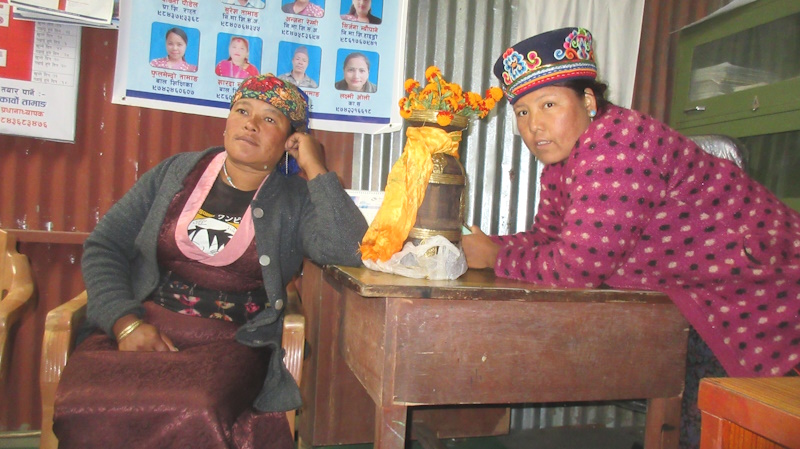
I also met the mothers' group who are very enthusiastic about Bishnu and their school. It is a close-knit women's group that meets regularly. They take turns going to school once a week to follow their children's lessons closely. They work together with the school in an open and constructive way and strengthen each other from their experience and knowledge. The proper education and care of their children is central. To them, Karbo is the best headmaster they can imagine. He lives and fights for his school. If a student does not show up, he gives the parents a call asking where the child stays.
The number of students is still seen growing in this school. For instance, children from the surrounding villages come to Haku Besi because they have higher grades. There are also pupils who prefer Haku Besi to a school nearby because it has a better reputation. If a school here runs well, there is much less flight to the cities. We can only encourage this. Karbo pointed out to me the shortage of classrooms. There are two run-down classrooms, consisting of zinc plates, which he would love to see renewed. This should be nothing special to him, just simple but decent classrooms. His school is now very austere. The building was a temporary school, erected after the big earthquake of 2015 but it is still very functional. For Karbo, it does not matter that the building in itself is not very good and beautiful. What matters most to him is the content of education and he succeeds very well in that. This school also has a boarding school. This allows him to take care of children who live a bit further from school, as well as youngsters who are difficult to take care of at home because the mother is on her own. During the week, they stay at the boarding school and they go home at the weekend. Because there is a boarding school close by, more children stay in their home area and only flee the region a few years later to go to Dunche or Kathmandu, when they continue their studies. I credit Karbo with his fantastic work. He may have the worst school building among the surrounding villages but he has by far the best school operation in the region.
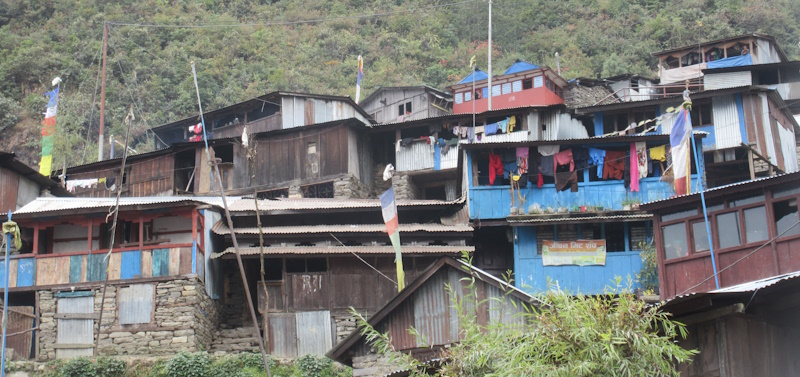
Bishnu, Ngawa and I lash our backpacks and start the steep and long climb to Thulo Haku. Of course, we get to stop a few times along the way with acquaintances of Ngawa who is from this region. We are offered milk, a boiled egg and even nettle soup. The target of being in Thulo Haku by 10 o'clock was adjusted by more than two and a half hours. Nepali time is as flexible as a rubber band.
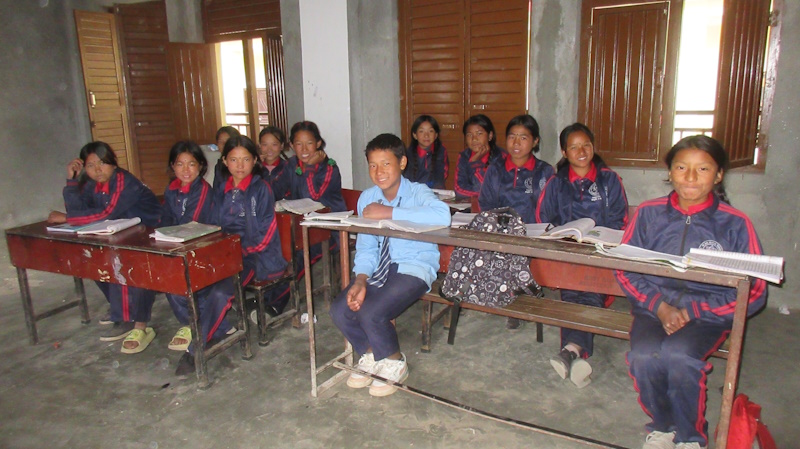
In the afternoon, a meeting with headmaster Dawa Norchung and his teachers is scheduled. Here, the meeting runs much more laboriously. Although I speak a fair bit of Nepali, I cannot follow. People are talking interchangeably and I don't understand anything. I know that in the past, the headmaster was difficult because people confronted him about the fact that both he and some teachers were regularly absent. Apparently, this remains a thorny issue and he feels people should not interfere. The drive of this school here is significantly lower than in Haku Besi. I can already see it in the less orderly classes and because more dirt is lying around. When I ask if they want to continue working with CEPP, I get a positive answer. However, if we continue with CEPP in this school, the headmaster and his teachers will have to prove that they are worth the investment of time, energy and money. On the other hand, we don't want to leave children and parents to their own devices. The parent group is doing quite well here and also responding to the teachers' many absences. The fact that parents are watching and asking for better teaching is perceived as threatening by the teachers.
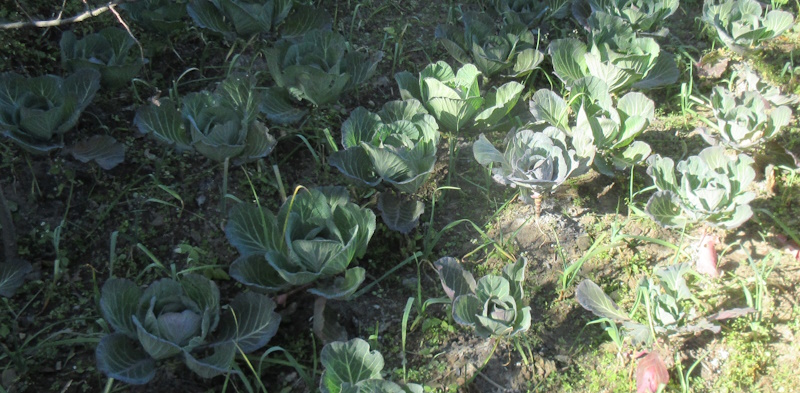
The vegetable gardens are doing well in this village. People regularly seek advice and it is Arjun Tamang, a young man from Sanu Haku, who contributes a lot here as a CEPP employee. He has grown tremendously in his work and is now working full-time on everything revolving around agriculture and horticulture.
With some disappointment, Bishnu and I walk on to the next village, Nesing. Bishnu has put so much energy into this work and then it is mainly the headmaster who does not want to cooperate. I understand her great disappointment.
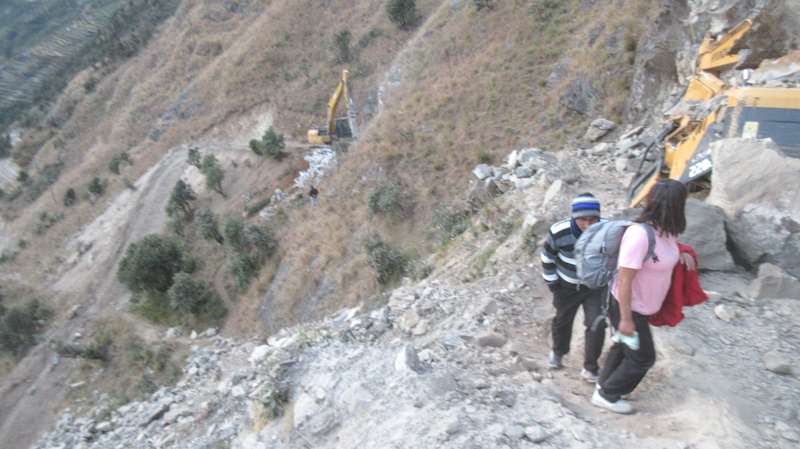
Rishi, who had already walked ahead, rejoined us. He helped us across the difficult stretches where they are making a new track. With a big machine, they are trying to drill the big boulders into pieces so as to build a road that will connect one village to the other. From sunrise to sunset, the machine can be heard. Man tries to dominate nature but I fear that with the first hard rains, the tables will be turned again. Landslides may wash away parts of the road and then the game of take and give will continue to repeat itself.
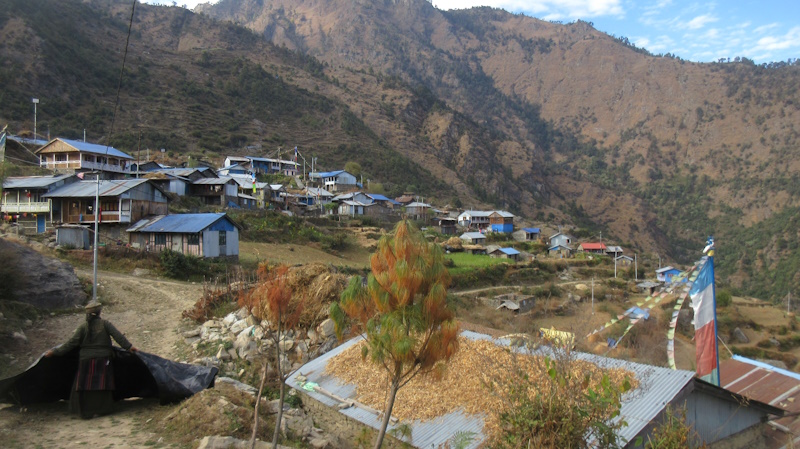
In Nesing, we were welcomed with open arms. There, I visit the house of Dawa Singi, a man with golden hands. He was also one of the first to get an earthquake-proof house from BIKAS after the earthquake and now I see that he has seriously expanded his house. He is also one of the village's green volunteers and his garden looks fantastic.
In Nesing too, the women's group works very well. Just as we left, they were cleaning up the paths. The dirt was picked up, the weeds pulled out and the paved path was even brushed. The local school here is tiny and has only 18 pupils, mostly toddlers.
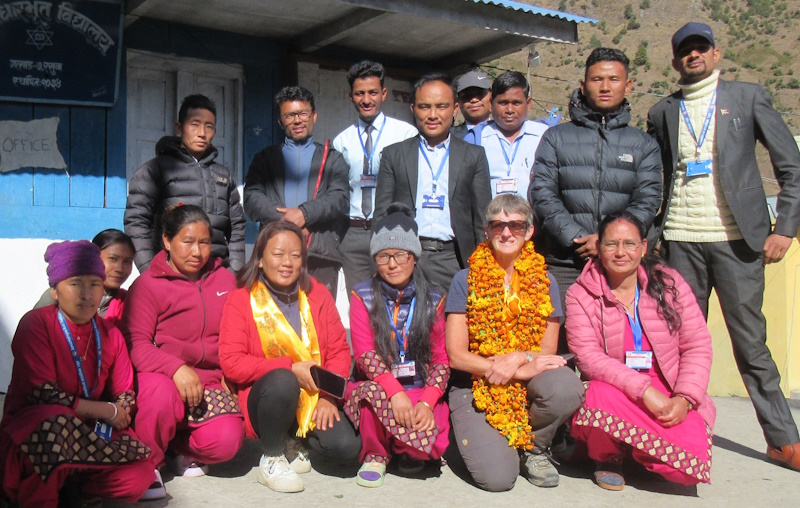
The three of us set off in the morning for the next village of Grey. In the distance, we could see the white peaks of the Langtang mountains and after a cold night, we were happy when the first rays of the sun warmed us up. We were warmly welcomed by the school headmaster Saroj Tamang. He is a real jumper and extremely driven to make his school a model school. Although he had to go to a meeting outside his village, he wanted to receive and show us around first. We were welcomed with numerous garlands of flowers made by the school children themselves.
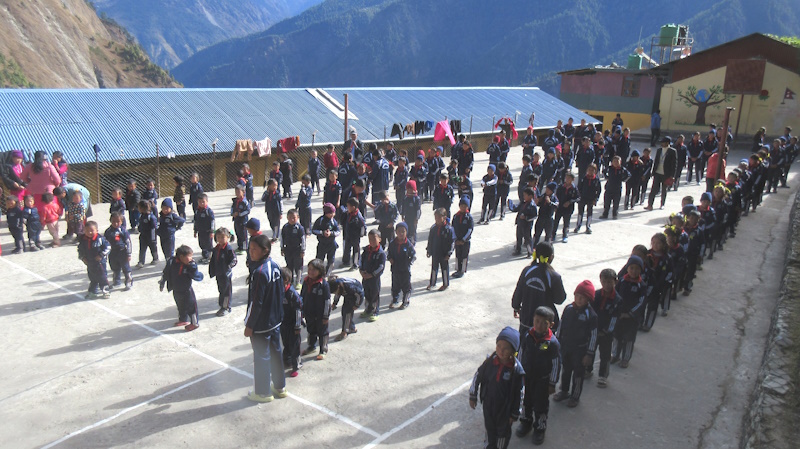
We witnessed the school's day opening. Some 150 students in uniform were lined up in the playground in rows from small to large. One of the older pupils stood at the front and directed the morning's proceedings. Today, it was 15-year-old Asim who took up the microphone and led the half-hour programme very enthusiastically. There were gymnastic exercises, a Nepali dance, a speech by a student and, of course, the Nepali national anthem, which everyone sang along at the top of their voices.
|
|
|
|
After the headmaster introduced me, the students went to their class row by row and to the rhythm of march music. You felt a great enthusiasm and togetherness in the whole event. Here, too, the two trainees from Saint-Lucas had been working for a few weeks and here, too, they were so happy to have received help from foreign students. The headmaster wants nothing but to learn, he said. He wants it to be the best school in the region. The number of students continues to rise. Where children from the big village of Grey used to move away, they now stay in this school for as long as possible.
A rule at school is that the first half of the week everyone speaks English, the other days Nepali is spoken. This is how they try to improve English and I must admit that I heard quite a few children and teachers speak English well.
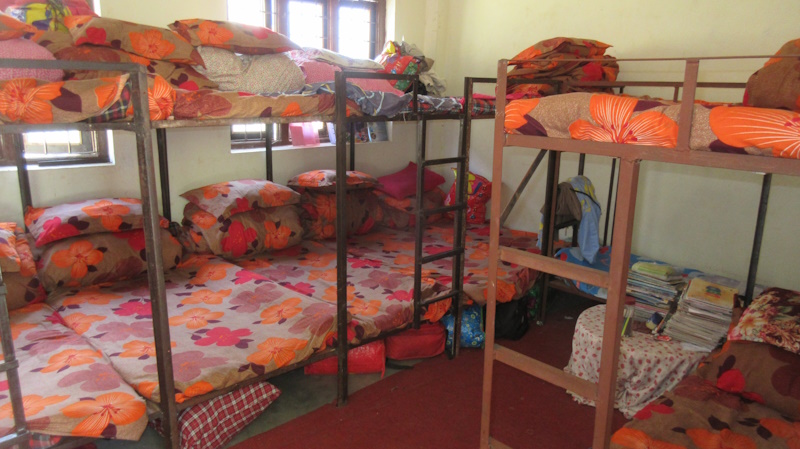
Again, the boarding school is an important part of the building. It ensures that the children stay in their familiar environment. Over 100 children stay there during the week. Apart from care, they also receive a lot of study support. Parents pay a fee for food and the teachers take turns looking after the children. A serious extra task on top of the teaching job that is not to be underestimated. Here one also sees much better school results among the students staying at boarding school. Extra attention is paid to the amount of homework and living together with peers. I visit every class and it gives me great pleasure to see how a school is kept running well here.
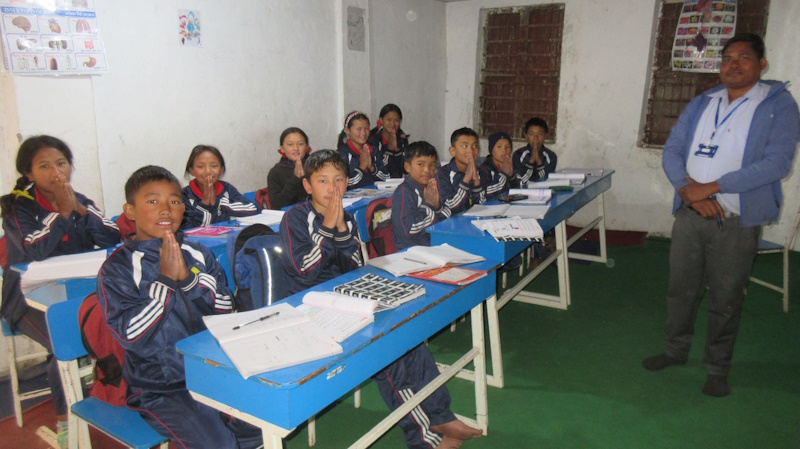
Via Nesing, we return to Pangling, where the CEPP staff's temporary residence is. We get another visit from Pangling's headmaster. He asks us to be allowed to use the building we built with Bikas six years ago as a boarding school. Again, the same request to accommodate children during the week. Most women are responsible for bringing up their children on their own as many men are elsewhere to work and earn a living. There is not much time for the children and they are more likely to be sent to local school that offers boarding, rather than to a school without this facility, so that the children can come home at the weekend. Even if something happens, they are not far away. If this option is not offered, the children will have to go to a boarding school far away and can only come home during the major holidays.
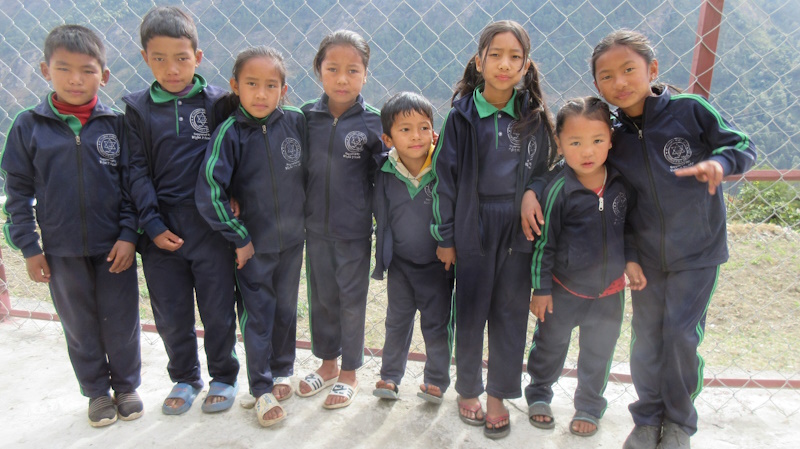
Then it is time to say goodbye to the Haku villages and we all return to Kathmandu together. I am glad I took the time to visit each school. I was able to listen and talk to the teachers, students and parents. I heard their stories, saw them working, saw the changes and listened to their expectations. In each village and school, I saw an unstoppable growth process. There was the hope for even more progress and the demand to keep working with Bikas. In some communities things do go more smoothly than in others.
I would like to express my great respect to Bishnu who has already worked here for two years under often difficult circumstances. For family reasons, she will stop working at CEPP at the end of December. She laid a foundation that created a snowball effect. Parents have become more aware of the importance of sending their children to school. They have become the driving force of schools alongside teachers. Together, they form the growing soil for a good education for their children. The snowball is unstoppable yet sometimes it bumps into something.
At the bridge over the Trisuli River, we hang a khata with our names on it. Bishnu's name, in big letters, will be there blowing in the wind for a long time to come. Along with Buddhist prayers, they will blow into the world past 'her Haku villages' where she has done so much work and where people care about her.
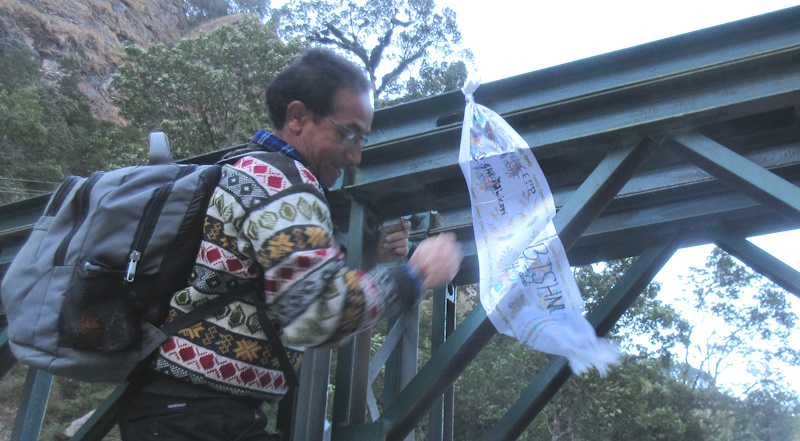
People wishing to support the Haku schools can do so on Bikas’ account number BE32 2200 7878 0002 with the mention 'Haku'. Dhanyabad, thank you.
Betty Moureaux, chairwoman of Bikas

June 2024
In good spirits, we set off for the final area of work, Haku schools in the high mountains of Rasuwa District. We drive there from Kathmandu with project officer Teeka, driver Ram, ecological officer Rishi and educational officer Dhan and laugh and talk non-stop along the way.

From left to right Ram, Dhan, Teeka, Rishi and Paul

The erosion in the area is striking, as is the hydroelectric plant on the river and the new road under construction.

In Haku Besi, we talk to the headmaster mainly about the Hostel where the children who live further from the school stay. We discuss how Bikas can support the school to make the children's night shelter better.

We sing an English song together, play a language game or have a motivational talk with the children of all classes.


In the upper village of Pangling, we have a very good impression of the accommodation, the atmosphere and the quality of education and the motivation of the teachers. There, we teach two English songs at the morning ritual and give a motivational speech to the attentive students and teachers, and we visit all classes together with an interested English colleague from Nepal.

Pangling is also the site of CEPP's local office and the plant nursery next door. We stay there all week and visit a different village and school every day, for observation, discussion and education.
Our contact with the green volunteers from the various Haku villages is very cordial…

... and their discussions with Rishi and Teeka are animated. Rishi shares all his botanical knowledge with the volunteers and we ask them about their experiences with CEPP. They are enthusiastic and commit to continuing to maintain the kitchen gardens and educate the schools on the importance of motivated teachers and solid education.

Rishi explains how the kiwi plant can be propagated and all participants take cuttings of the plant for their village vegetable gardens and school vegetable gardens, as well as other planting material. The plant nursery is now taking off after two years but needs constant maintenance and monitoring, realised on a daily basis by Arjun Tamang, from Sano Haku…

...who invites all of us to his home.He got married recently. Congratulations Arjun!

Rishi is very motivated around Rasuwa, he finds it a real revelation and is very happy here. He trains people to take up the old techniques of terracing again as they are more erosion-resistant than the currently popular technique with concrete. So together we visit a freshly constructed kiwi farm with a kitchen garden by a motivated teacher from Pangling and his friends. The wilderness terrain must first be pruned and levelled, then terraces are laid out with natural stones, then kiwi cuttings are planted in 30 x 30 cm pits and protected from wandering cattle with a kind of bamboo teepee, then the kitchen garden is laid out at the same time as an irrigation system from a nearby spring. The process of construction takes 3 months but brings young people together and the teacher also brings the school children there. The teacher records all the advice Rishi gives him with his mobile phone.
The ecological component of the project is definitely successful here, due to higher awareness and the high number of kitchen gardens and the example of the green volunteers in each village.

In Thulo Haku, we give activities in the kindergarten and first years but no motivational speeches in the higher classes, there is no time for that as we join CEPP for long talks with the teachers. They are honest and critical of the organisation's operations and especially want to know in advance what formations are planned.
Thulo Haku is evolving positively - the teachers there are responding more and more to parents' demands. Parents are emancipated and empowered and stand up for the right to a good education.


The streets in Thulo Haku are much cleaner since the collaboration with CEPP…

... and the number of vegetable gardens is growing by the day.
We walk to Nesing with the greening volunteers to Nesing because the road-in-construction is still too unsteady for CEPP's light jeep.


In Nesing, a few students are having cosy outdoor lessons and are enthralled by Dhan's introduction of new activities for English and Nepali.

The greening volunteers in Nesing invite us for tea with potatoes and proudly show off their vegetable garden.
Our final formation takes place in Grey where we step out the same evening and stay overnight at the headmaster's lodge. We don't have time to visit and document the school as we are already conducting a formation the next day, this time for all Grey's teachers, 16 in total, and with the headmaster. We tell the headmaster that the formation is aimed at the youngest children but he assures us that all participants are motivated and can gain useful insights, which turns out to be entirely true.


It is a very interested group and Arjun Tamang takes film footage all the time and driver Ram is also there and Dhan and Rishi and Teeka each do their input as per their speciality. We also organise nature tables = show tables, with creative processing and organise veritable maths activities for the benefit of upper class maths teachers.
A cordial and animated feedback session follows and the headmaster asks about follow-up sessions and pedagogical materials, for which we refer them to the CEPP team. We are already thinking about a follow-up session but also about a basic training day in Pangling for the other Haku schools because the jealousy in these schools is quite high anyway - all the schools are watching each other and are somewhat suspicious of each other... Even with our small pedagogical gifts such as laminated pictures about the region and magnifying glasses for nature observation, we have to be careful - we have to give as much to the other schools! Teeka has the excellent idea of adding some competition to it - teachers can only get something if they can justify why they need it and how they want to use it.

The Haku schools are not an easy area of operation, but support to improve the quality of education is really needed - and Why choose the easy when the hard can be done? We did find working with local people easy and heartwarming.
All in all, the Grey formation is a happy apotheosis to the inspiring and supportive collaboration with CEPP and teachers and village communities of a whole month!
Paul Beké and Carine Verleye

Rainy season
August 2023
The rainy season is in full swing. The plants that were recently sown and planted are already getting more than enough water. Schools are closed for a few weeks and will reopen before the end of the monsoon.
For some children, going to school during the rainy season is not easy. Heavy rains turn some paths into streams and landslides are no exception.
It happens that some children simply cannot get to school because it is too dangerous on the way. They then stay home for several days, even weeks which obviously does not help their school performance. As much as one wants to go to school, one does not take the risk, which is quite understandable.
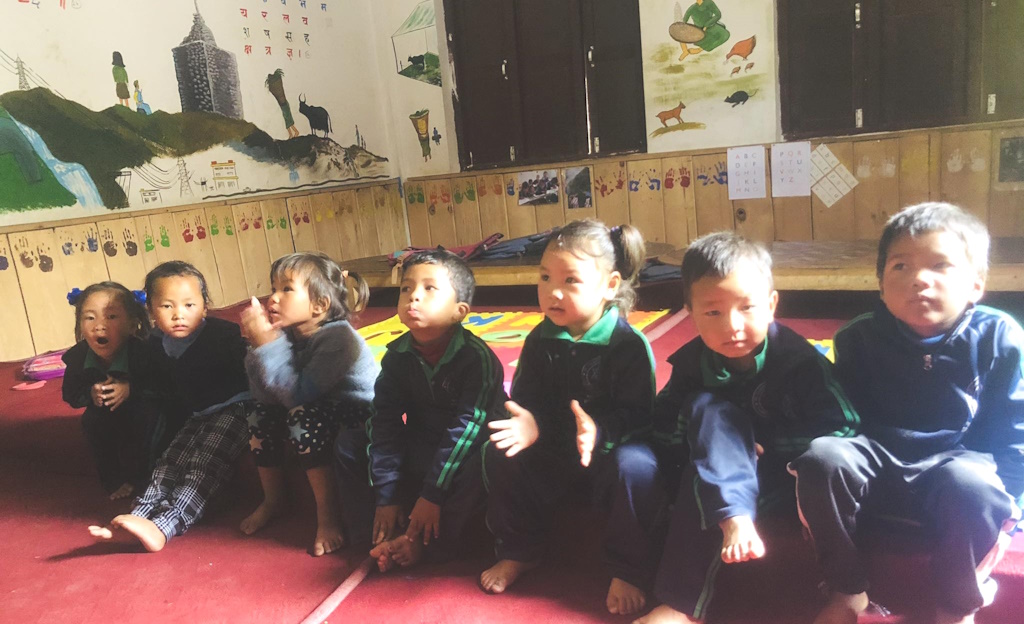
Schools have regularly asked us if we could help set up temporary hostels for these children. This way, they would stay near the school during the monsoon period and would still be able to attend classes.
As sorry as we are and as much as we would like to give these students a chance at education, we cannot respond. On the one hand, we do not have the resources to help; on the other, it is an ethical issue. We think it is better for the children to stay in their familiar surroundings with their parents.
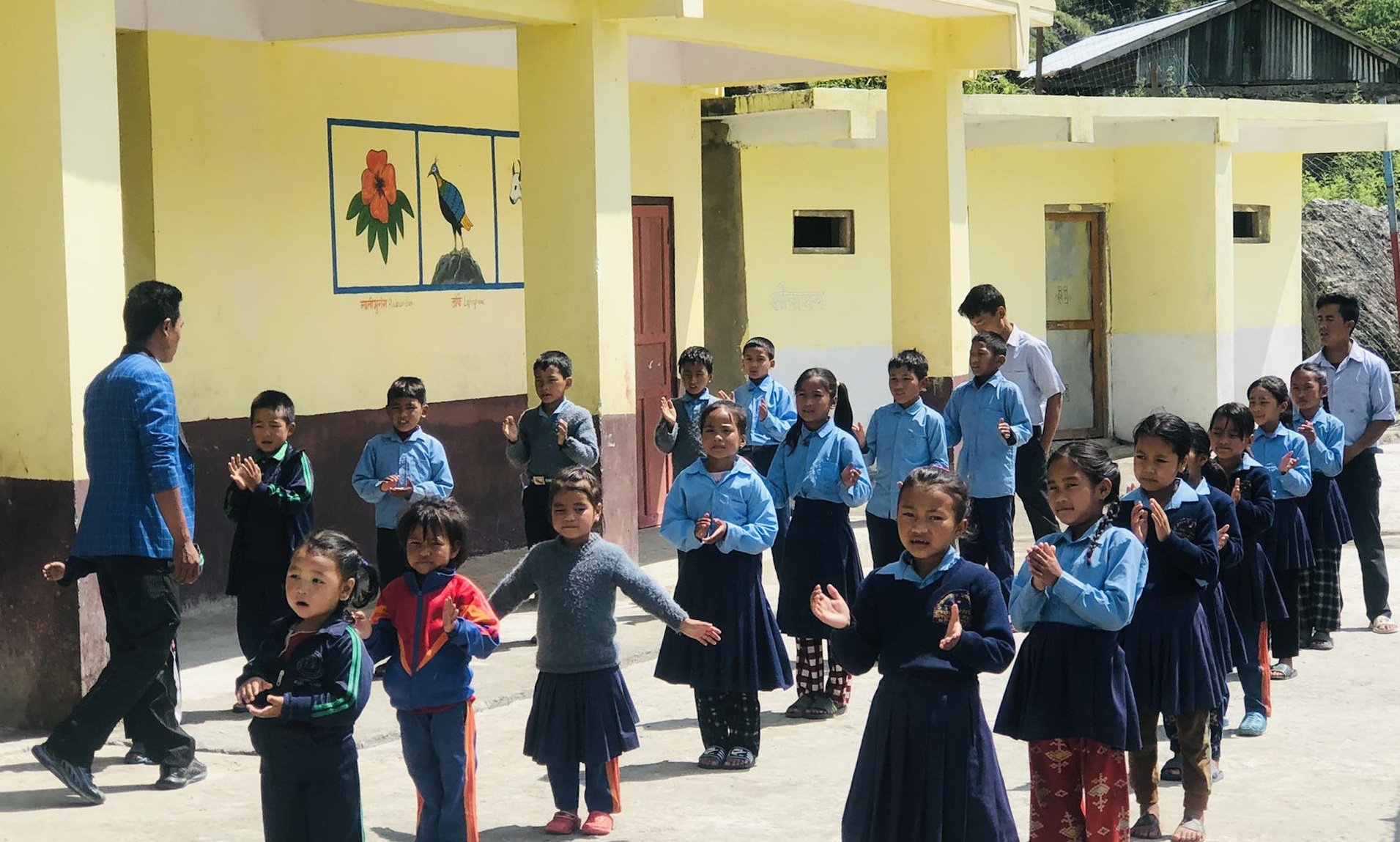
Since CEPP started the education project in the five Haku schools, we have seen parents becoming more and more involved in the schools’functioning. For the teachers and certainly for the headmasters, this is a major upheaval. We can understand the change is sometimes difficult for them.
Parents have become much more vocal, which is not always appreciated by teachers. If a teacher doesn't show up, the parents start asking what the reason is. They do not take it lightly that their children do not get a proper education.
The CEPP staff who have been in the Haku villages for more than a year and a half now sometimes get a hard time, mainly from the school heads.
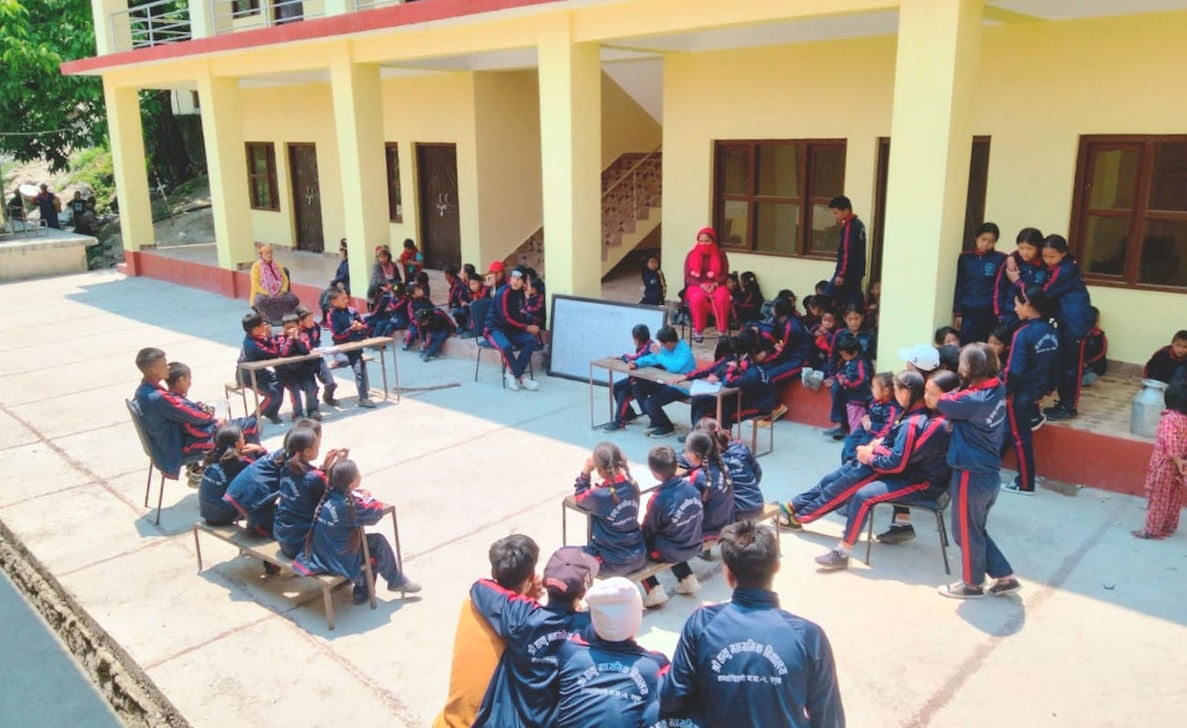
The challenge is now to work together for the sole purpose of striving to improve education.
Many of the teachers sat like kings on their high thrones and just did what they pleased. Now that there is more parental involvement, they need to get much more involved.
Change is always exciting, challenging and requires a lot of commitment and openness. It is searching together for a different way of dealing with pupils and with parents, a different way of teaching. Searching to work with natural and sustainable resources. We are curious to see how things will progress…
In turn, the green garden volunteers, parents of school children and other villagers are wildly enthusiastic about the cooperation with CEPP. They feel heard, supported and see that education and the cultivation of fruit and vegetables can also be done differently.
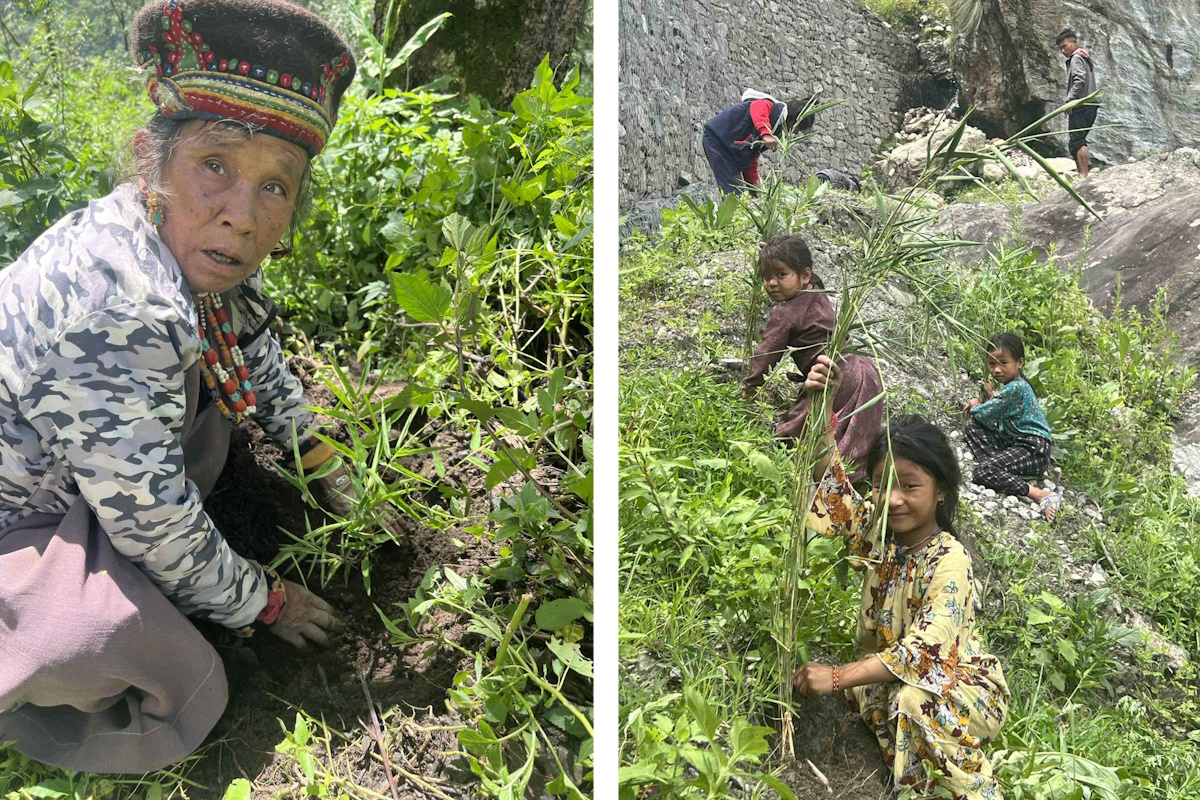
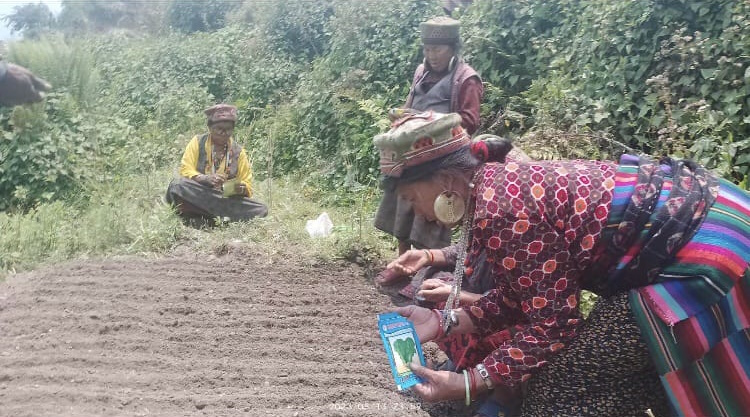
Meanwhile, we are busy organising an 'eye camp'.
Together with the French organisation Saint Chamond Espoir, we want to send a group of French opticians to the Haku villages in the autumn of 2024. Students from the five schools in the Haku community will then be able to undergo an eye test. Those who need it will be given glasses.
The villagers asked if we could also send an ophthalmologist along because many people have problems with their eyes. They cannot get to an ophthalmologist for proper diagnosis and treatment. Cataract operations are also in demand.
We are looking into what is possible because we have to follow the rules imposed by the Nepalese government.
Babu Lal Tamang, who helps us with several other projects and already organised an eye camp in the past, will help us now too.
He will contact a Nepalese ophthalmologist asking him to take action in the Haku villages as well. We hope it will be successful and affordable.
If we can set up an eye camp with both the ability to give glasses to young people who need them and to help the elderly who have poor eyesight with cataract surgery, this would be fantastic.
Even if the glasses come from neighbouring China, we should start preparations now. All sorts of evidence on paper is required and various approvals need to be obtained beforehand. We still have more than a year but we are already working on the applications and organisation.
If you want to help then your support is welcome on Bikas' account number BE32 2200 7878 0002 with reference to Haku.
Thank you - Dhanyabad
Betty Moureaux, president of Bikas npo

|
|
A new school year
May 2023
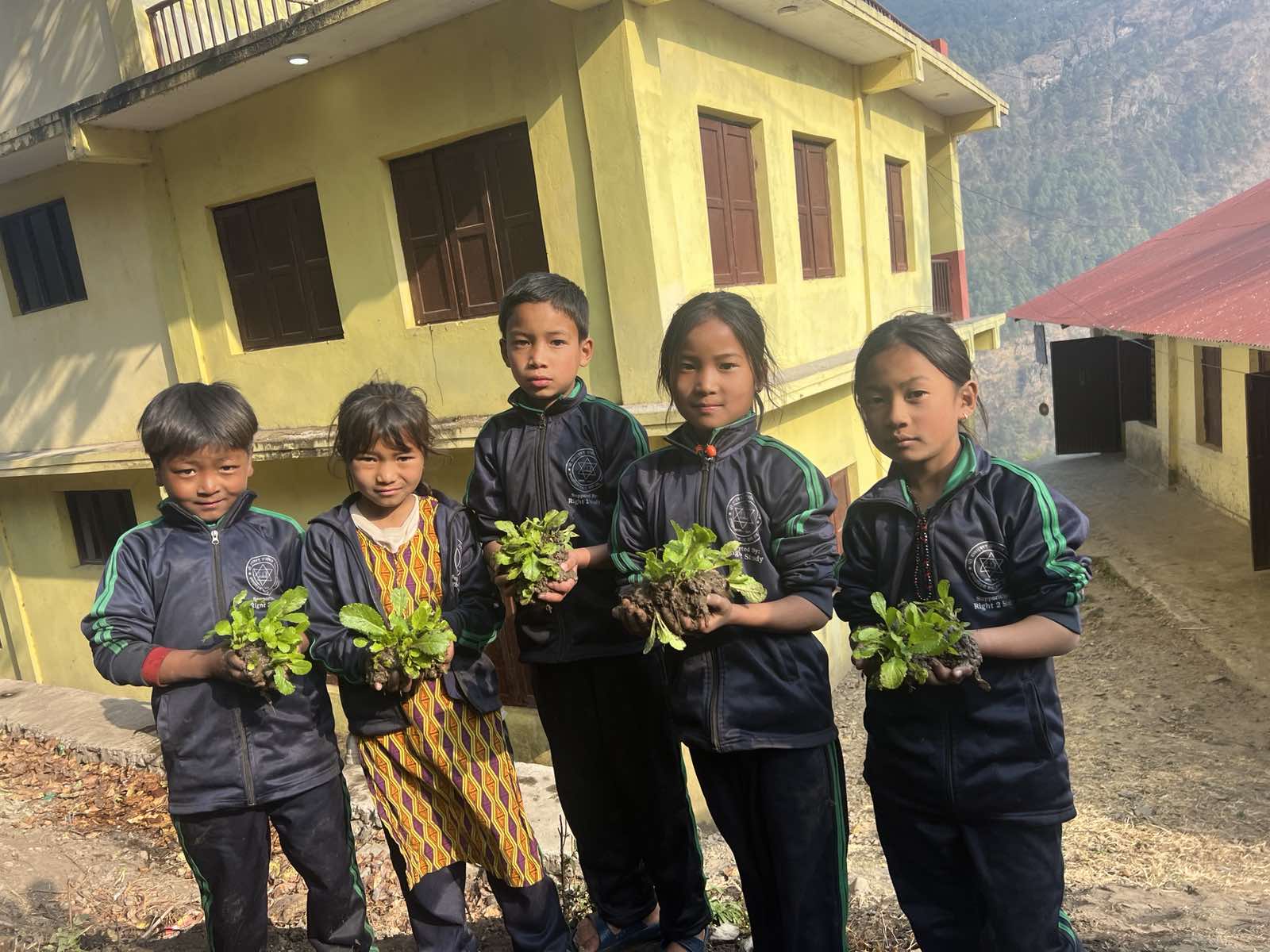
The old year came to an end and we welcome the new year 2080. The school year also came to a close. After the final exams came a short school holiday. Everyone was looking forward to a little rest. Teachers, many from other regions, returned to their families for a week.
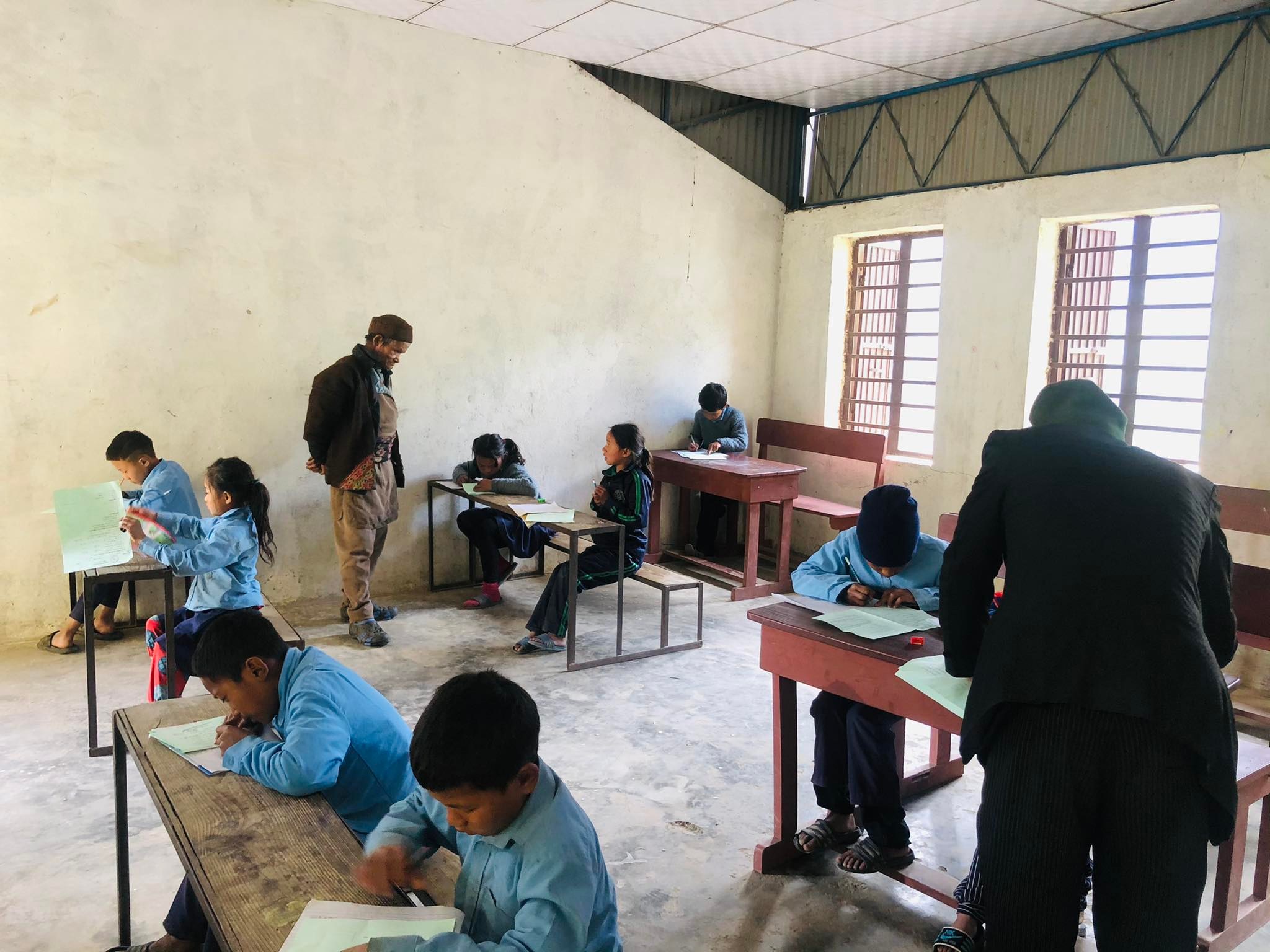
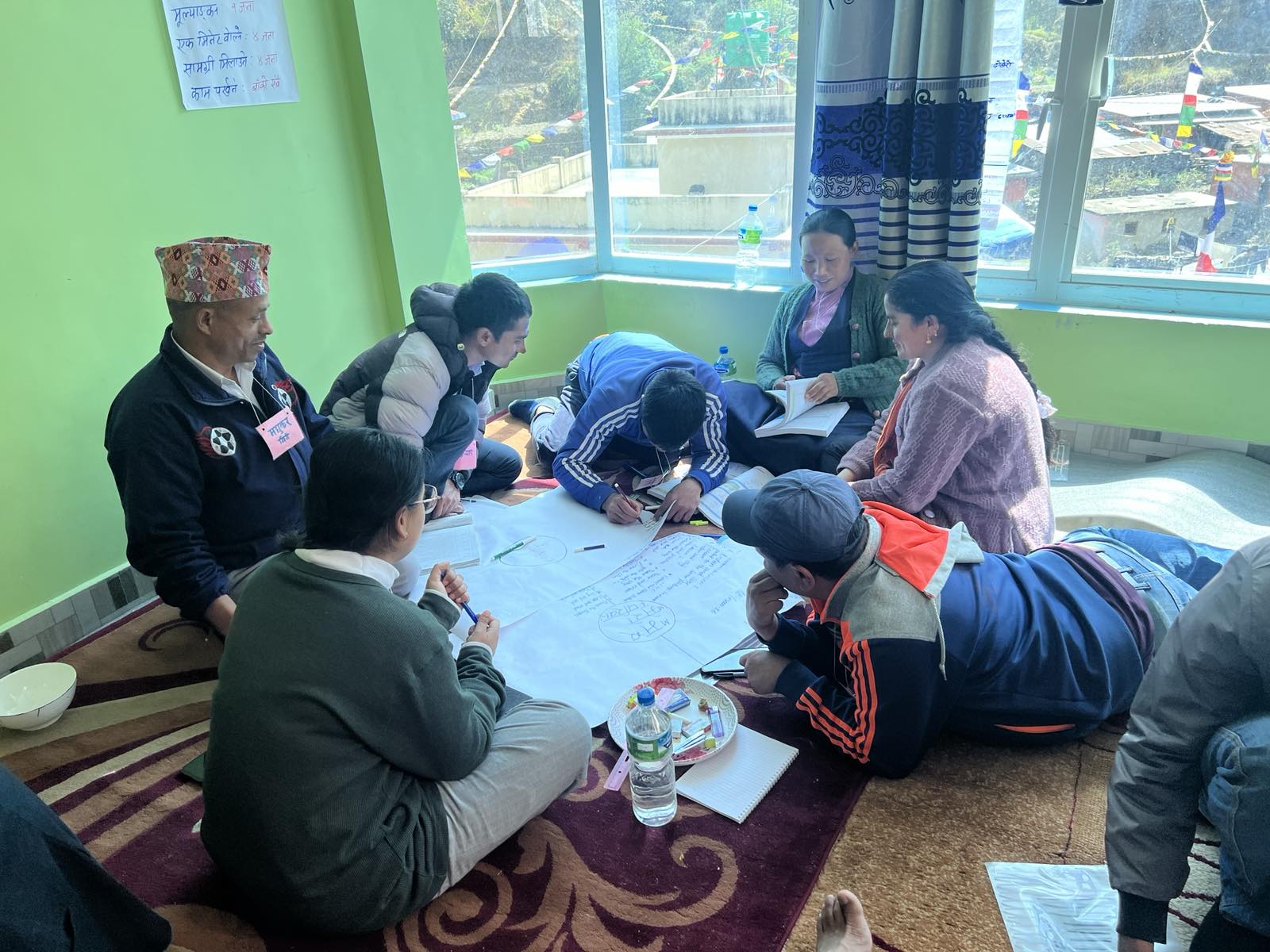
Arjun, the young employee of CEPP - Centre for Educational Policies and Practices - who lives in Thulo Haku, stayed in the village and looked after the vegetable gardens.
Bishnu also took a break but first she and other CEPP staff members gave another training session.
During exam periods, CEPP staff could not work in the schools. At the request of the local education officer, a workshop was organised for the surrounding 12 schools. A four-day training with 21 teachers was held in Chilime, the main town of the district.
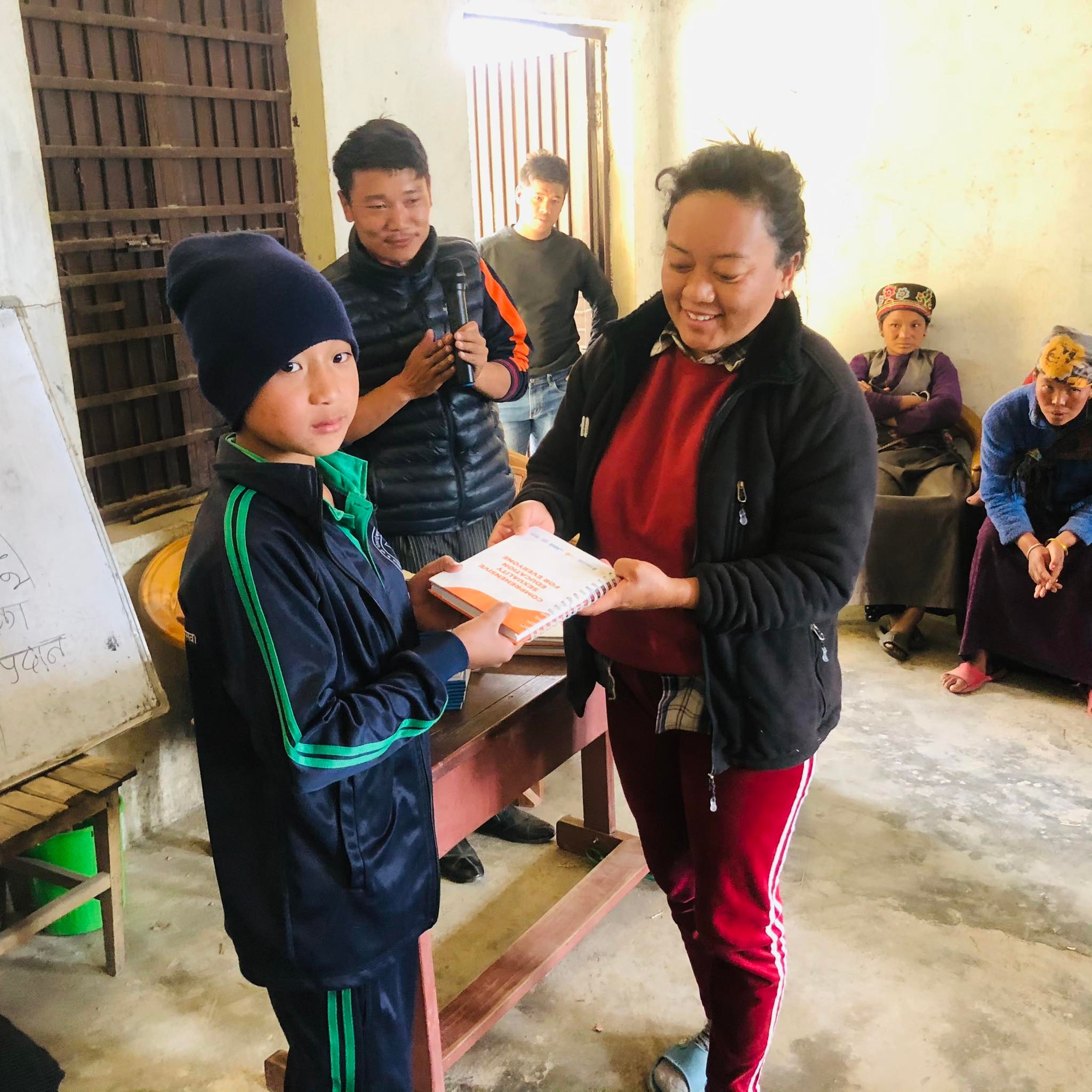
During the training, teachers interacted with each other on integrated teaching practices and tried out the possibilities.
The teachers made educational materials from local resources. They discussed how to teach interactively and make lessons more engaging.
They learned methods to improve the relationship between teachers and students in order to strengthen this bond.
The teachers who participated in this training were all very enthusiastic. According to them, this was the most valuable training they had ever received. They were already looking forward to putting the acquired knowledge into practice.
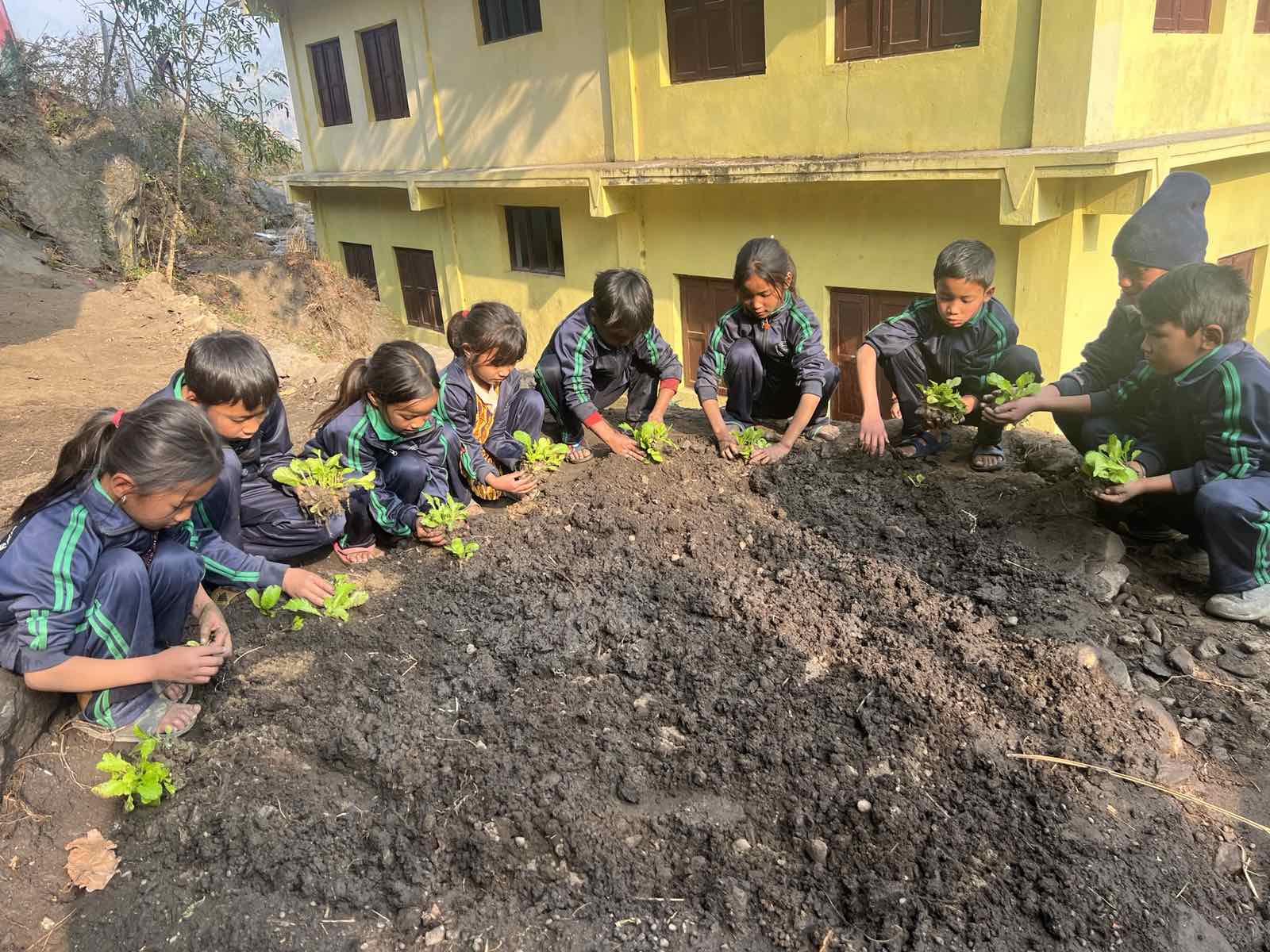
Meanwhile, the new school year has begun. Textbooks have been distributed, schools are filling up again and expectations are high. We look forward to what this school year will bring.
We wish the teachers an exciting year in which they can integrate new teaching methods. Also that there may be a pleasant, growing and positive cooperation between the schools on the one hand and with the students and their parents on the other. We wish the students the opportunity to gain knowledge in a safe and child-friendly school and to do so in their own familiar environment. Every child has a right to education but in remote areas, where children often have to work at home, this is not so obvious.
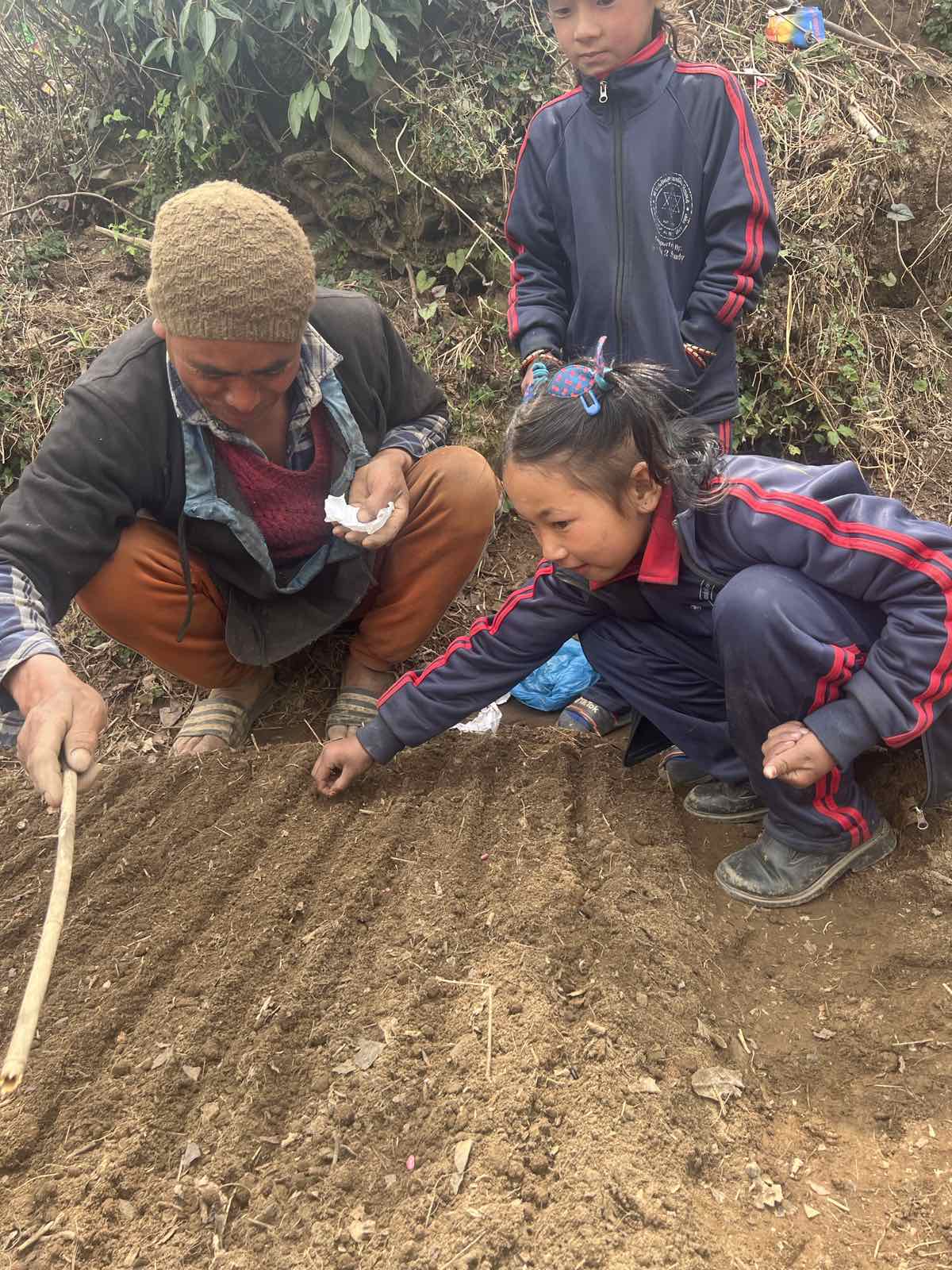
A new school year will also bring unprecedented challenges. CEPP will again do its utmost to help the schools of the five Haku villages in their growth and development. CEPP staff will again go from house to house to support and encourage parents to actively follow up their children in their schooling. Teachers will again be given training and encouraged to give their best.
Bikas is very happy to work together with CEPP to ensure a better future for hundreds of children from this region.
If you want to help then your support is welcome on Bikas' account number BE32 2200 7878 0002 with reference to Haku.
Thank you - Dhanyabad
Betty Moureaux, president of Bikas npo

Inauguration of the school and operation of CEPP
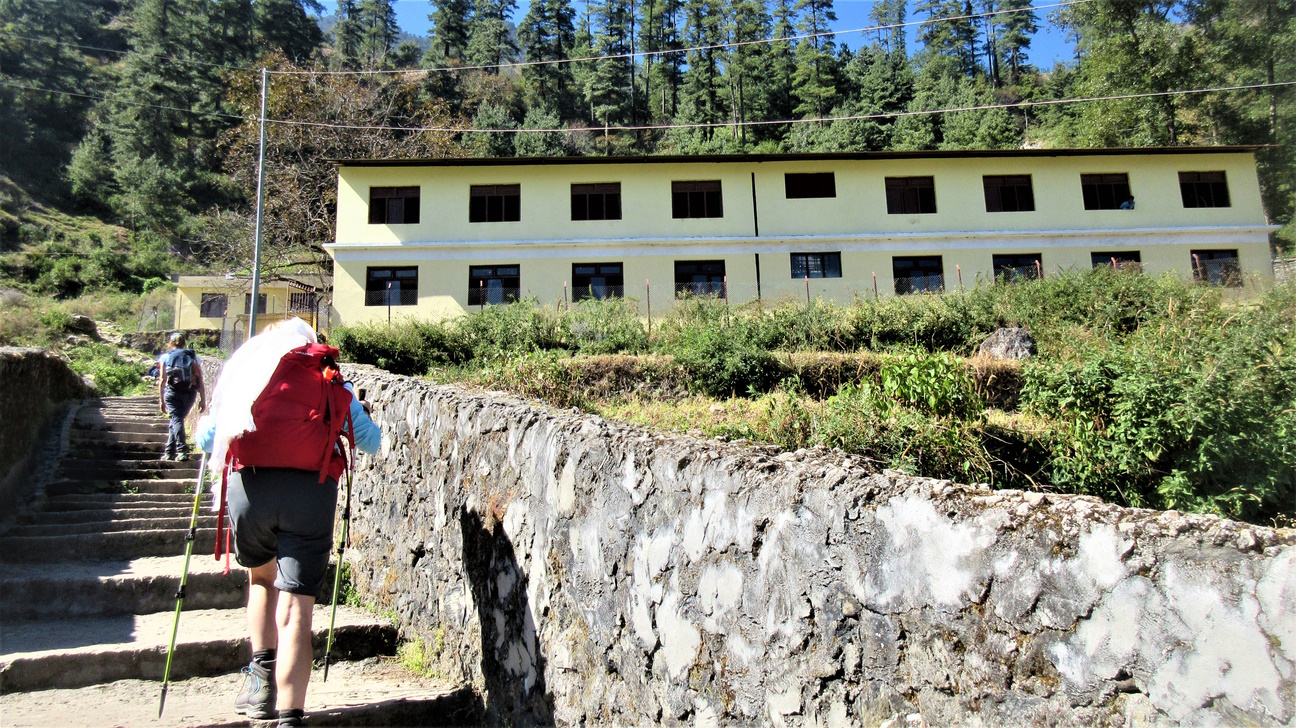
February 2023
On 2 November 2022, it was celebration time in Thulo Haku. The new school, two storeys high and eight classrooms big, was finally inaugurated.
Bikas worked with the local government to make sure the school building was there. During the major earthquake of 2015, this school had been completely destroyed. Seven years later, a new and sturdy building finally stands.
The students, teachers and also the parents who helped with the construction were now proud to show off their new school.
As president of Bikas and project leader of the Haku project, I was very well received along with a group of sponsors/ travellers from Anders Reizen. Our webmaster Omer D'Hondt was also present .
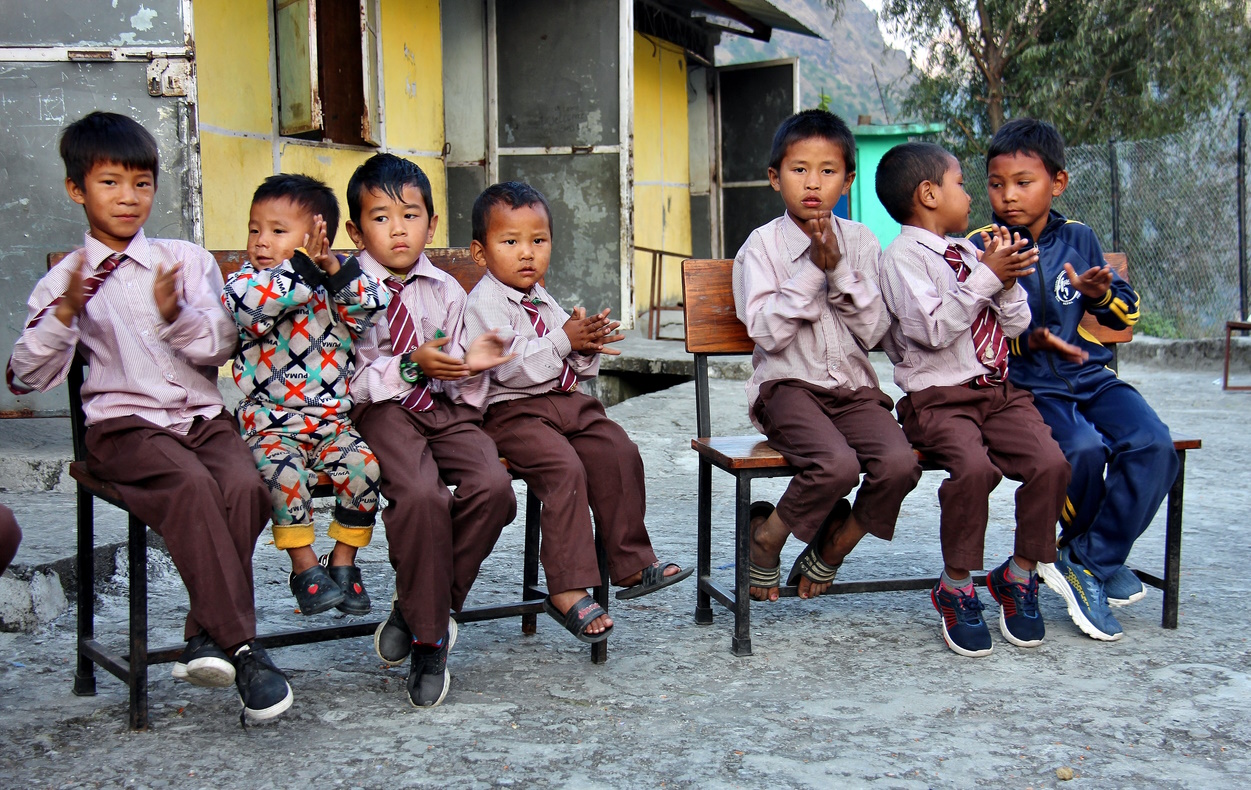
A hellish bus ride took us from Kathmandu to Haku Besi where we were met by Tamang friends. Here our trek began and half an hour later we were met at Haku Besi school by the headmaster, students and parents. We were offered drinks and khatas, the traditional prayer shawls, were hung around our necks.
We were allowed to sit on the school benches we had sponsored while children sang and danced for us.
I was ushered away to see the school furniture donated by Bikas.
The colourful round tables we had commissioned for the little ones, blackboards, computer tables and projector were displayed with pride.
Everything turned out to be very useful.
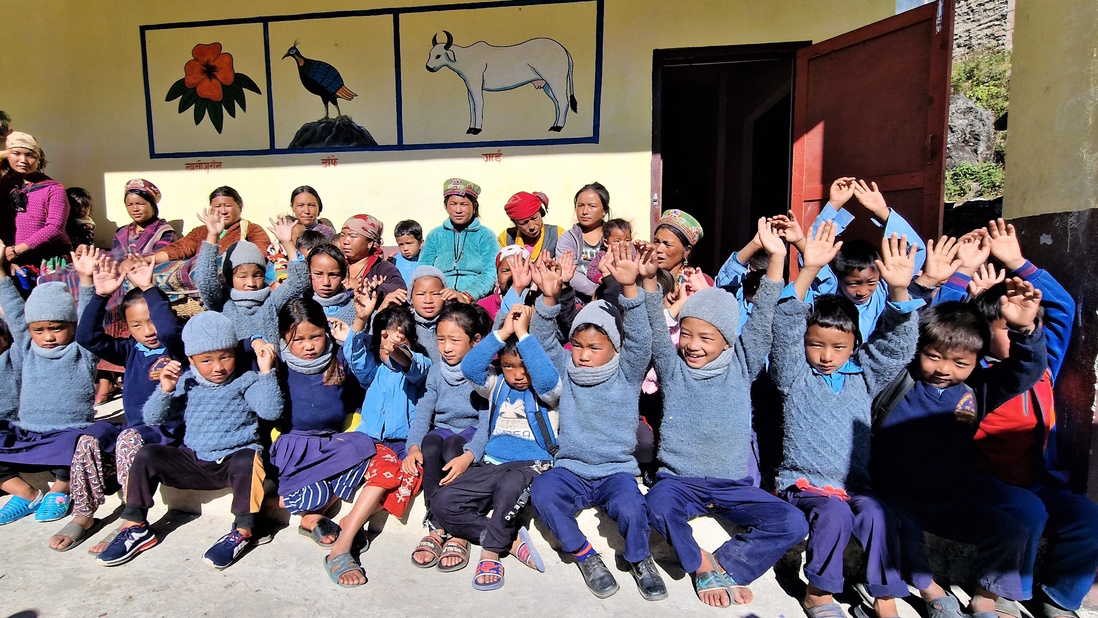
After the ceremony, we continued on our way and just before dark, we reached Pangling, Sanu Haku.
Here too, we were welcomed by the headmaster and by the staff of CEPP - the Centre for Educational Policies and Practices.
Michel Rai had come specially from Kathmandu to use a powerpoint to explain to us what CEPP stands for and how they work. In every school in the four villages, they want to make at least one classroom child-friendly and educational. Classrooms are transformed into a cosy space where both teachers and children enjoy spending time.
Meanwhile, three classrooms have been furnished. One by one, they have become model classrooms.
Wooden boards with carpets on top provide a dust-free and warm floor.
With the addition of some cushion, the youngest children find it pleasant to be there. But what stands out the most are the beautiful, colourful and educational painted walls.
Students from Kathmandu's Art Academy and a painter from nearby Dhunche have painted fragments of daily life, the human body, animals, mountains, fruits, vegetables and the alphabet on them, among other things. Rightly, they were very proud to display these beautiful classrooms.
The next morning, we were led through their beautiful experimental garden by the other CEPP staff, Ram Chandra, Bishnu and Arjun. We saw a passionate Ram Chandra who knowledgeably presented his Garden of Eden. The locals learned how to grow both known and new types of fruits and vegetables.
We saw onions, beans, carrots, coriander... but also kiwis and papayas.
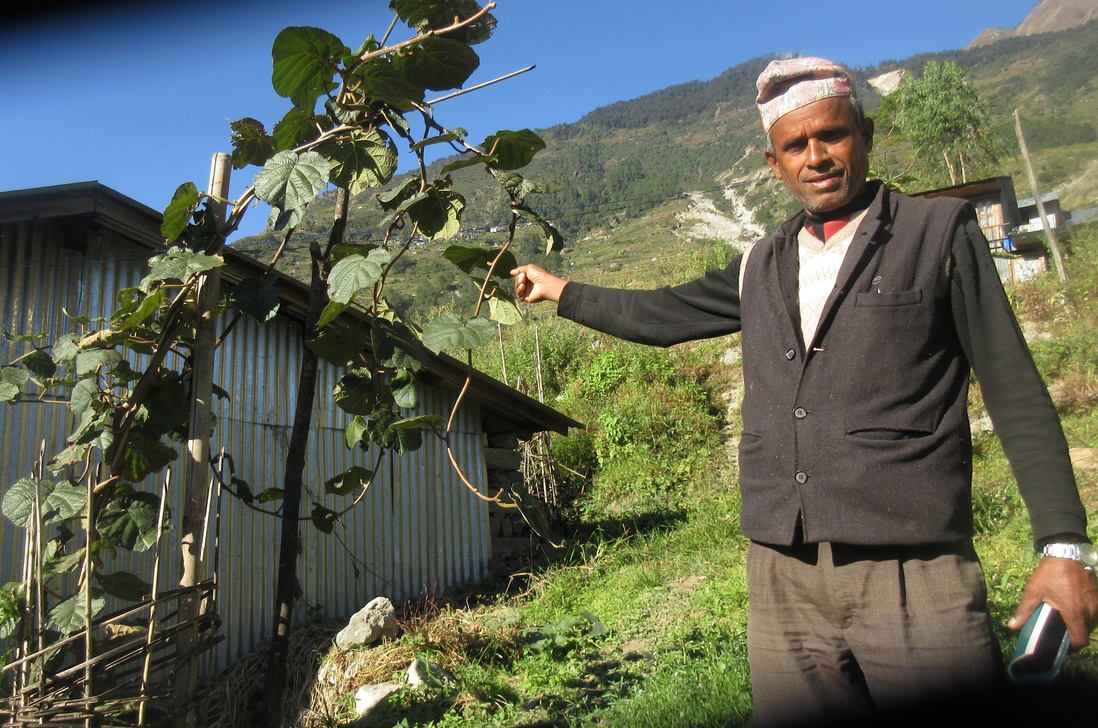
Thanks to the varied supply, the villagers' diet is now enriched with delicious, fresh and home-grown vegetables and fruits packed with vitamins.
A volunteer couple has been assigned to each experimental field to learn a lot under the watchful eye of Ram Chandra. In turn, they pass on this knowledge to the other villagers. The enthusiasm shown by Ram Chandra is clearly contagious. Almost every household now has its own vegetable garden.
The location of the experimental plots near the schools creates an exchange of information. The students follow along with the processes of the nurseries. They are taught in the experimental fields, help with cultivation, see everything grow and, when the time is right, they harvest and taste what they have sown themselves.
| Celebrations at Thulo Haku |
And then the day of the inauguration of the new school building finally arrived. Due to the corona pandemic, the construction and inauguration had been pushed back by three years.
Meanwhile, the main village square had filled up with spectators. The students of the school but also many people from the village community were present.
People had made a gateway above which hung a banner with the Nepali and Belgian flags on it. Tamang women and men in traditional costumes were waiting for us. For the occasion, I had also put on a Tamang dress with accompanying handmade hat.
The Belgians and one Dutchman from our group were given the places of honour alongside some prominent members of the village and school community. Traditionally, speeches, thanks, khatas, traditional dances and drinks followed.
The whole event was a vote of thanks by the school and village community to the people who made it possible to realise this project.
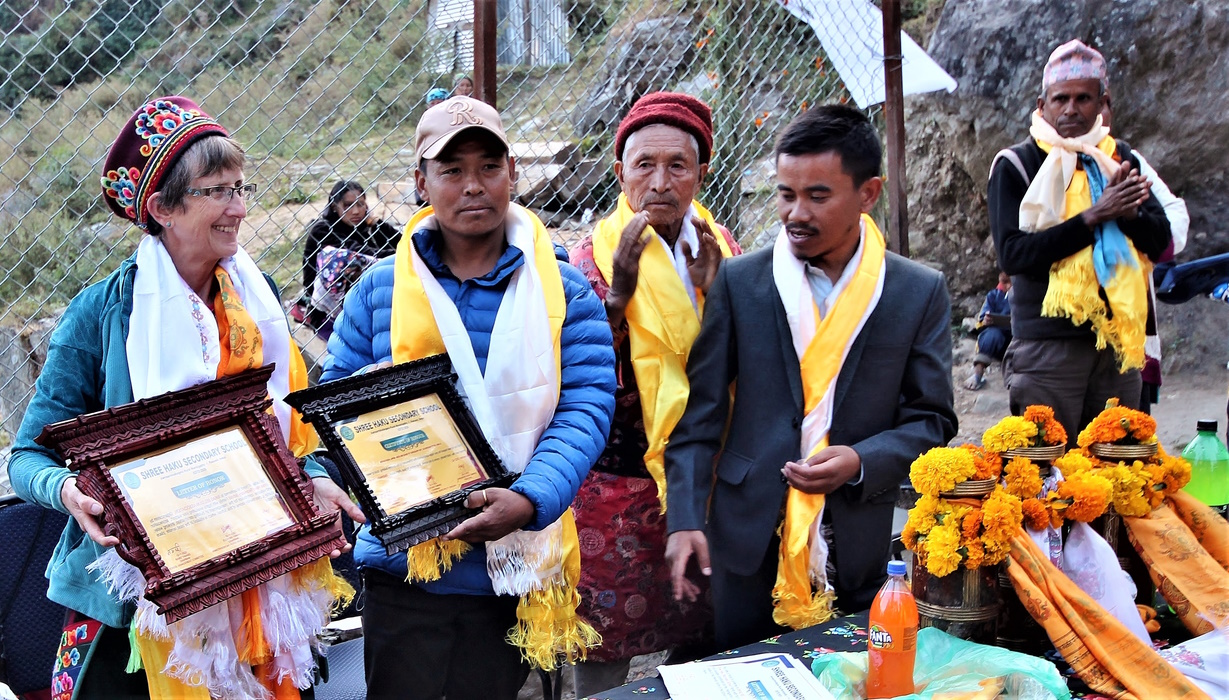
Spread the word they said ... thank you to everyone who supported.
The school is handed over to the school community who are in charge of its management. An official inauguration plaque is hung on the school building.
After many pictures and many happy faces, the day draws to a close.
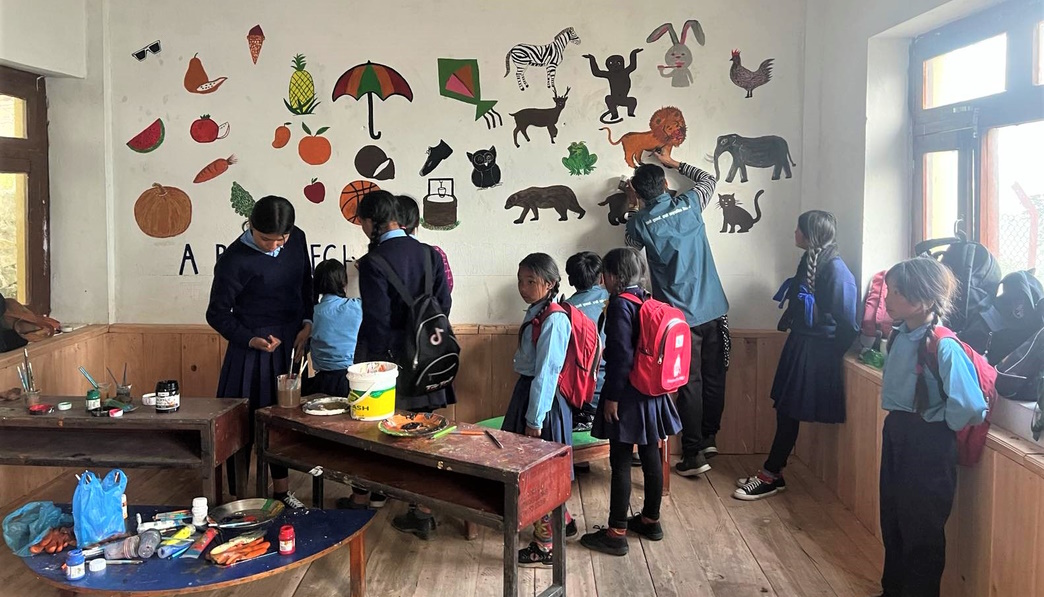
It is encouraging to see what has already been achieved at Haku.
The building process is behind us and now we are concentrating on the content of education.
Together with CEPP staff, work is now underway to improve primary education in a safe, friendly and child-centred environment. Gradually, an awareness of the importance of sound education in one's own environment is emerging.
Where previously little or no attention was paid to the youngest children, people are now realising that a good foundation is also very important in education.
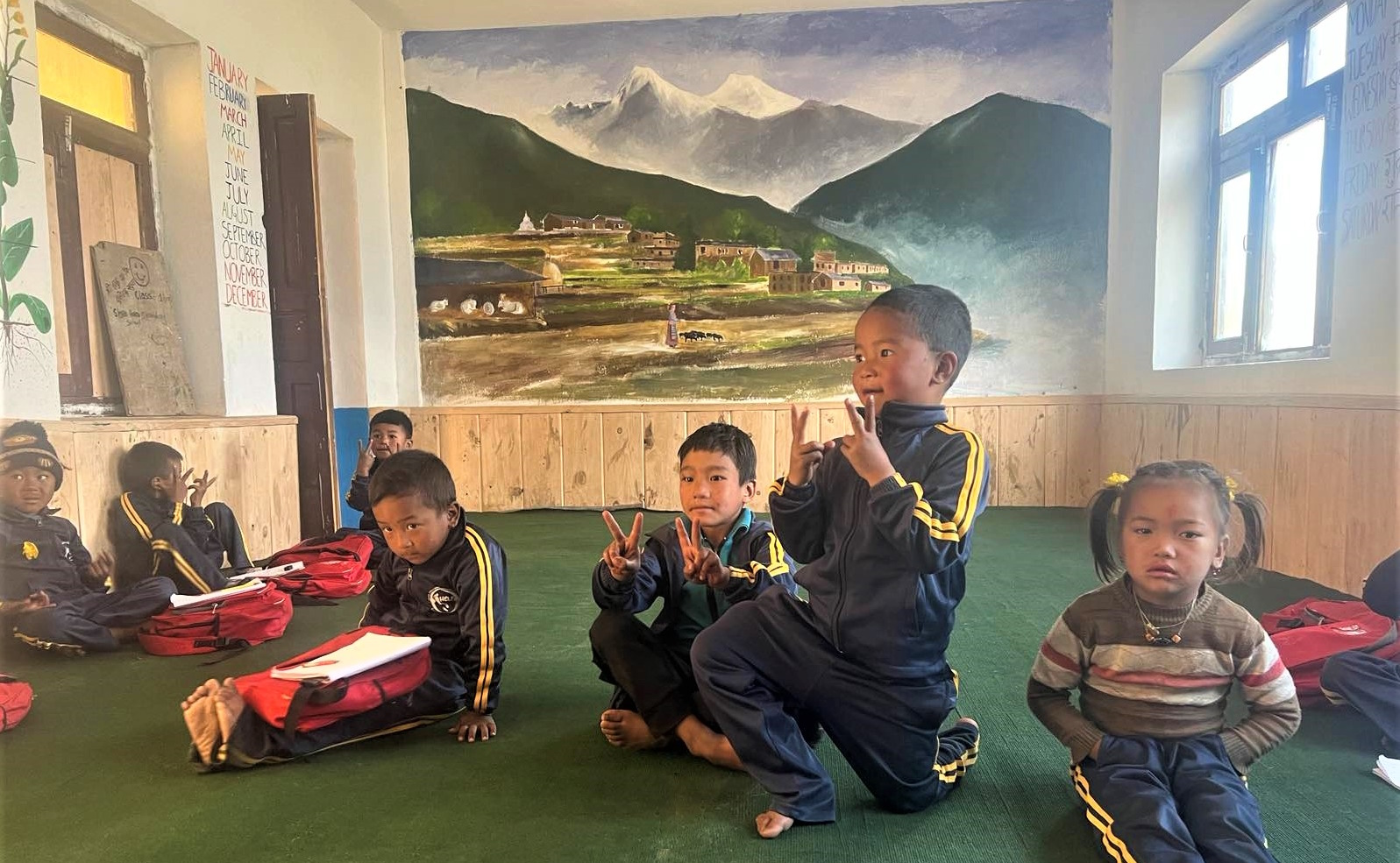
A clear growth process is underway. They learn a lot while playing. Attention is paid to better hygiene, classrooms and playgrounds are maintained, access paths are regularly cleaned up, improved agricultural methods are taught, landslide problems are tackled and environmental responsibility is sought.
A very important innovation is the involvement of parents in their children's schooling. Parental control and pressure on schools is something new. Parents are encouraged to supervise their children's education. They take turns attending school one day a week. They motivate their children to attend school and encourage the teachers. If parents follow up on a school project then one can get a lot done.
I could see with my own eyes that there are immense changes in the Haku villages.
Sometimes it is difficult but still they have come a long way.
Starting this year, the neighbouring village of Grey and its school will also be involved in this project. Grey belongs to the Haku village community. They had already asked to be involved at the start but this was not granted at the time, partly for financial reasons.
Obviously, costs are rising, especially now that everything is getting more expensive. Still, we think this project that is very valuable and sustainable deserves our support.
When we see what has already been realised in the Haku villages, we look forward to the future with hope.
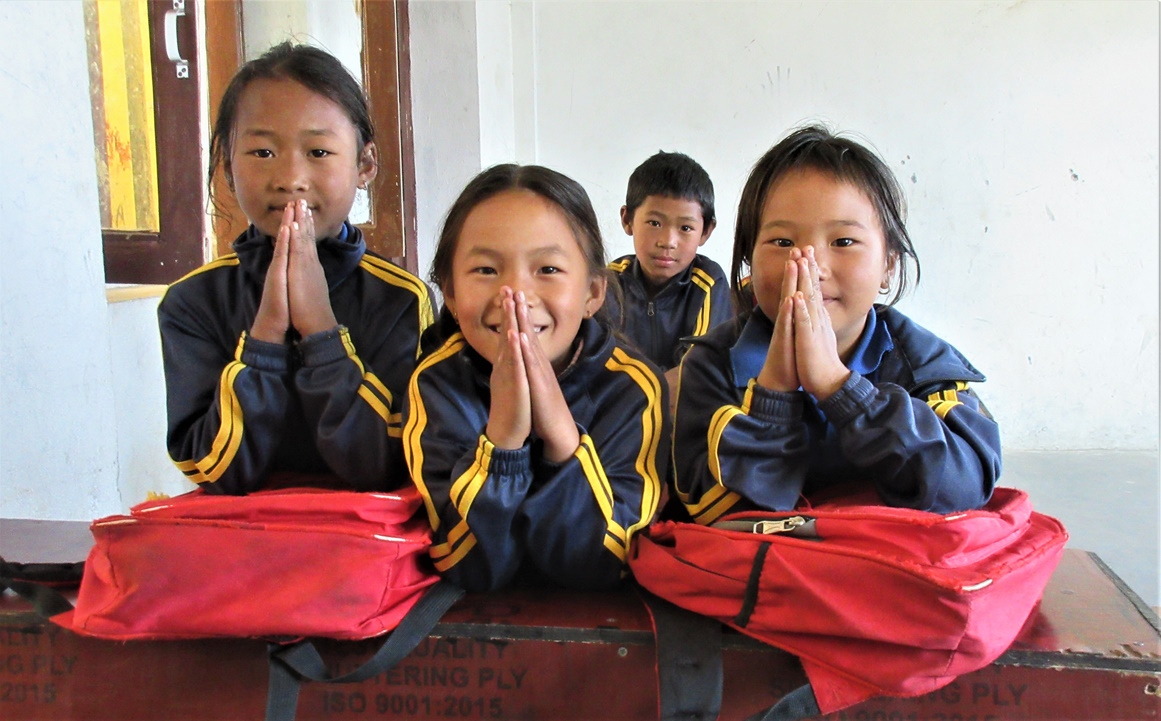
If you want to help then your support is welcome on Bikas' account number BE32 2200 7878 0002 with reference to Haku.
Thank you - dhanyabad
Betty Moureaux, president of Bikas npo

November 2022
It has been a long time coming but this autumn, the moment is finally there. The inauguration of Thulo Haku school is scheduled for early November.
In the presence of a group of tourists from Anders Reizen, the school will be officially inaugurated and handed over to the school community. From now on, this group will own and manage the new building. They will have to take care of the school that was built in cooperation with the local government and with the help of the many villagers.
The eight-classroom building came about at the request of the community. The previous school was completely destroyed by the major earthquake in 2015. Students were temporarily taught by soldiers who had never been in front of a classroom before. The period after the earthquake was still traumatic for many children; the immense fear of a repeat of a disaster like this one lingered for a long time.
Nevertheless, teaching was restarted as soon as possible so that the children did not wander around the villages aimlessly. A few months after the earthquake, with the help of many sponsors, we were able to temporarily install school barracks. Slowly the desire and hope grew to build decent permanent and above all safe schools.
We started with schools in Nessing and later in Sanu Haku (Pangling). Finally, it was also the turn of Thulo Haku. In both Nessing and Sanu Haku, we built two classrooms. In Thulo Haku it became eight classrooms whose construction was spread over three years. The laying of the foundation stone was in autumn 2019. At that time, we still thought everything would be ready in 2020 and we would do the opening ceremony then. Unfortunately, the global corona pandemic delayed the whole process and so it became impossible to finish the school before 2021. In the meantime, a request had come up to build a floor on top of the four classrooms. So it finally became early 2022 before the school was completely finished.
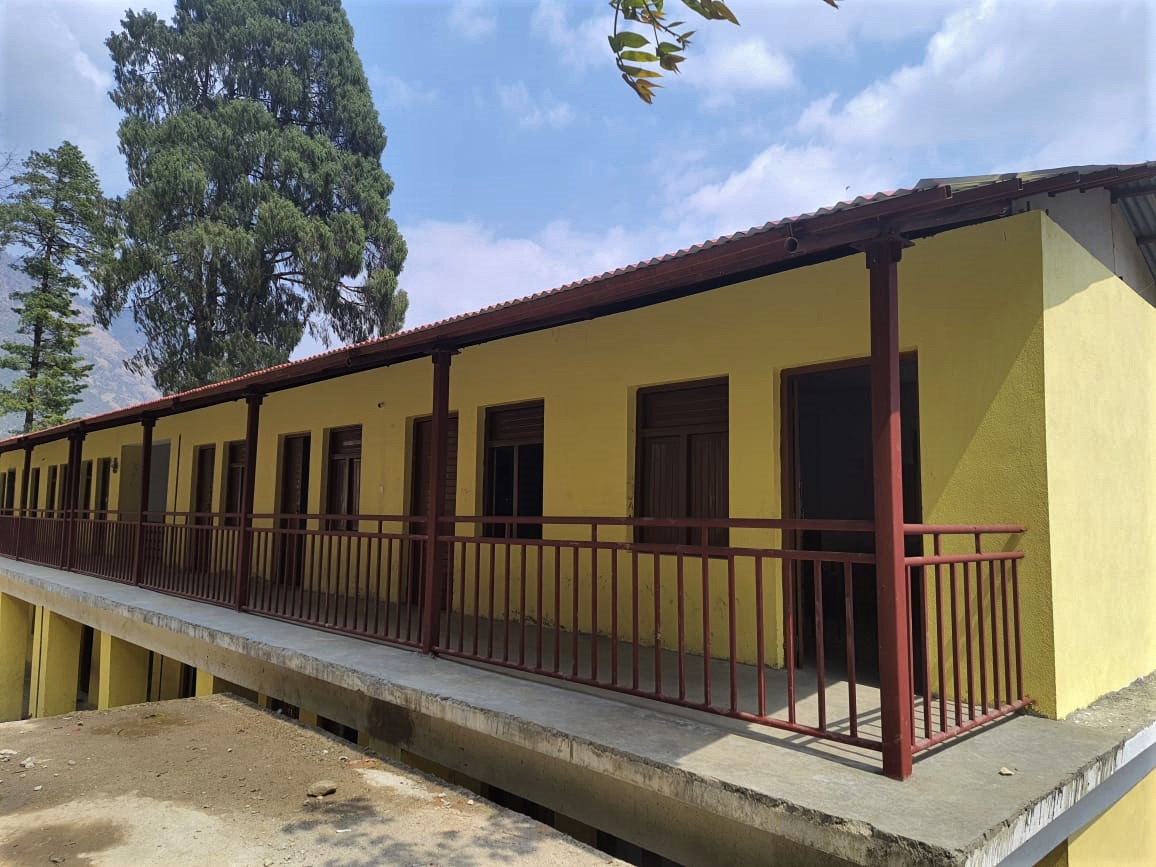
Throughout the construction period, no one from Bikas had been on site and we had had to content ourselves with photos and videos received through social media. Despite the fact that we were not physically present, we were still able to follow the evolution. It was impressive to see how people could realise such great works with simple means. People worked very hard to get everything on site and build the school.
After the school building was there, an extra fence was built. An additional water project now provides the school with potable water. The necessary school desks were also made. Thus, they gradually refined the building and its surroundings.
After years of commitment to the construction and everything related to that process, we started supporting the teachers and the actual teaching at the beginning of this year. Together with our local partner CEPP - Centre for Educational Policies and Practices - a change was slowly brought about. The importance of sound education in the nearby environment was now highlighted.
Teachers learned how to teach by using simple means. The relationship between parents and teachers and students improved tremendously in just a few months. Motivation and eagerness to learn ensured that the number of children attending school gradually increased. We see a beautiful educational growth process, but there is still a long way to go.
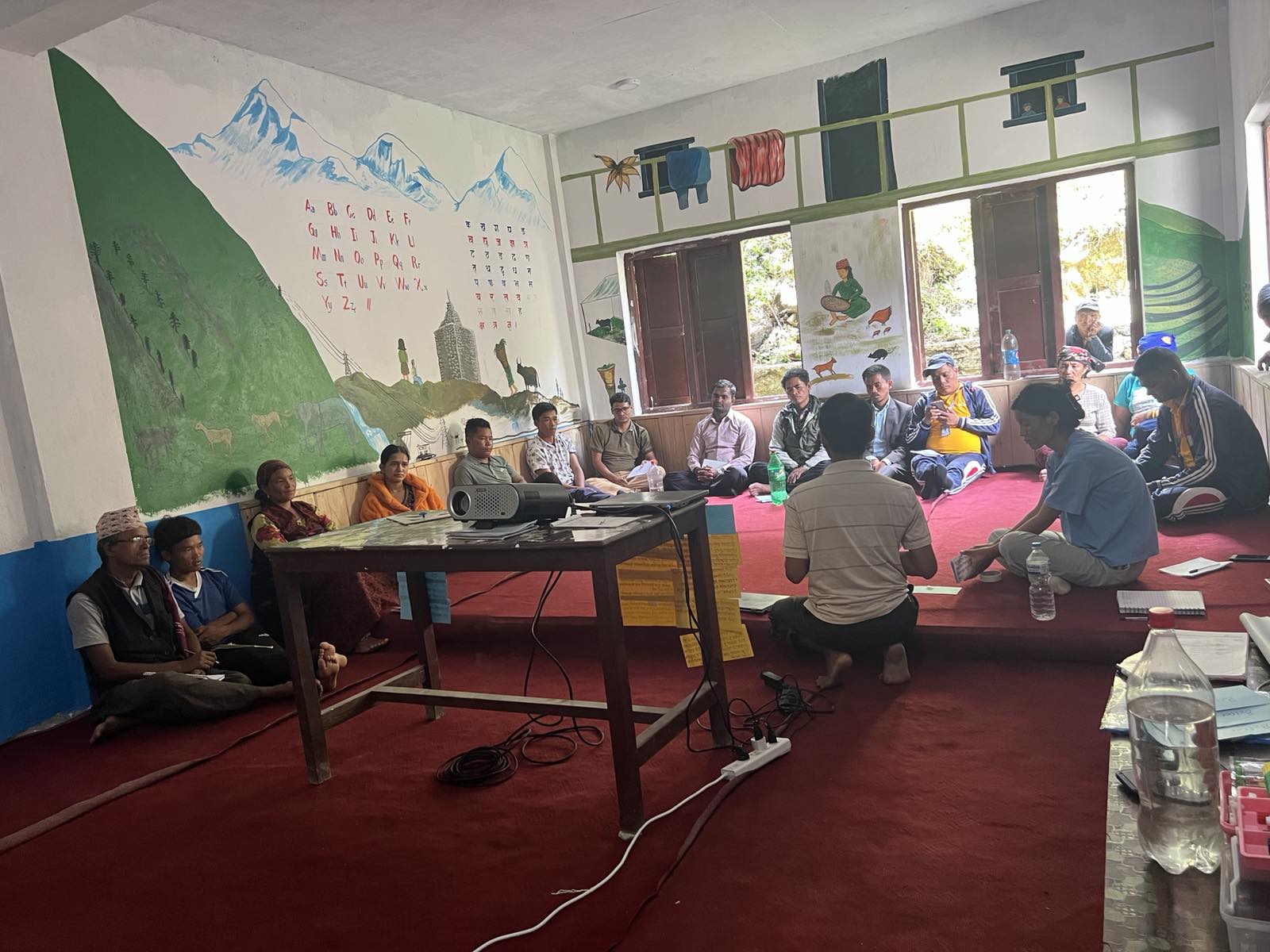
As before in Pangling, CEPP is now furnishing a classroom in Thulo Haku so that people can teach there in a clean, pleasant space. A nice classroom encourages not only teachers but also students to come to school and encourages users to improve the other classrooms as well. We are therefore very excited to be able to visit this finished classroom.
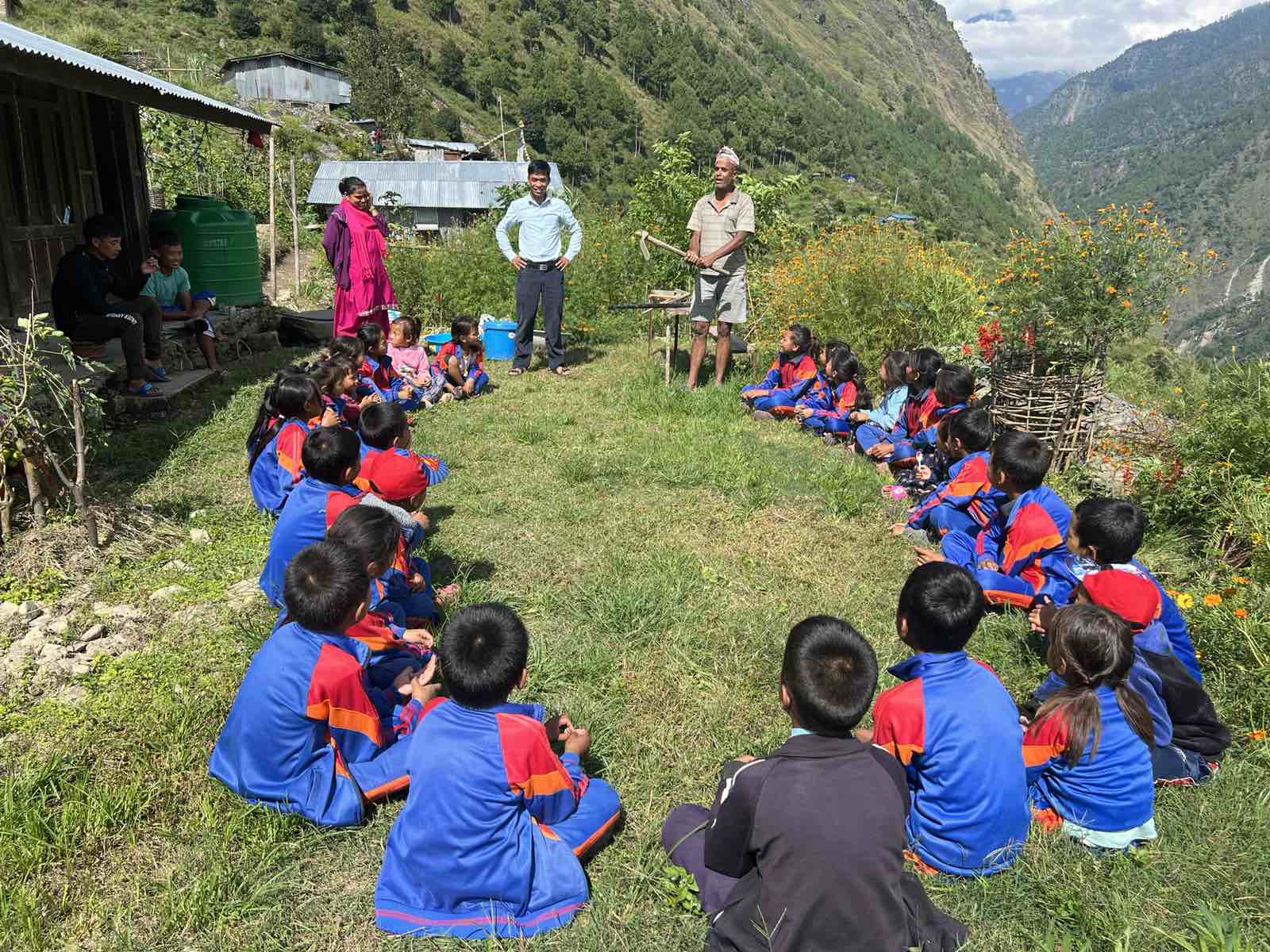
Meanwhile, Bishnu and Ram Chandra, the two CEPP staff in Haku, have again moved mountains. There were consultation moments with the parents of the students in the four villages of Haku. One worked with the students on nature conservation, there were trainings on hygiene, a thorough clean-up was done around the schools but also in the villages and on and around the paths and roads leading to them. From house to house they went to talk to people about education, hygiene, nature conservation, etc. Every time, I am amazed that two people can change so much in a village community that was otherwise not interested in any change. Big congratulations to CEPP. I am already looking forward to meeting these two collaborators in Haku and seeing their work with my own eyes.
By the time the magazine is published, the school in Thulo Haku will have been inaugurated. We are already trying to add some photos now. Next time, you can read how this all went. After three years, I am finally returning to Nepal...how long this has taken! I am very curious to see with my own eyes all that has changed in these three years in the Haku villages. It will be a happy reunion...exciting!
Those who want to support the Haku villages can make a contribution to Bikas' account number BE32 2200 7878 0002 with the mention 'Haku'.
Thank you, dhanyabad
Betty Moureaux, chairwoman of BIKAS asbl

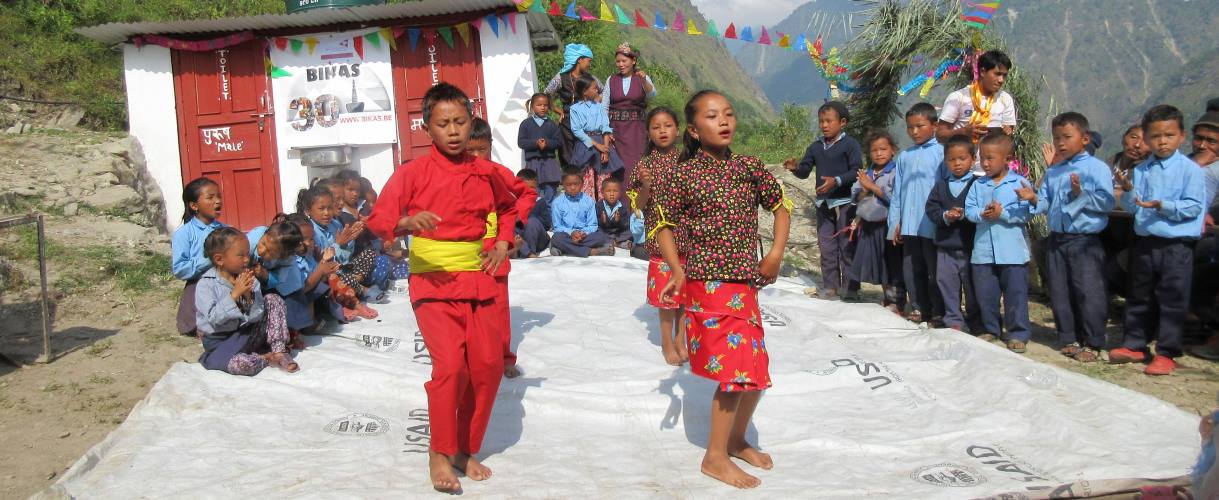
October 2018
There was a party in Haku on September 30th and October 1st!
The schools that we built with Bikas in Sano Haku and in Nesing were inaugurated. Among those present were our president, Betty Moureaux and our webmaster, Omer D'Hondt. The representative of the local government, the regional school inspectorate and of course all teachers and pupils were also present. Local people who helped building the school were there als...
| The feast in Sano Haku |
This was a festive event where local people showed their respect and satisfaction to BIKAS. And as is custom in Nepal, first the Nepal national anthem was played, followed by various speeches. Thanksgiving frames were handed out, dances were performed, the ribbon was cut and the inauguration board was officially bared. The keys of the schools were handed over to the main teachers. The responsibility for the follow-up now lies with the school community. The school with associated toilets is now officially opened and the children are now being taught in a new and safe school building. Thank you very much to everyone who helped to build these schools. The children of Nesing and Sano Haku will be grateful to you forever. We wish the kids a lot of learning pleasure.
| The feast in Nesing |
In the meantime, a request has come to help with the school furniture and the school boards. Negotiations have also begun to start construction of a large school in the large Haku. Here are more than 150 children who have long been asking for a new, solid school. Unfortunately Bikas can not do this alone.
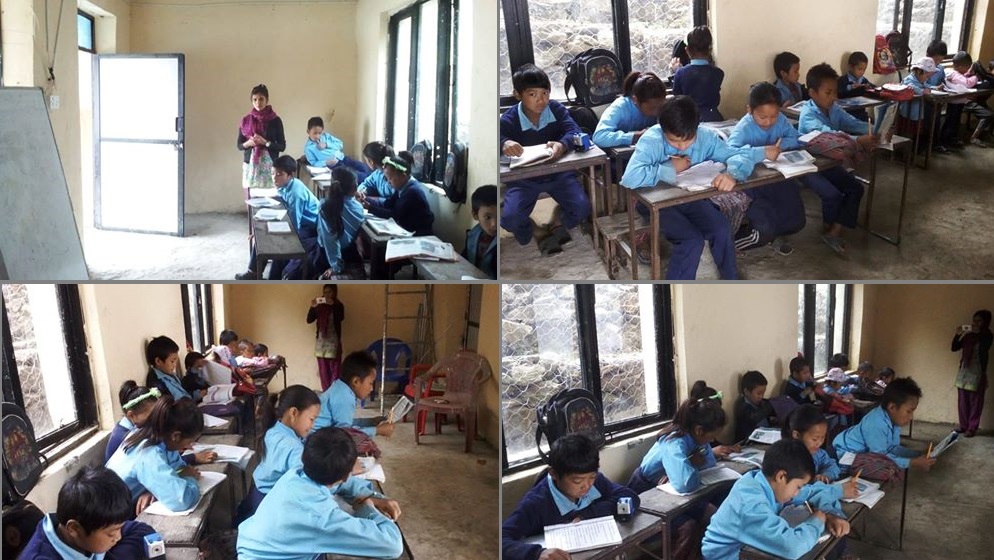 |
| Pupils at work in the new school in Nesing. |
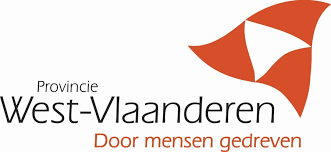 |
| Many thanks to the province of West-Flanders for sponsoring the project in Sano Haku. |

